![]()
Download Podcast:
"The Heavenly Part"
He cried in the wilderness:
Leave off your lives of carnal pleasure!
Walk away from the poisonous fog that you breathe!
Be cleansed of pollution, and return to Eden!
And in the end he spoke most forcefully after he was thought to be silenced,
after his head had been removed from his body.
The stage had been most carefully set: the man fragrant of Paradise set against the stench of a drunken orgy; the man of gracious words set against reckless living and rash oaths; the man of purity set against filthy desire; the peerless friend of God set against the murderers of God's Son.
He was condemned for condemning. Yet he was not the prosecutor. For in the sight of God, the prosecutor is always ourselves. And our purity and faithfulness is always already our moment-by-moment choice.
God encounters each of us. And, in the end, we are both prosecutor and defense. It is a never-ending contest as our angels and our demons do our bidding, act on the basis of our desires, and are victorious only through our alliance.
And it is never about only us. Yes, within ourselves we are little worlds, but our connection to the wider world and influence upon it must never be underestimated. Ultimately, God speaks to the world through every one of us. This is a drama that has gathered such strength and moment that we find ourselves on the brink of world war. As with kings and vassal kings, the choices of our souls and the inclinations of our minds are never individual but touch the whole lifeworld around us.
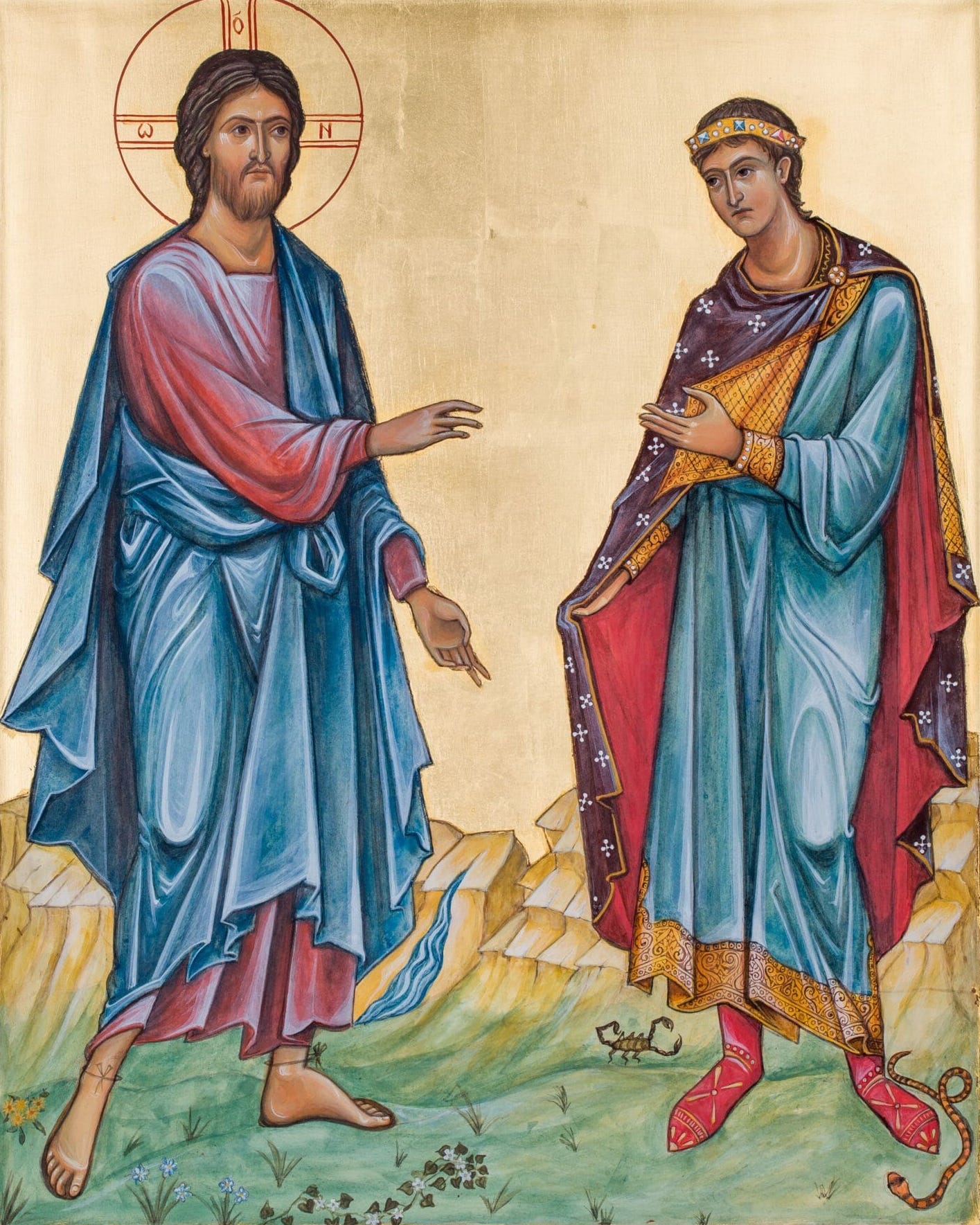
Download Podcast:
"Everything"
In this morning's Gospel lesson,
the Lord Jesus instructs a wealthy man to give away everything he has to the poor
if he truly desires eternal life with God.
The Disciples are shocked
—
the Greek verb suggests astounded, astonished
—
to hear Jesus say that a camel could sooner pass through the eye of a needle
than
a rich man might enter the Kingdom of Heaven.
Jesus instructs this man to burn down his whole world!
And people do.
St. Peter declares,
"Look! We have given up everything in order to follow you!" (Mt 19:27).
And for the next twenty centuries, people continue to give up everything
in order to follow this most intriguing man.
But what is it that brings people to this burning point? More precisely, what happens in the minds and souls of those who come when Jesus says, "Come!" And then go when Jesus says, "Go! I send you!"
Two weeks ago, we followed Jesus up to a high summit beholding His Transfiguration. Today, we consider another kind of transfiguration, a most personal one. What is it that continues to bring people to this astonishing threshold — where they willingly and gladly give up a whole world and life they knew in order to follow this man from Nazareth?
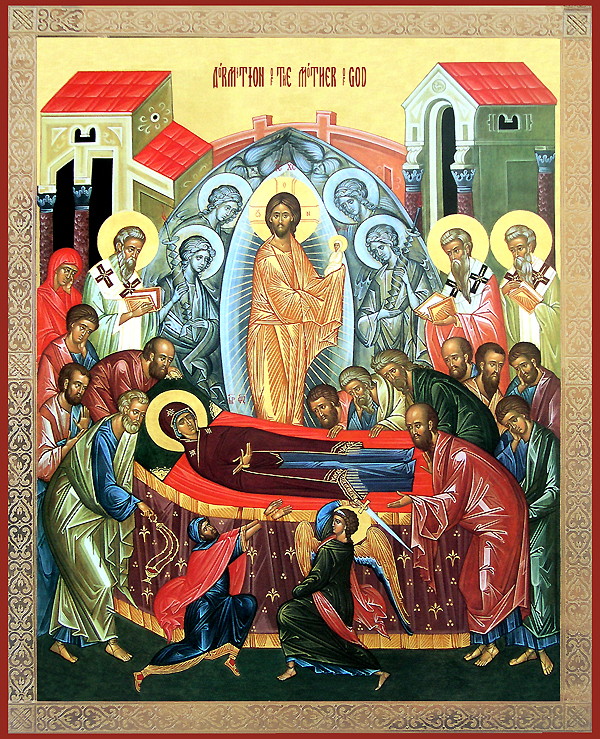
Download Podcast:
"Deathless Death"
From the foundations of the world, all men who rise above the debris of life
seek a worthy cause,
one they would die for.
The heart of the woman is different.
All women who rise above the debris of life seek a cause to which they can be absolutely faithful.
Our Holy Gospels reveal the two great exemplars of this heroic life:
the Crucified One
and
His Most Faithful Mother.
They are the pattern for all humankind, created to attain theosis
—
to embrace our Divinity, permitting our earthly part to drop away as unworthless debris.
But why did these Divine heroes have to die? Because only in death can the human person truly be known — known to ourselves and known by God. The heart of man is famously restless. The mind of man entertains many thoughts. Only the good cut a steady path through life's tumultuous seas. But "'For the wicked,' saith the Lord, 'there is no peace,'" (Isa 48:2). Only in death have we passed through the trying fires. Only in death can we finally be said to be true, .... or false. For at the last, our chronic unsteadiness will crystalize into a brilliant and imperishable steadiness. Our changeable minds will become changeless. We will no longer linger in the lukewarm. For we must be hot or cold, godly or ungodly, good or evil (Rev 3:16).
As we draw near to the end of the Church Year, these are our solemn learnings. One week ago, we learned of human Transfiguration. Today, we learn of human Truth.

Download Podcast:
"Good Fruit"
No sooner do we descend from a display of Only-reality, Only-truth, Only-stablity
upon the Mount of Transfiguration,
than
a most basic lesson is laid before us.
Lancing the boil of our self-told lies and fantasies,
Jesus cures us from the fatal spiritual disease of delusion.
A thornbush cannot bring forth grapes.
A thistle cannot bring forth figs.
Our imagination will not save us.
And then He reveals a truth that will be crucial to our salvation. He mentions the lawless who have prophesied rightly, who have exorcised demons, and who have done wonders. And we realize that every goat at the End Time had been a sheep .... many times had been. Every demon had been an angel. And we must not fall into the deadly trance of imagining our own goodness. We must not daydream of days when we were pure and white, who felt the reassuring staff of the Shepherd, failing to recognize the lineaments of the goats we are morphing into.
The work of seeing ourselves as we truly are is notoriously difficult, even intractable in many cases. Only in knowing God through prayer, in knowing our angels through on-going conversation, and in following the Master do we begin to see ourselves truly. And we remember that St. Paul's word, which we translate transformation does not contemplate something new, but rather the restoration of the original. For our origin is God.
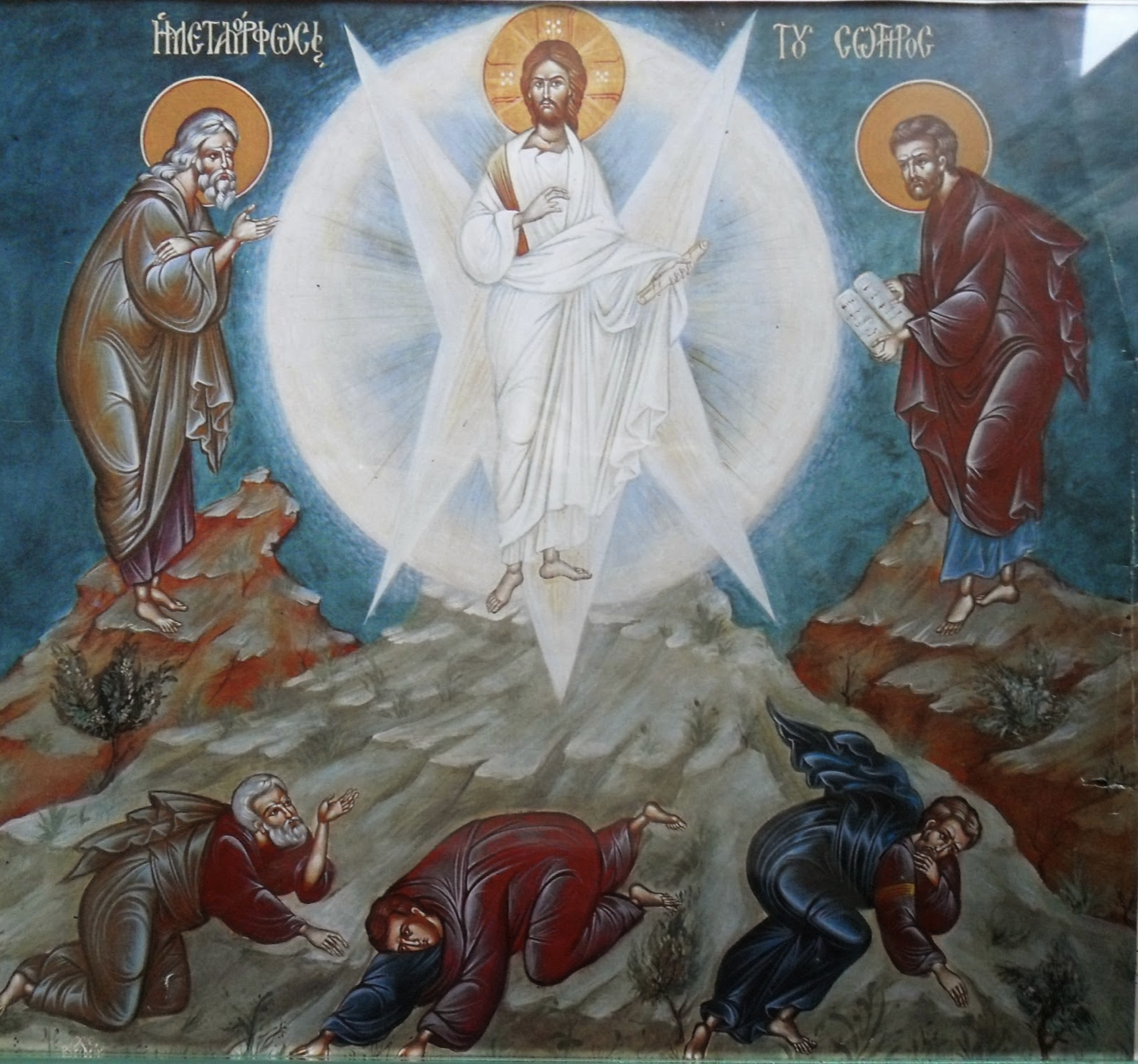
Download Podcast:
"This Is My Beloved Son"
In recent weeks we have meditated on transformation, which turns out to be
not a becoming someone new but rather a reclaiming of original identity.
Our guide,
as the adopted children of God,
is the First-born of Creation (Col 1:15),
our Elder Brother,
the Son of God.
As with the rest of Creation,
which is patterned after Him,
we live in a fluid situation
—
sometimes godly, even godlike, and sometimes not.
The human lifeworld is in flux as it ascends upward toward His Divine Image
or,
(sadly)
descends down into our animal humanity.
This is our milieu. This is the stuff from which we are made. The question is always identity: "Which are we?" "Who are we?"
On the eve of ascending a nearby mountaintop, Jesus seats His Disciples before a foremost center of pagan worship: the Grotto of Pan and the Temple of Augustus Caesar. As they stare at these centers of power in the background, He asks, "Who do you say that I Am?"
He will answer this question straightaway. The next day (or week?), Jesus and three Disciples begin the difficult trek up Mount Hermon, shading ever upward into the Kingdom of God, nearly 10,000 ft. in elevation. Here the world falls far, far away. All life on earth has vanished. Everything is white. And here they meet with the Father. It will be in these rarified, unearthly climes where Jesus reveals His (and our) identity. Upon all, the Father sets His seal. And forever after we live in new certainty, which is our ancient and original certainty. Surely, this is the Only-begotten Son of God. Here is All Authority on earth as it is in Heaven. And from here we leave hearing the booming imprimatur of the Father: "Listen to Him!"
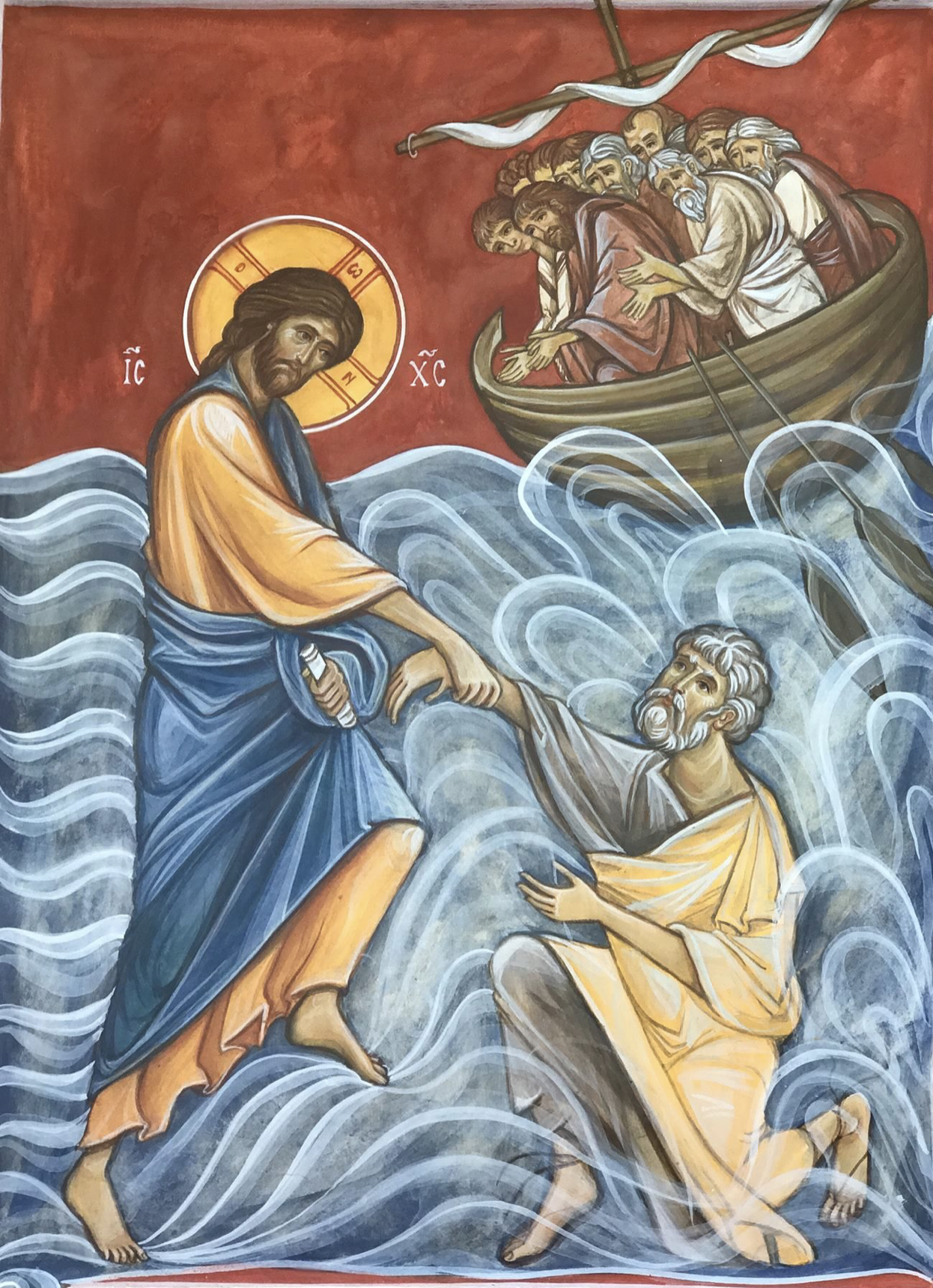
Download Podcast:
"The Way of the Cross"
The Kingdom of God is a non-geographical land in exile.
Its discontinuous borders are visible in our love of God
and
in the bonds of love we share amongst each other.
We are strangers in a strange land (Exod 2:22).
Here we have no abiding city (Heb 13:14).
We participate in
"the glory which [the Son] had with [the Father] before the world was" (Jn 17:5).
Yet we are not arrived to our Heavenly home,
at-One with the Son as He and the Father are One.
Meantime, this glory is already within us. We were created from it and were endowed with it. With this power we master the world rather than being mastered by it. This is the significance of walking firmly on the unruly sea. We have power to walk on this sea, else Jesus would not have invited Peter to do so (and he did). We have power to exorcise and to banish demons and to heal sicknesses (Mk 3:15), else Jesus would not enjoined us to do so. He has made a place for us in the Father's Kingdom; if this were not so, He would have told us (Jn 14:2). He invites us to master our lesser, earth-bound thoughts and lives. He invites us to understand that the world is not our destination but rather a journey in which we must constantly move on and ever upward. He has created us to have dominion over the world (Gen 1:26ff), for this is our essence — evincing a high dignity before the very powers that would diminish us and shame us and ultimately rob us of our Heavenly inheritance.
The Cross is our unfailing compass guiding us through the world. It belongs to each of us, the Master says. We must embrace it, and on it we must crucify our lesser selves.
Let us reflect on this way through the world, a way that treads on water, on adders, and indeed on all that lies outside the borders of Heaven's Kingdom.

Download Podcast:
"O Lord, Have Mercy"
What is prayer?
Surely,
Almighty God does not need our prayers.
Mysteriously,
He sets great store by them.
As we consider Righteous Anna, Mother of the Most Holy Theotokos, can we not say that the redemption of mankind and the renovation of the world began with the humble prayers of an elderly woman? Yes, surely a mystery.
As so many modern hymns suggest or a poem depicting footprints in the sand proposes, it turns out that spiritual life is not a passive thing. Spiritual life does not consist in unending petitions and then waiting to see what we get. Certainly, it is hazardous to view the Last Judgment in this same passive spirit.
Spiritual life is an offering of oneself, an emptying of oneself, a "being filled" with the Presence of God seeking His will in all things. Such as these are the cornerstones of Heaven's Kingdom. Who has ears to hear, let them hear! But listen with care, for one so filled with Heavenly graces, to him more will be given. And from one so devoid of God's Presence, even what he thought he had will be taken from him.
As we consider the end of a holy life lived in earnest with God, let us say, "She was a woman of prayer. She was the one who prayed."
Pray for us Righteous Anna, Most Holy Mother of the Most Holy Mother of God!
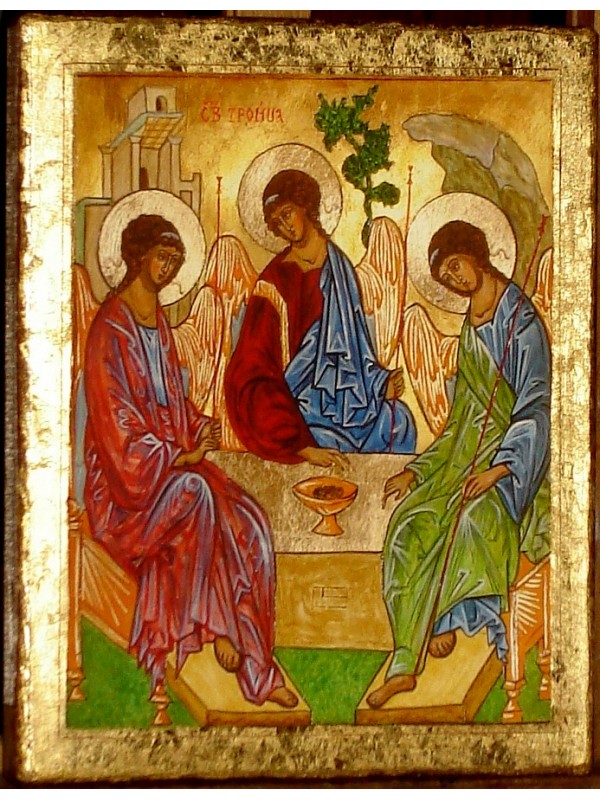
Our Lady of the Angels Hermitage posted a reflection Saturday commemorating the Fathers of the First Six Councils. This meditation considered the vocation of "Fatherhood," rooting all in the culmination of Christian life, which is to be One with the Father even as Jesus and His Father are One (the Gospel text for Sunday: John 17:1ff). Our readers have rightly called to mind the 1667 Synod of Moscow, which forbade all depictions of the Father as an icon. This Synod taught that the Son is the once-for-all, irreplaceable icon of the Father. To venture any other hypostatic depiction of the Father would be to blemish this perfection. Our text is "He who has seen Me has seen the Father" (Jn 14:9). Not wishing to offend, much less to bring scandal on the Hermitage, we have deleted this posting. We, of course, receive the Synod's teaching with gratitude. Surely, it sheds Divine light.
The subject is not uncomplicated. St. Andrei Rublev presented the world with a cherished icon of the Holy Trinity, depicted as angels. For that matter, "the bodiless powers" appear in countless troparia of the Orthodox Church. They are pure nous, inexpressible, without material form. Yet it is the rare Orthodox temple that is not adorned with icons of angels. So, the fact that God the Father is inscrutible, unknowable, or inexpressible is not the problem. Moreover, Rublev's icon of the Holy Trinity does not offend. Offense is seen in the *particularity* of representing God the Father in any form that might pretend to supplant the Only-begotten Son as the complete, correct, and superabundant icon of the Father. (Rublev does not propose a particular "God the Father angel.") The subject matter before us is a deep mystery -- material representations of God. One Person of the Holy Trinity is fully human and fully God. While no Person of the Trinity equates to any Other, we are taught that anywhere a Person of the Trinity is Present, the Fullness of the Trinity is Present. This Fullness, then is imbued with human properties. Moreover, the Holy Spirit is variously represented as a dove or as a Bodiless Power or anthropomorphically. St. Philaret of Moscow taught that these representations are a concession to the frailties of the human mind and spirit, mere clay that cannot reach so high as Heaven.
I certainly own my frailties as the writer of the offending piece. I humbly offer my regret that I have offended seeking forgiveness. (Father Columba)
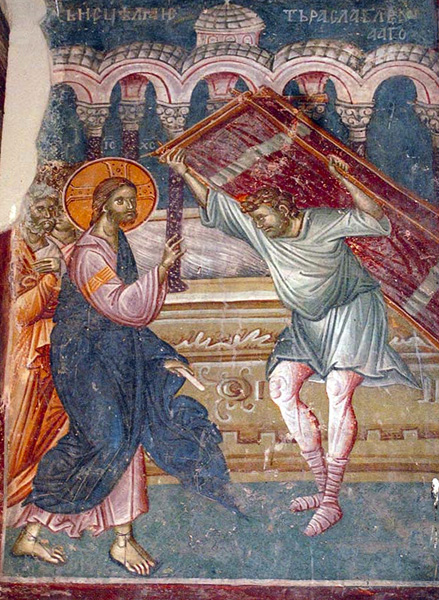
In Jesus, they behold godlike power given even to the sons of men — to turn away from the enervating paralysis of the world, to get up off our couches, to turn away from televisions and computers, to walk on our two feet, and to see God. This is the power God has given us. This is how He rouses us from our deadly slumbers — His power, in us, exercised in freedom. Let us rise from our pallets and feel this power. Let us wield this power. For the Lord of Life calls to us. And the acceptable time is now.
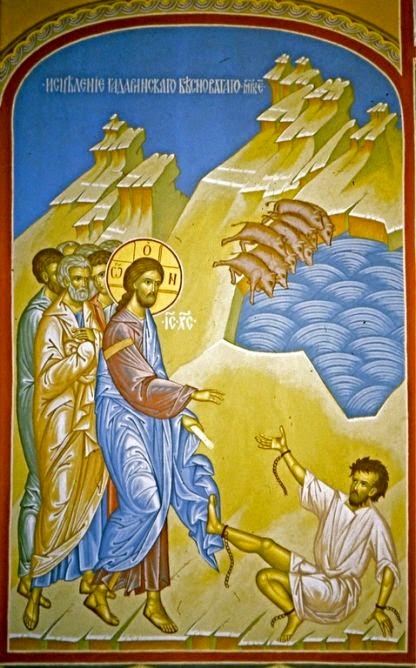
Lost Tribes. They are an essence of the Advent of God, a stated purpose of the Incarnation. And as we strive to follow the Lord God, lost tribes are an essence of our path through life. For this is the life of the disciple and the apostle. This was the life of the Master and continues to be His instructions for us. Read the Gospels, and believe. Let us ponder this more closely today lest we miss the purpose of our own lives and stray from God even as we believe we are following Him with all our hearts.

Our God is a calling God and a sending God. If you believe that you have not been called, then you are not paying attention. Throw your smart phone in a drawer. Unplug your television. Banish the radio, iPod, and CD player in your car. And carve out wonderful silence — a holy space where you may pray and ponder.
You will not have to try very hard. The narratives of the past will arise. You will notice patterns. You will see subplots criss-crossing that combine to shape up great themes in your life. God will write messages on the walls of your daily experience. The rest is yours: to read a most holy sacred book, which is the story of your life.
Jesus has already set the paradigm: twelve kings ruling lost tribes. Is not our world a vast fragmentation of lost tribes? Atomized perdition? Do we not breathe these toxic particulates every day? God's plan is to redeem this lost world. But He must redeem it through each of us, for He is Spirit, and we are the bodies He has made. The mark of our royal kingship is to be the servant of all (Mk 9:35).
The Holy Apostles and Equals-to-the-Apostles are no more nor less than each of us — fallible men and women who long to put the right conclusion on their stories .... by the grace of God. Ask the woman at the well. Her life, her clay crazed with the cracks of many failings and shames, was to be the end of her story .... until she encountered the Holy One. He told her everything she had ever done. And she owned it all. She announced it to the world. And, following her baptism, she became an Apostle, the first Evangelist, spreading the good news everywhere: "The Kingdom of Heaven has drawn near!"
God has called each of us to be His apostles. He sends each of us. He is Spirit (Jn 4:24), and we are His hands, His feet, His face, and His ministry in the world. The name Judas means "everyman" to any Jew. And the name Matthias is close enough to the Greek word for disciple (Matthites) to make the point. Take up your high calling and watch for the approach of God. He does not forget. He numbers the hairs upon our heads, and each one of us He calls as His most beloved and trusted emissary. Do not miss your call! For this is the beginning, and end, of your life.
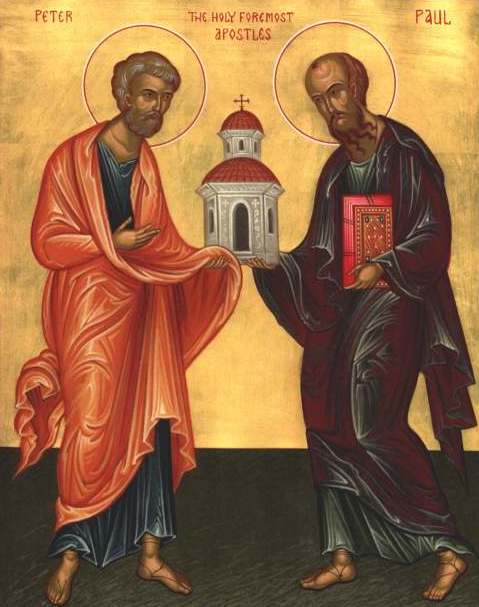
In the prismatic fullness of the Orthodox Catholic Church, God's plan is to sound every tone, resound every echo, paint with every color, fill the Creation with every fragrance, and set forth every kind of nourishment: "Taste and see the goodness of the Lord" (Ps 34:8)!
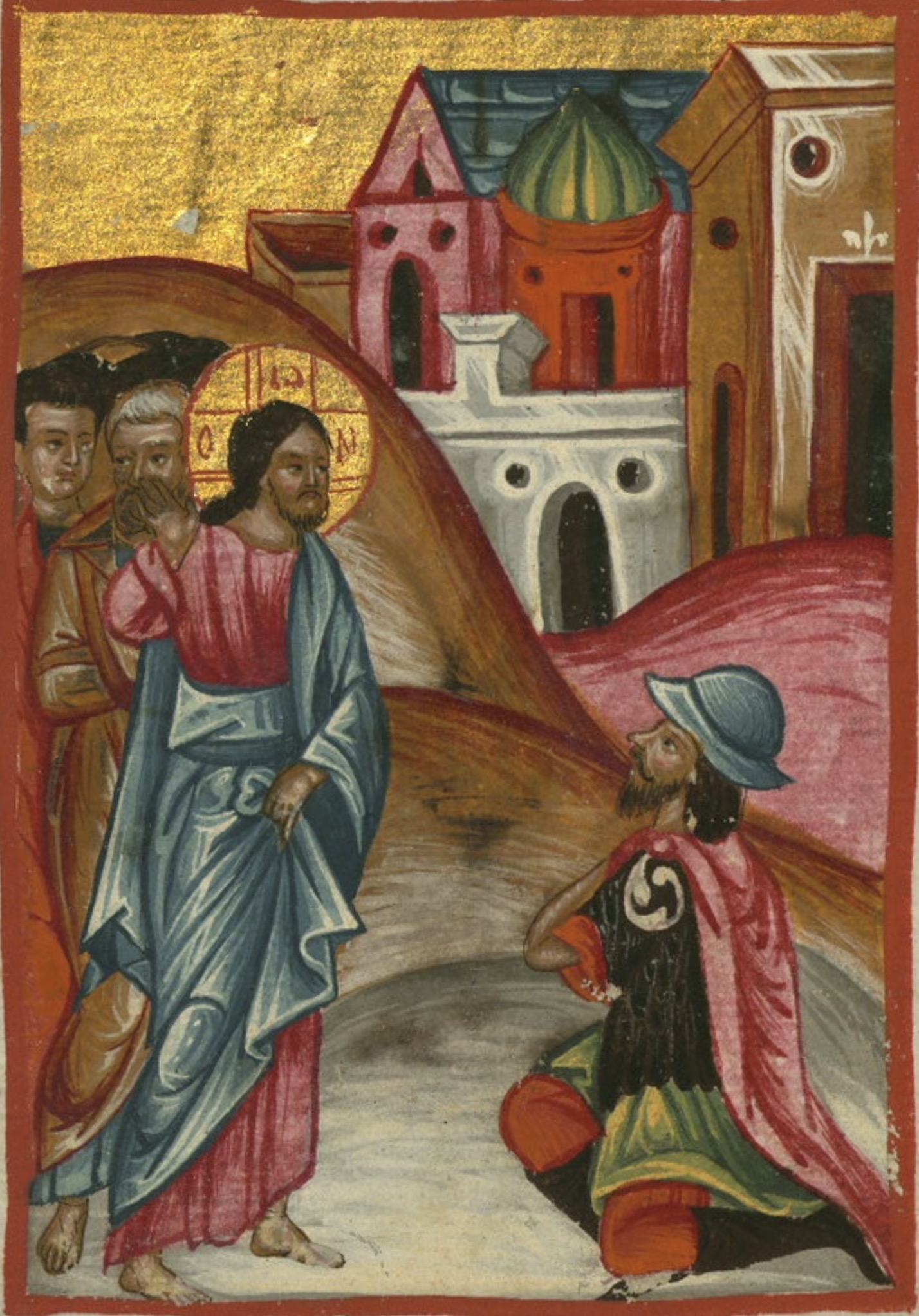
What is God's command touching each of us? Do we listen for it? Do we attend to it? Do we wait upon it like "bright-harness'd angels ... in order serviceable" (Milton)?
To apprehend these things is the essence of faithfulness, Jesus tells His Disciples. It is only then that we can phrase our petitions correctly, that we can say our prayers aright, that we can see our path ahead towards the Kingdom of God. Please join the Hermitage as we take stock and survey the vast reaches of God's Divine command. For only in this can we envision our place in His splendid orderliness.
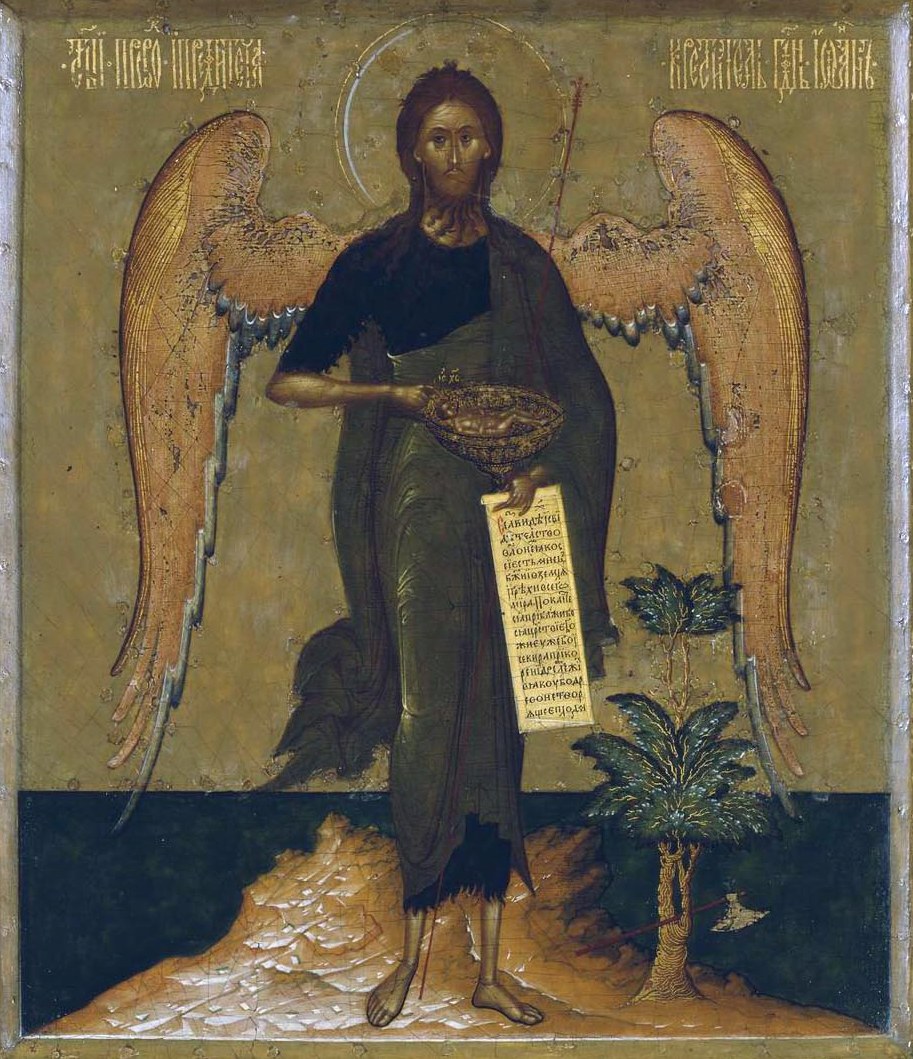
The year is 385. The place is Jerusalem. The time of day is sunset. A holy sister named Egeria stands on a hillside watching the slow and stately procession of Christians bearing torches gathering at the place where they chant Vespers each day at dusk. Looking at these lights below and seeing the stars just above appearing in a darkening sky, perhaps she could grasp the deeper meaning of liturgy.
Liturgy is the act of reflecting back to Heaven some portion of the glory that rains down upon us on earth. And yet God has always already preceded us. Is not each day a glorious reenactment of life, death, and resurrection (recalling our reflection this past Sunday)? Are not the seasons an annual display of this self-same drama as well?
We say the "round" of the seasons, and they are round. Did you know that π / pi — that essence of a circle — is equal to a nano-century (in seconds)?
We say that we pray the Hours to sanctify time,
but time has already been sanctified .... by our God.
Consider how God has marked the great turn of the seasons with the Holy Ones:
| Nativity of the Lord | December 25 | Winter Solstice |
| Nativity of the Theotokos | September 21 | Autumnal Equinox |
| Nativity of the Forerunner | June 24 | Summer Solstice |
| Great Pascha / Easter | March 31 | Vernal Equinox |
Announce for us once again, O great Forerunner: "The Kingdom of God has drawn near!"
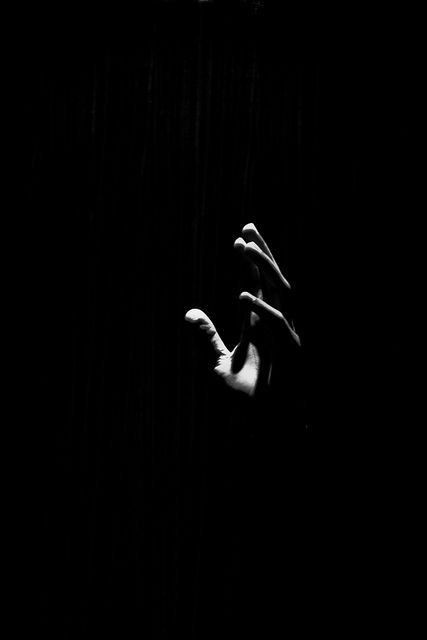
Fly over the United States on any cloudless night, and you will be reminded that the majority of Americans live midst vast plumes of light (else there would be no plumes of light). And this is a shame. For God created a lesson plan, which all people knew for thousands of years, but which most moderns have missed. Most people today have never experienced complete absence of light, which is part of our daily spiritual instruction. For to know utter material darkness is to comprehend spiritual darkness with greater insight. Agatha Christie's incomparable detective Hercule Poirot said, "What a shame you have not shared all the facts. I could have been such a help to you." For until we have mastered the material lesson plan around us, we are hobbled in penetrating the mysteries in which the facts are shrouded.
Come. Let us enter the dark. Let us understand what it is to be deprived of all light. For until we enter the dark, we shall never break through to the lamps of Heaven.
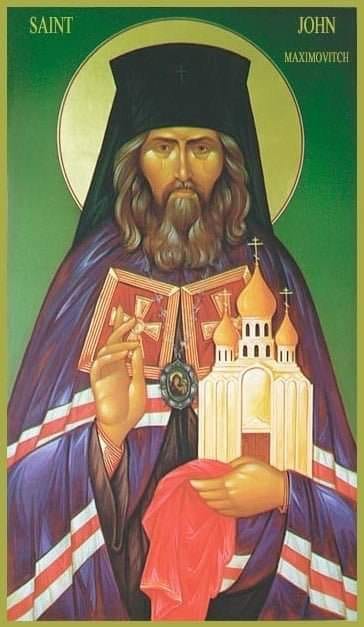
Who is the realist? The one who completes all due calculations relying on himself or the one who deems calculation concerning future things a waste of time .... utterly beyond us? Which one is the practical man? The one who trusts in material advantages or the one who trusts in God to accomplish the impossible? St. John Maximovich, called St. John the Wonderworker and glorified as the Saint of Shanghai and San Francisco, went through life expecting a miracle. His stock in trade was the impossible. In Shanghai he united a fractious, ethnically-divided group in perilous staits and founded a cathedral, parish house, hospital, and orphanage. In Washington DC, he founded a cathedral that thrives today. In San Francisco, in the face of a divided and bickering community, he completed a cathedral project that was considered dead in the water. At the altar miracles flowed from his hands astonishing the faithful and cementing their faith. In the area of Orthodox worship in the West, he approved the Gallican Rite for use in the ROCOR setting an important precedent: Orthodoxy is not ethnic, not bound to one language group nor to one geography. It is universal and prismatic ..... so long as every culture and every nation are welcomed and approved.
Pray for us, St. John the Wonderworker, that we too will trust in God and expect the miracles that He commonly performs in the midst of those who love Him.

The "Evangelion of St. James" (brother of the Lord) tells of devout widowers gathered at the Zion Temple. One would be chosen as guardian of Mary of Nazareth, who had lived in the Temple since age three but who could not remain beyond the age of twelve. When a dove emerged from Joseph's staff, marking him as her chaste spouse, he refused. Uppermost in his mind were the jibes he would hear from his sons. But in the end one son, the author of the Evangelion, would accompany his father and the Most Holy Theotokos in the Flight to Egypt, later becoming proto-Patriarch of Jerusalem. Another of Joseph's sons we celebrate today: Jude, an Apostle, one of the Twelve. St. John the Theologian wrote that their faith in their stepbrother would develop slowly: "For even His brothers did not believe in Him" (Jn 7:5).
St. Jude was martyred in Beirut — beheaded along with Simon the Zealot in 65 A.D. In his Letter, written in Persia according to Tradition, Jude plumbs the deepest depths sometime writing in mysterious phrases. His subjects include the Holy Trinity, the Incarnation of God in the Lord Jesus, the War in Heaven, the realm of Hell, the Assumption of Moses, and, joining his brother James, the imperative of faith and good works.
Recent scholarship has shown that a primary text of the early Church is the Book of Enoch (among the most attested of the Dead Sea Scrolls). The Letter of St. Jude stands out in the New Testament for citing this important document.
Jude (var. Judah, Judas) is a peculiar name for one in a brotherhood united by Hebrew ideals associated with Solomon's Temple (and, therefore, antagonistic to the Judah-ism associated with the Second Temple). That he might have taken the religious name "Thaddeus," meaning "courageous of heart," is plausible. For every member of this brotherhood, save one, would be martyred to their holy cause.
Pray for us St. Jude/Thaddeus that we too may be courageous of heart for our holy cause, which is God's cause in a dark time.

In this season when we honor and venerate the saints — All Saints last Sunday and the Russian Saints today — let us venture into this mystery. Let us attempt to enter the mind and the heart of a saint. What do they think? What do they feel? Who are they? Please join the Hermitage as we meditate on this spark of Heaven on earth. And remember to give thanks for the saints, who have been our good order and light in a world that tends always toward chaos.
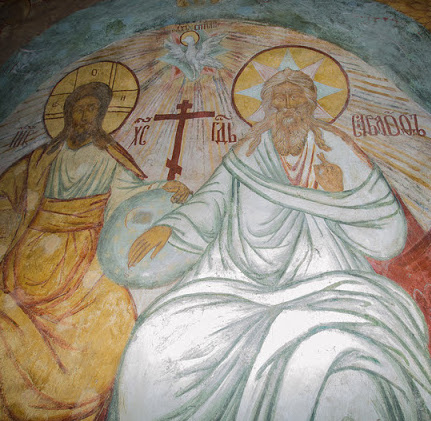
On this day set aside to reflect upon fatherhood in the U.S., let us pause to ponder great things. For they bear upon us much more urgently now. And God Himself rouses fathers all over the world to take hold, come to full attention, and remember who they are and what is at stake.

This is the acceptable time which we celebrate as Pentecost. God had revealed Himself and His Will on Mount Sinai. He had dwelt with us as a Teacher, our Guide, the Beloved, the Son of God. And today His Spirit charges even the air we breathe with Divine fire. Nothing will ever be the same again. Each one everywhere might say to his neighbor, "The Lord be with you" (both a petition and a celebration) nevering doubting this profound truth.
Today is the feast of all fulfillments, prepared by our God with care and detail. Let us then open this gift mindfully and with loving hearts. Let us ponder its intricacies. Let us meditate on its depths calling to depths. Behold its lustre and dimension, for today is the most holy meeting place where the Giver seeks the acceptable heart and mind of the ones who receive the Gift.
![]()
The cavalier among us might say, "Who cares what they mean so long as I have the love God!" But this would be to condemn our faith and our Beloved Teacher, Who says to the Father (in our Gospel lesson today): "To know You is eternal life." St. Paul repeats this principle in a key passage:
|
For now we see in a mirror, dimly, but then face to face. Now I know in part,
but then I shall know just as I also am known. (1 Cor 13:12) |
Striving after knowledge, seeking to know things aright, turns out to be an essence of the Christian life. Anything less is not Christian life.
As we look about our lives today in 2022, this powerful fact crowds in, pushing everything else aside: what our lives mean — what marriage is, what child-rearing is, what the Church is, Who God is, what is right or wrong — have brought us on to the greatest of earthly burning points, even at the scale of nuclear war.
On this Sunday when knowing aright has taken on new significance and urgency, let us attend. And let us pray for wisdom.
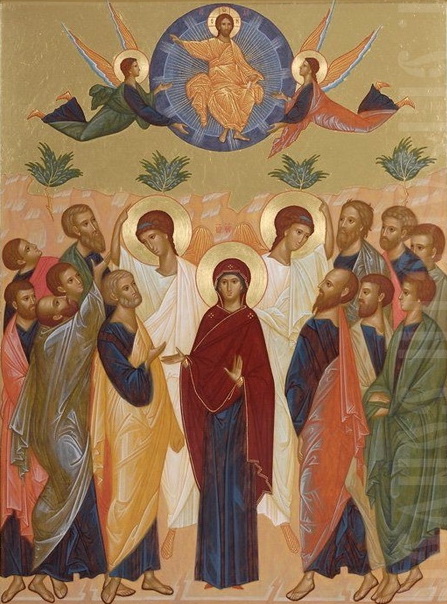
Today, let us ask, "How will we fare during the Final Exam?" At the Hermitage, Ascension Day, 2022 marks nearly eighty years of preparation for some of us. We have been formed in our Christian families. We have attended CCD or Sunday school. We have even entered monastic life and holy orders. How will we do?
Admitting we have been wrong is the first stage of learning what is right. So please bear with me as I step forward to admit things I got wrong. I do not excuse myself .... only to say that I have been a diligent student the whole way. Yet, sincerity and hard work are not enough. Ours is a journey. New bends in the road open on to new landscapes. And journey is the meaning underlying the words repentance and salvation. Our journeys never end. In fact, hospital and hospice chaplains will tell you that the final days of the journey may well be the period when the greatest ground is covered. But let us not wait till the last moment. Let us be open to the road ahead. For this is the road of our salvation.
![]()
The "cartoon" version of today's Gospel story positions the Pharisees as being apoplectic that Jesus is working on the Sabbath. May I ask a question? Which is the most commonly broken commandment .... today or in any day? Is it not working on the Sabbath? In Jesus time being excused for working on the Sabbath was as common as the accidents of life: "my cow is in a ditch"; "my son fell into a well"; my wife is giving birth." The accidents of life crowd in, and the Sabbath must step to one side. When Jesus says trenchantly, "The Sabbath was made for man and not man for the Sabbath (Mk 2:27)," does He not have the last word? Certainly this saying marks the final verse in Chapter Two of St. Mark's Gospel.
No, this furor is not about Jesus working on the Sabbath. So what exactly is all the hubbub about? The great issue before us is that two different religions claim to be the true religion, the "true Israel." Now, to be sure, this is no cartoon. Only one can be permitted to stand. There can be no room for two. The religion Jesus represents is both ancient yet new, both familiar yet unheard of, both original yet recent. But, then, He is the Alpha and the Omega, the Beginning and the End, and the Almighty God Who is also a man, and a teacher insisting that God be worshiped aright.
Please join us in this darkness and in this light. We pray that all of us will be opened to God, will have the scales fall from our eyes. But we must be ever mindful: having eyes opened is no easy thing. For it will mean seeing a new world, and often we are not so ready to relinquish the world we knew.
Who has eyes to see let him see.
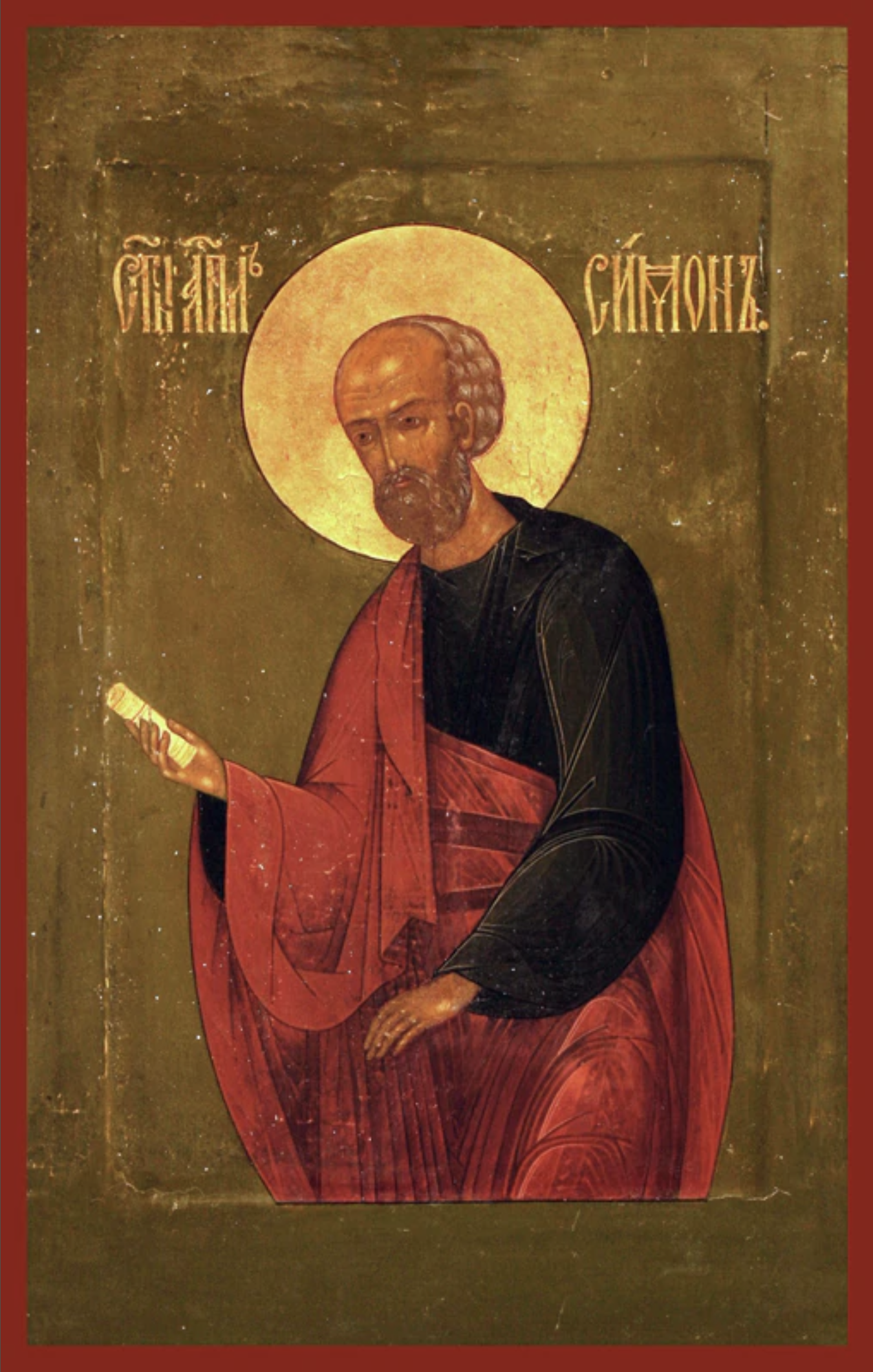
Very little is known of the Apostle whom St. Luke calls Simon Zelotes. Western Catholics celebrate his feast day together with St. Jude as a kind of "catch all" day for the two most obscure Apostles. Twentieth-century speculation that he was a member of the Zealot party, freedom fighters among the Jews, has been dismissed as the Zealot movement has been shown to be a later development. Orthodox traditions hold that he was a stepbrother to Jesus (Mt 13:55) and that it was his Wedding at Cana, which marked Jesus' first miracle. Orthodoxy teaches that he followed his Stepbrother zealously. He is venerated as an early missionary to the Caucasus, tortured and killed in Georgia.
Pray for us, St. Simon, for we also know of the Divine power of your Stepbrother and follow Him zealously in our own obscurity.
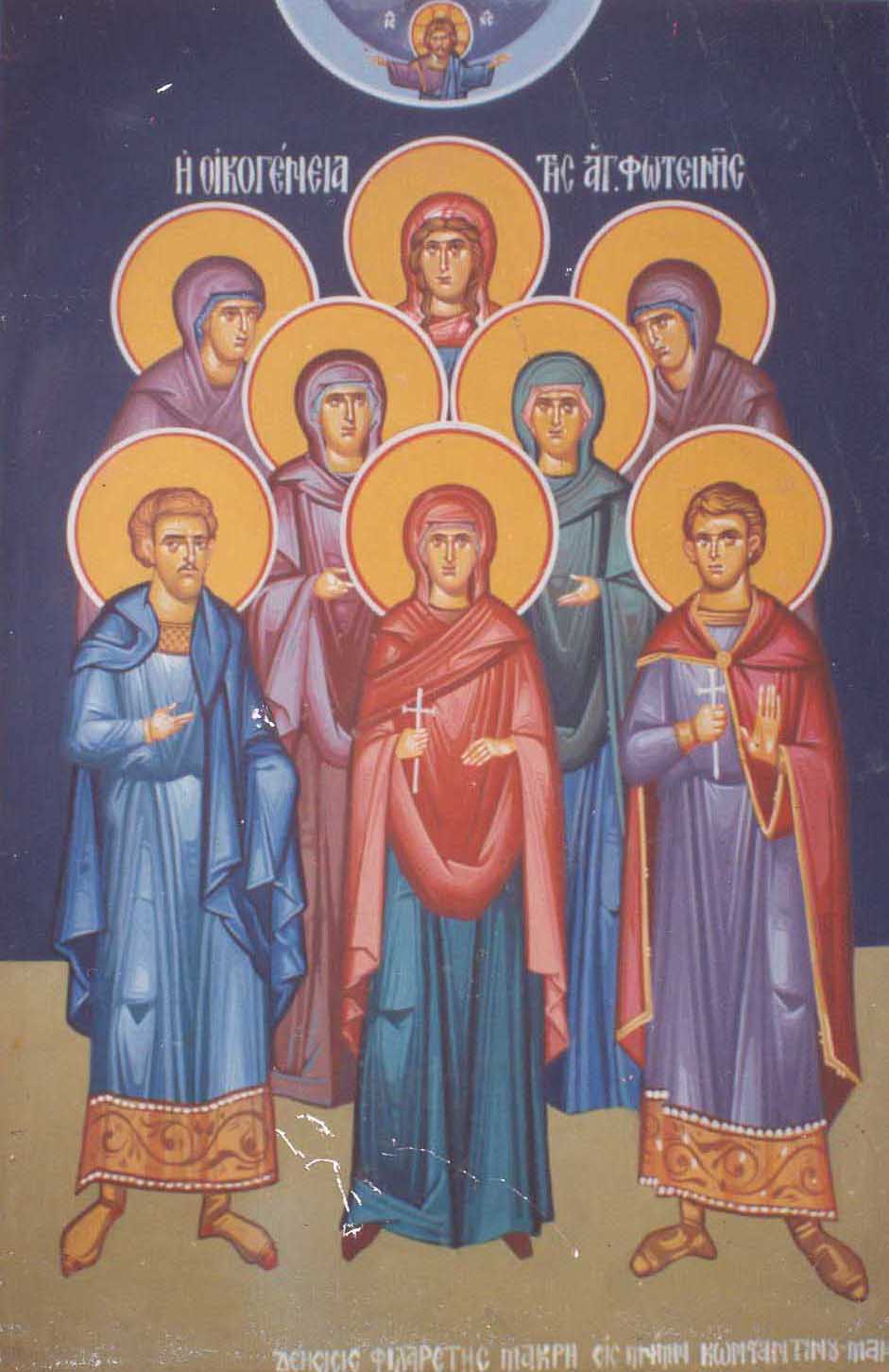
To call our Gospel lesson this morning, "The Woman at the Well" is an understatement not to be overestimated. Here in this clearest depiction of the Lord Jesus, certainly the longest exchange with Him recorded in the Gospels, here in this longest narrative in the Gospel of St. John, here in this locus of the Patriarchs par excellence, much is revealed .... if only we had eyes to see it and ears to hear it!
![]()
St. John, the Beloved Disciple "got it." Accordingly, he is crowned with many crowns: Evangelist, Apostle, Divine, Theologian, Eagle. He was the one who shared the soul and mind of our Lord Jesus Christ. He was the Beloved. And he was beloved of all Christians, right to the end of his most blessed life — his aged person carried on a litter from Christian community to Christian community that little children might touch the head that lay on Jesus' breast.
Let us attend to the wisdom of the Apostle of Love, for here we shall find our beginning and our end and all things that are to be.
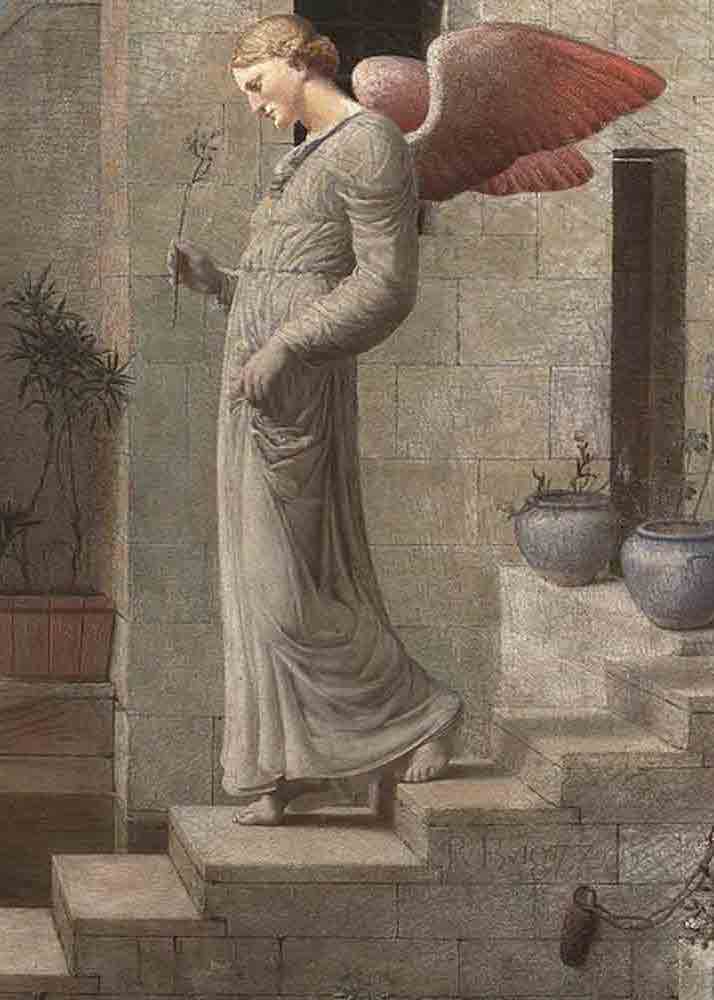
We might rightly ask the same question: how could this very different book be the background story for our marvelous and luminous Gospels? Perhaps the answer is, "It wasn't." And we must ever hold in mind the landmark statement of Prof. Yehezkel Kauffman (Hebrew University, Jerusalem): "The exile is the watershed. With the exile, the religion of Israel comes to an end, and Judaism begins."
Discoveries near the Dead Sea have identified other materials which turn out to be most important backgrounds to Hebrew religion .... but anathema to Judean religion. These were esteemed by the Early Church to be Scripture and quoted in our New Testament today. The sheer numbers of one book discovered there suggest its high importance to Hebrew religion and to our own. And that book, The Book of Enoch, is densely populated with angels.
We at the Hermitage are Orthodox Christians, the original Christians. We seek the original, the pure, the ancient faith, unadulterated by the accidents of history, much less the power plays of a long-dead king.
Today, therefore, let us be in the presence of angels. Let us bask in their light. Let us go back and ponder what even the mysterious word angel might mean. And let us always seek the clearest windows through which we might glimpse that most golden moment when God stooped down to be one of us on earth.
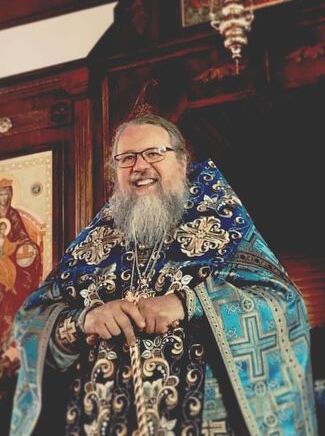
Please join us on this very special Sunday.
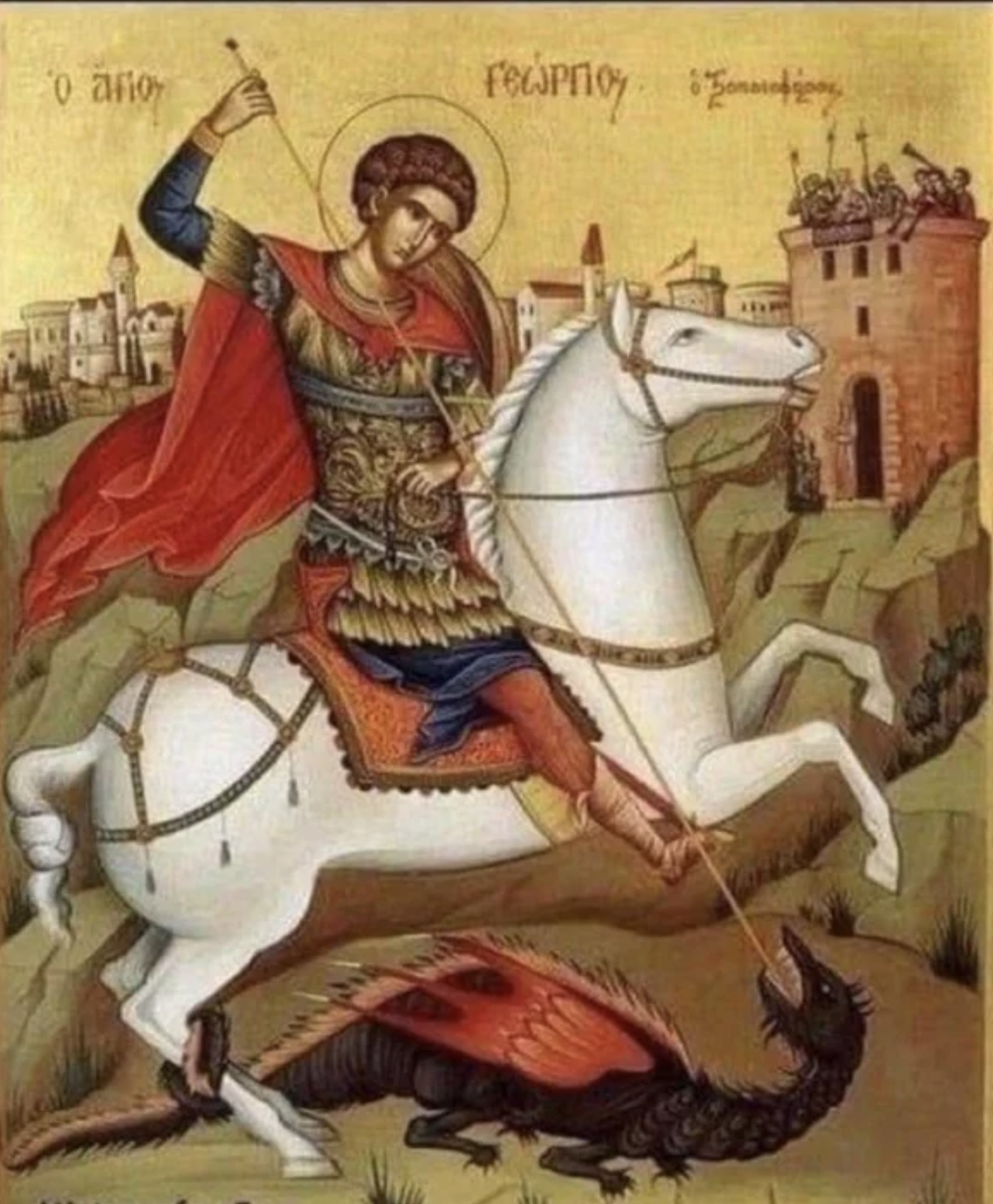
Yet, the dragon is not safe, not finally, no more than St. Michael and All Angels can ensure that demons not harm us. For the lair of the dragon is us. It's trademark "dragon horde" is our stuff, our conspicuous consumption, and our darkest and most secret desires and thoughts.
It should not surprise us, therefore, that the dragon rages wherever people have settled and made their homes. And we must not take lightly the faint outlines of civil war that begin to coalesce and form all over the world. For everywhere, in every land, the battle between godliness and dragonish life burns hot.
At this point who would question that a civil war, of moral proportions, has been in progress in the United States for two generations now? It is too simplistic to draw the battle lines with red and blue colors. The divisions are more profound and more constant: they are drawn between the friends of God and the enemies of God; between the protectors of decency, truth, and good and those ask "What is truth?"
This is not a war to be fought with guns but rather one that plays out in every human heart and soul. Valor does not take the form of taking human lives, but rather of being life-giving. It is not displayed in brutish strength but in patience, compassion, and an unwavering devotion to what is good and right.
We do not have to persuade people of the existence of dragons. For nearly every heart is always already a first-hand witness to the same. Those who are not, we call "the saints." It is their lives that we must emulate to find our way out of these smoking battlefields. So let us hold before us that ancient icon, hung in the courts of kings and princes, St. George and the Dragon.
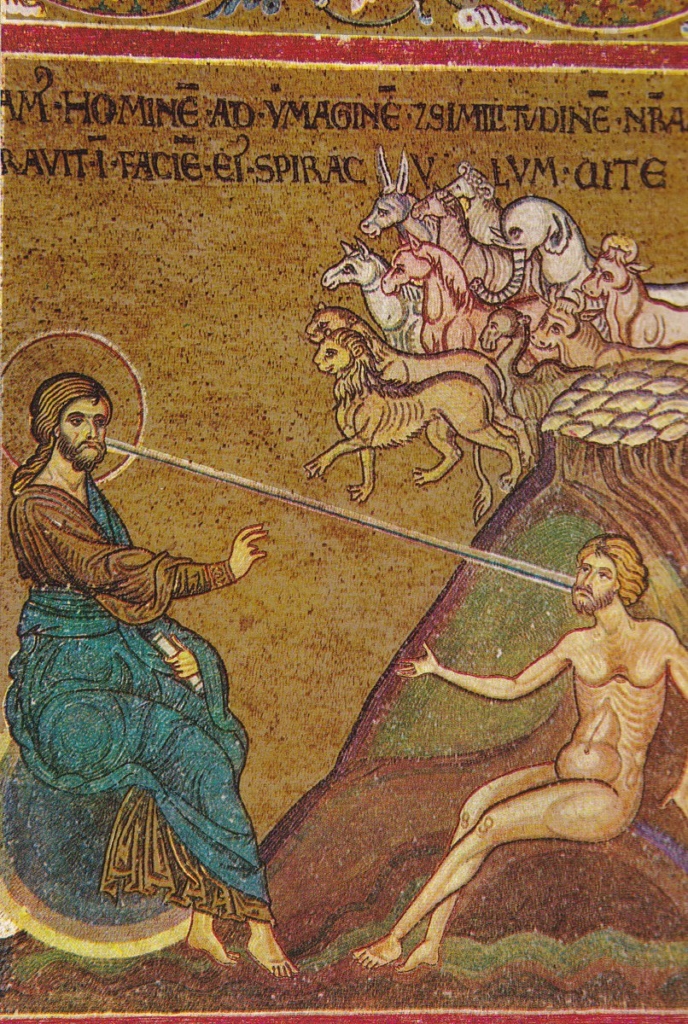
And now He stands in the Upper Room, sweeping all of that away as He had swept away a whole Creation before the generation of Noah. Here He is known: the Lord of Life. As in His first Creation, breathing life into Adam, He now breathes that same life into the Apostles, beginning His Creation again for the final time. He will do this through His Church. Purification will be her central sacrament. All the other Mysteries must coalesce around and attend this essence of Christian life and eternal life.
Here is Orthodoxy plain and simple. This is our glory. This is our life. This is all that matters. For everything else — Divine love, prayers spoken and heard in freshness and clarity, and service to a hurting world — will proceed from our transformation through Him and with Him and in Him, the Lamb upon His Throne.
![]()
"Trampling down death by death
And on those in the tombs bestowing life."
Christos anesti! Christos voskrese!

What is this strange love? What is this disjoining of the world, this rupture in the kosmos, which shrinks back in confusion and fear as God lays down His Life for His friends? What heaven or earth might contain so great a force? Who might calculate its power and dimensions?
Paradoxically, can we not also say truly that this kosmic act is everything we have always expected? Have we not as children always known God's Father-Mother love, down deep, intertwined and interlaced through our nerves and sinews? And have we not, therefore, always known the safety of such a love — confident, without question, that Mother or Father would gladly die for us? So many marvelous things in the story of our God and His world we already knew.
It is our confusion and fear which we ought to examine. This is the root of human terror. And this greatest display of God's love on earth, for so many of us, is also the moment when we learn of our alienation .... from each other and from God.
But did we not also know this? Is this not the way of love — to receive the purest and highest love and through it to learn of our indifference? Has not this always been the way with love?
Understanding this, we come to Great and Holy Friday, when the meanest collapse of love in human history is set beside the highest triumph of love for all time. Yes, it is a power and a force that might cause us to shrink back in confusion and fear. But now is the moment to buck up, to be resolute, and to face the God Who loves us. Now is the acceptable time to enter into a whirlwind and through it to find the still center of all the world's peace and safety.
Please join the Hermitage as we behold the approach of our God through the gloom and chaos of the world and its Hell. He comes with a love stronger than death. He comes for us.
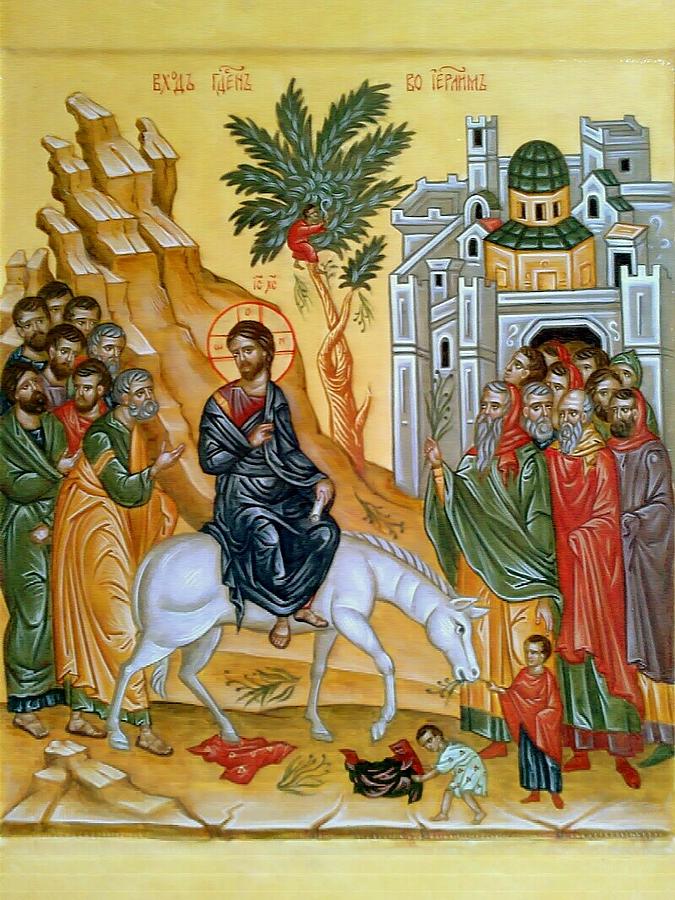
How could it be that a sincere priest of many years and two devout nuns never really understood the feast day which the Orthodox Church calls "Entry of the Lord into Jerusalem"? For decades we venerated this holy event with ardent faith and tender hearts. But we saw everything through the lens of our Western formation. Please do not accept the suggestion that East-West differences boil down to a few new customs and unfamiliar manual acts during various liturgies. The differences are profound .... even to the point of affecting our spiritual development and conversion.
The Orthodox Church holds up Lazarus as a primary figure for this feast. The day before the feast the Church has appointed, "Lazarus Saturday." The Gospel passage selected for the Sunday of Jesus' entry into the city dwells upon Lazarus. For the Lord's Entry into Jerusalem marks the third solemn procession of God into the City of David. And the figure of Lazarus, rising like a phoenix from the stinking puddle of fleshly life, is the picture of God's love for humanity. Here is the triumph of Mount Sinai, of Holy Prophecy, and of the Incarnation of God — the human person transfigured into all its Divine promise. Here is a friend of God, even an adopted Son of the Father. Here is the Kingdom, which is not of this world.
Join us in this Sunday's reflection. For we can only find what we are looking for. And we can only see what we have eyes to see.
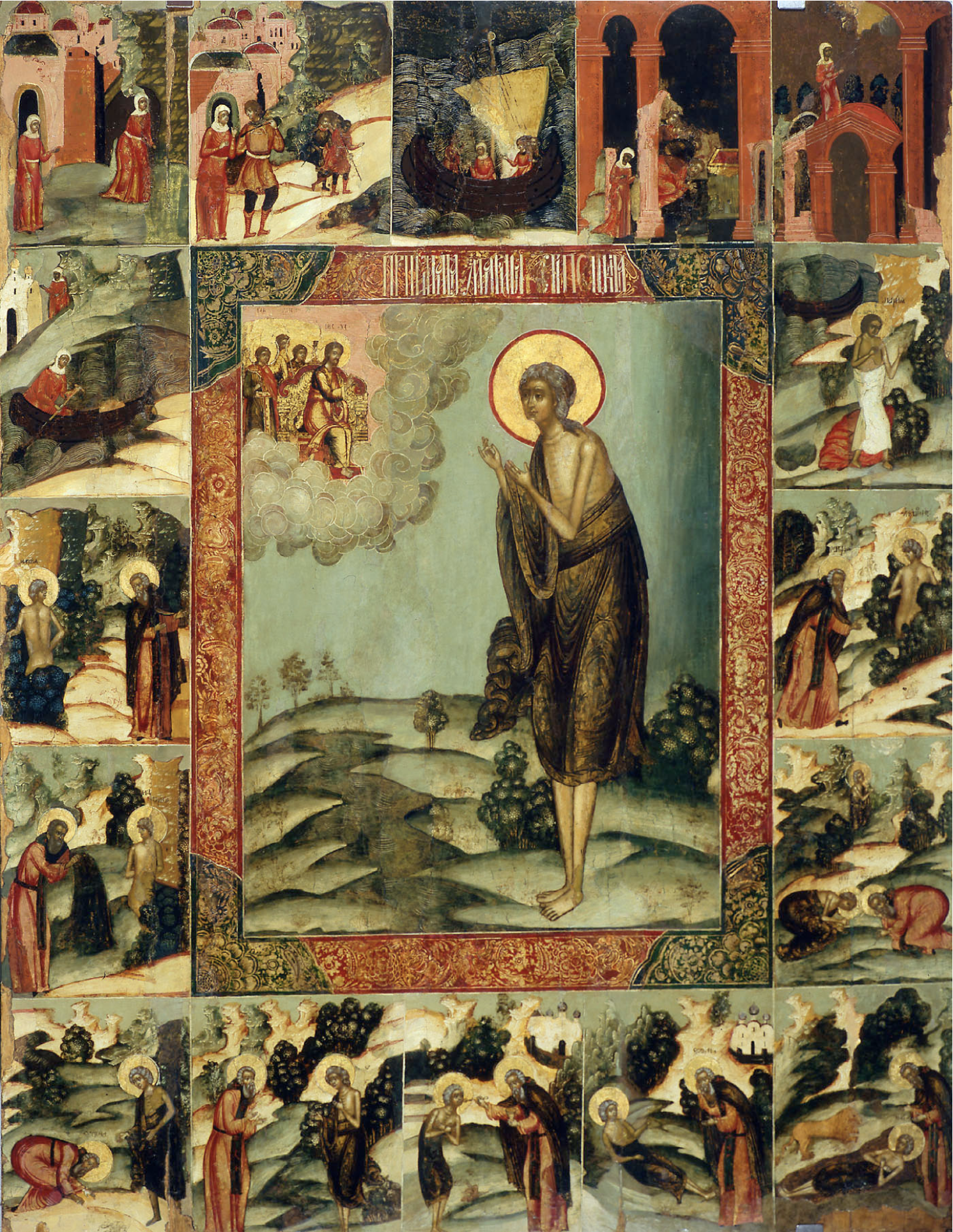
Here on the brow of a hill — seeing the Lenten journey we have trod and now looking ahead to its last mile — we ask basic questions. What is the career of the body from its birth unto death? What is the career of the mind? When you boil down the human creature to its essentials, what do you find? What do you learn? Isn't this the purpose of the desert? To get down to essentials? Ask the people Israel in the Sinai Wilderness. Ask Jesus of Nazareth, Who surveyed the open territory of the human condition from a high desert peak. Ask the Desert Father, St. Anthony the Great. Ask the Desert Mother, St. Mary of Egypt. Here near the close of Great Lent .... "For God's sake let us sit upon the ground / And tell sad stories about the death of kings" (Richard II, III, ii). And let us be unsparing as we recount the death of our bodies and minds and their careers of michief and mayhem.
Yet, by the grace of God, there is a different career — one that graces us with a lightness of being, where we shed the fleshly weight of bodily appetite and quiet the over-busy mind. Mother Mary of the Desert glided over rocky ground. She walked on water. She was the familiar and fellow of fearsome beasts that protected her .... she who once was filled with the stench of carnal life .... unto carrion. Is she not the saint for our times? Is she not our guide out of lives choked-unto-death with sensual stimulation and ego? Pray for us, O Mary of the Desert, that we be made worthy of the promises of Christ!
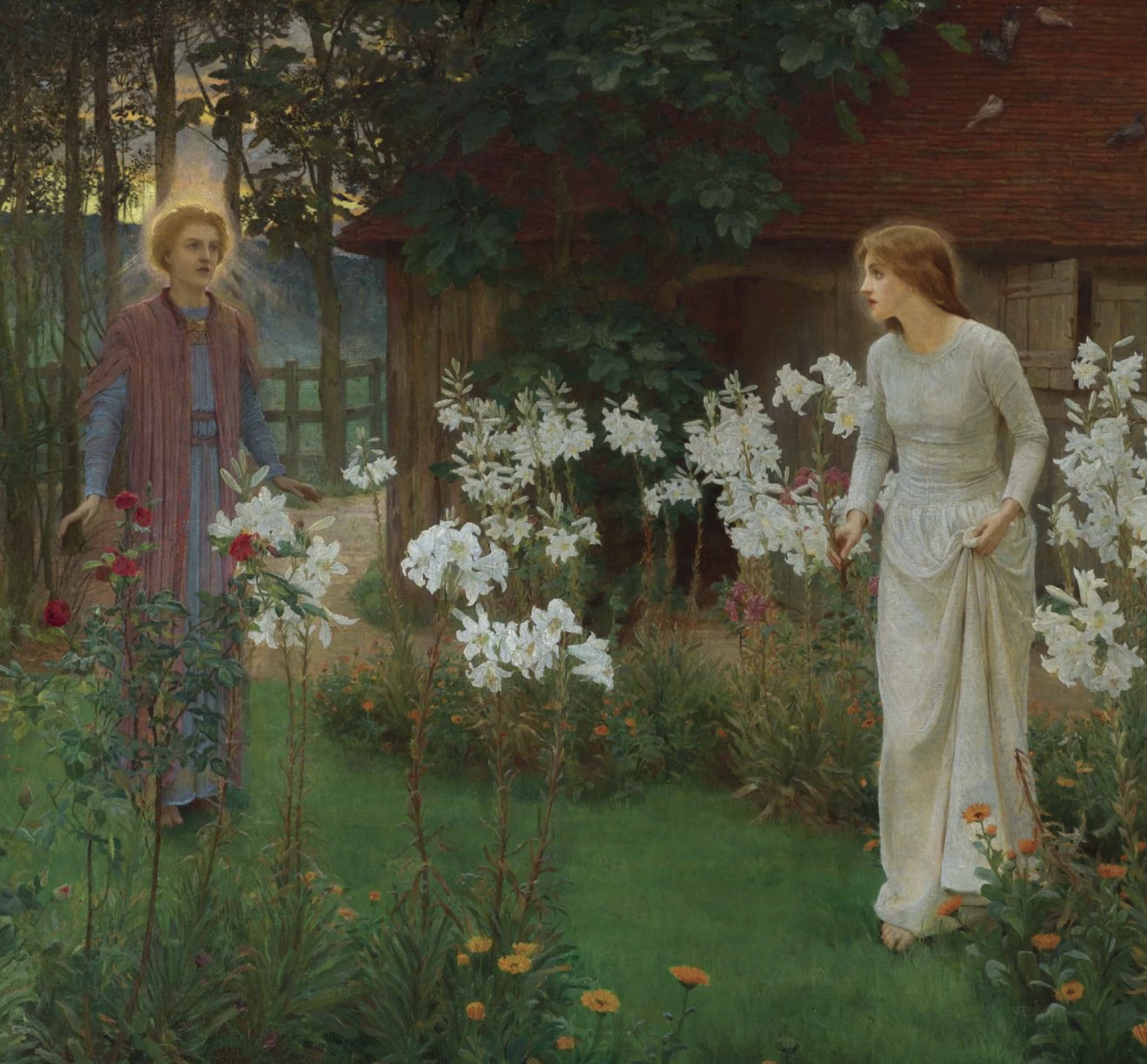
Why did God enter human history two thousand years ago — one thousand years after the era of Kings David and Solomon? For that matter, how could Omnipotent and All-seeing Power walk among us without abridging our freedom? How could the Creator enter the Creation without rupturing Heaven and earth? Great Caesars erect soaring triumphal arches to mark the entry point of their invincible power and will into a city. What will the Caesar of caesars, the King of kings, do?
He will ask for the consent of a twelve-year-old girl in order to enter through the gate of the human lifeworld.
When we have contemplated this mystery in its depth and subtlety, then we will have taken important steps in understanding our Most Beautiful God and His mysterious nature. And, in this, we will have advanced along our individual paths toward Him and toward His wonderful Heaven.
Please join the Hermitage as we become "poor in spirit" (Mt 5:3) seeking lowliness as we follow our Beautiful God into all the places to which He has called us. For there He will be with us.
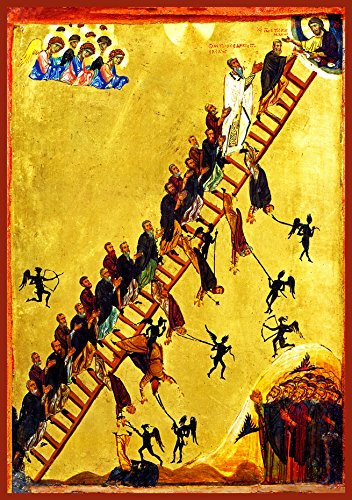
Why do we seek this path? Why do we transform our lives in order to climb to High Heaven? Anyone who has been in love can tell you. In the first blush of love, the one who loves beholds the beloved and says, "She is far above me, unattainable! How could I dare confide my feelings to one so high and fine?"
Yet, against all odds, he is received. He cannot believe it! He is walking on air. Naturally, he puts his best foot forward, revealing only what is good and beautiful within. He dresses and grooms himself meticulously. He hastens to rid himself of all that is unworthy (which he had permitted in moments of despondency). But despondency is now banished. And he diligently keeps away from the beloved anything low or unfit. He leaves his former life behind.
Nonetheless, as he is accepted and tokens of love are exchanged, a lapse intrudes. He lets down his guard. He is tempted by the former things. But he will not give in. For love has taught him that the new life is all that matters, and each next glimpse of the beloved continues to inspire him.
She has become his inspiration, his muse. And his art has become the inner life and its effect on everything he says and does. This is his masterpiece. And the beloved is both the one who inspires it and its greatest appreciator. At length and over time, he can imagine no other life than the one she cherishes. He has fashioned a whole life in the holy light of her eyes.
And now she has come to love him with an all-consuming admiration and love, cherishing him, adoring him. The life he makes each day is formed in the image of that shared love: her highest expectations for him and his gratitude for her.
This is the Kingdom of Heaven — to let one's life become filled with love, which is the only Divine property to be found on earth. We get our first glimpse of God's beauty, and we say, "This is too high for me to attain!" Yet, we find that our love is accepted .... even returned. We learn that each step we take to show ourselves in our best light is received with approval and joy. And then the most wonderful revelation of all: we discover that we have become what we admired from afar — so high, so unattainable, yet now as familiar as our own souls.
Love, love, love. All is love. As we seek always to be that best self which our beloved loves so well, the union of two hearts can never be far behind.
Are these not the rungs of St. John's ladder? Is this not the same transformation that he has recorded — from leaving our past lies behind to the attainment of beauty and serenity and union with the One Who is Love?

Several times a year, the whole Orthodox Church reflects together upon the Cross. We call to mind the Empress St. Helena excavating and sifting through rubble together with St. Makarios, the Patriarch of Jerusalem. They searched tirelessly discovering, beneath the pavement of the ruined shrine to Venus-Aphordite, three cross-beams buried under its costly tiled floors and pavement. Nearby, another pagan shrine of the early second century had been built by the Emperor Hadrian — the enormous Temple of Zeus-Jupiter.
Across all is writ large questions of power, of rule, and of governance — foremost leaders sifting through the ruin of past reigns and faded glory. Surely, a comparison is urged upon us as we contemplate soaring white temples with their enormous gold statues, on one side, and three humble cross-beams, on the other. And questions arise naturally. Where is the Throne of God? What is the nature of our God's power? And, finally, what is the Cross, at once both a symbol of servile humiliation and of victory over the world? What can all this mean? The answer goes to the heart of another question: "Who do you say that I AM?"
Please join the Hermitage this Sunday as we ponder basic questions concerning our death and the quality and direction of our life.

In 320 A.D. soldiers of the Roman Legion XII, Fulminata ("armed with lightning") were persecuted by the Emperor for their Christian faith. Refusing to betray the Lord Jesus Christ, forty were sentenced to be bound naked upon a frozen lake and slowly to die of exposure. Warm bath were prepared on the shore awaiting those who would recant. One man did. Meantime, a Roman guard was granted Heaven's view of the events unfolding. He saw a soft light, a Divine radiance, enveloping the men on the lake. He saw Heaven opening to them, welcoming them, and he tore off his clothes, proclaiming himself to be Christian, and lay on the frozen lake. The number forty was thus restored.
As we commemorate the Holy Forty Martyrs of Sebaste, let us remember that we may view everything in our world every day either in the perspective of men or the perspective of God. Only the latter is free from error, free from pollution, and the only one that abides. All else, besides God, is constantly shifting delusion and ultimately madness.
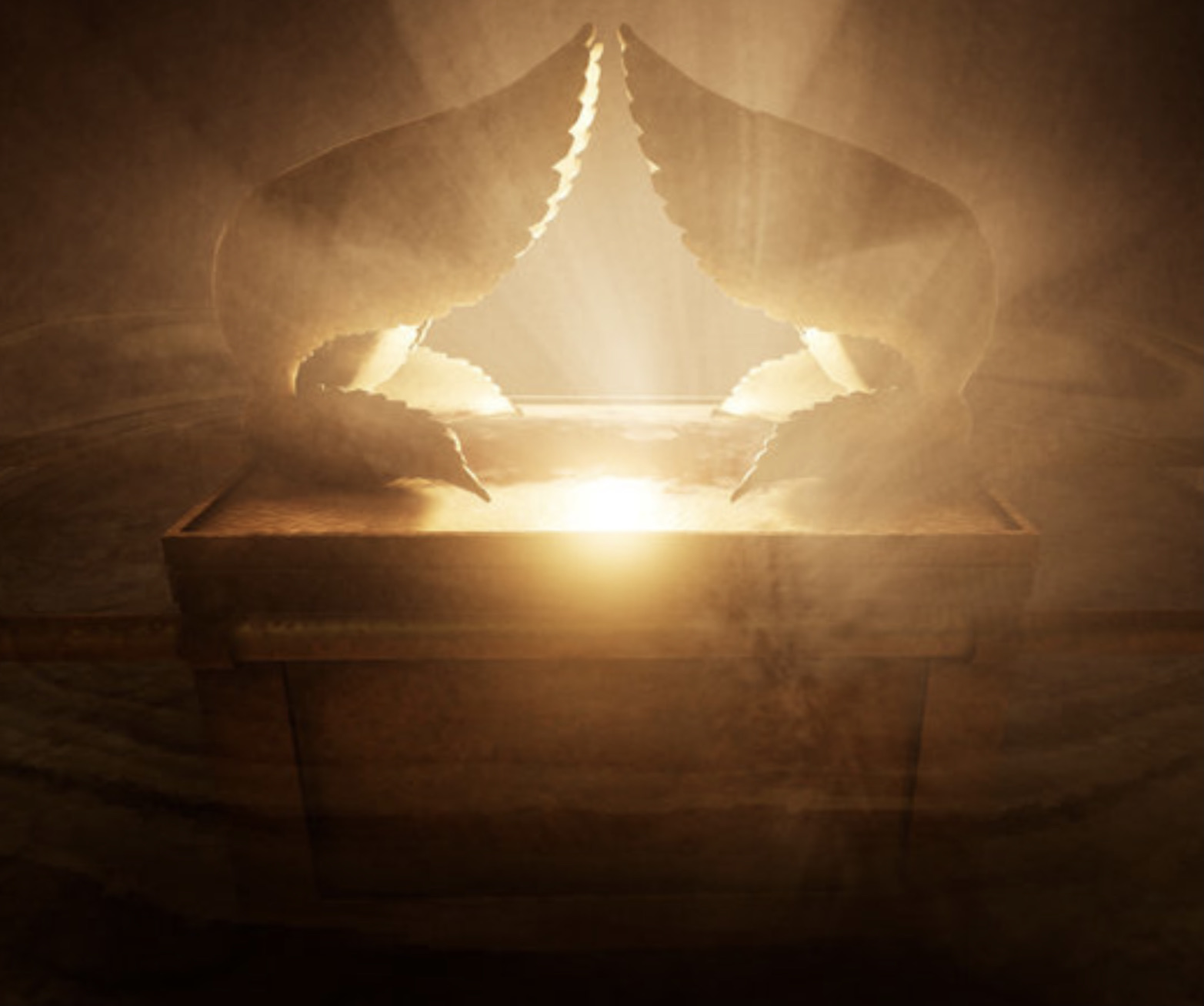
Surely our "golden age" coincided with the most blessed visitation of God, Who dwelt among His people for thirty-three years. The more time that passes following this effulgence of light, the dimmer our world becomes. The nearer we draw to that time, the closer we come to the truth, which only God can embody. This is why the Apostles and the Fathers are so important to us, for they lived much closer to that truth, before memories faded and luminous events were forgotten. Certainly, an individual Father may err over a lifetime of writing and teaching. But collectively the Fathers cannot err. We call this area of agreement the Patristic consensus. All theology ever after is either innovation, and therefore heresy, or it is authentic development of the Patristic consensus.
Among the most chilling of Patristic teachings is "Extra Ecclesiam, nulla salus. / Salvation is not possible outside the Church." Indeed, this teaching rises to the standard of the canon of St. Vinent of Lérin: what all people in all places have believed for all time. It is infallible. (Yes, a few have dissented, but in the natural world, where standard deviations apply, what is mostly true is what is true.)
The question, "Where or what is the Church?" therefore, is one of great consequence. Our own journey in search of the Church has been the adventure of our lives. We have been Anglican, Roman, and Orthodox and we see Evangelicalism everywhere.
We have learned that a mark of the true Church is that it warms the soul. It illuminates the mind. It is exciting every day. And, as short years pass, you marvel at how much you have grown. By contrast, that which is not the Church leads into tedium and egotism. In time, weariness and distaste set in.
Today we celebrate St. Gregory Palamas Sunday. The insights he received from God were a development of the Patristic consensus, So close to the truth did he come that Western theolgians set upon him vigorously. In the end, he revealed the essence of Chrisianity. Taste and see. For this is the only way you will find the true Church.

The Triumph of Orthodoxy is seen primarily in unswerving faithfulness — the refusal to give in to the trends and fads of theology, the refusal to revise liturgy to suit tastes, and, above all, the refusal to bow to the political and cultural idols of the age.
The Triumph of Orthodoxy has also resided in sacred traditions being passed on from priest to priest beginning with the Risen Christ, Who discloses them to His Disciples, moving them beyond parables and giving them eyes to see and ears to hear. Today, in the call of Nathanael, we are inducted briefly into these ancient mysteries. For two religions and two lifeworlds co-existed side-by-side in the Levant of Jesus' time. The former was ancient and luminous, whose mountain summit was unity with the Divine. The latter, imported from Babylon, involved rituals carried out before stench-filled altars stained with blood. The former was a Land of Promise. The latter was a diseased path leading to destruction, not only of their cult, but of their entire lifeworld.
Let us draw back the curtain. Let us lift the veil, that we, too, might get a glimpse into the true religion, Whose Teacher is the Son of God.
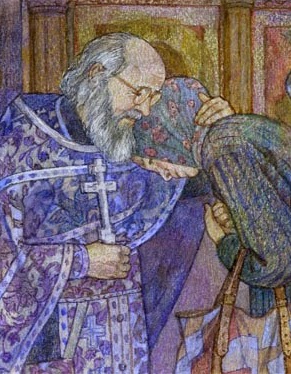
Even as children we saw the connection between Lent and "Spring Cleaning." The idea is that we look at the household of our interiors and get rid of the clutter and debris that have been dragging us down. "Let us make a clean sweep!" we say. The idea is to be rid of our ungodly habits and to make a fresh start with wholesome life and closeness to God.
But we do not live in little worlds unto ourselves. Our hopes for Heaven do not begin and end within the isolated sphere of a one-on-One relationship with God. At the very least, the entire premise of Heaven is based upon adoption and therefore of family. Relationship ends up being the atmosphere and setting for our spiritual health and journeys. We are in it together!
Forgiveness, then, is not simply a nicety that enables us to get on with wholesome life. It is something far deeper going even to the core of our own spiritual health. That is how St. Luke saw it as He related Jesus' teaching on forgiveness. For Luke saw that God does not merely dismiss a debt. Forgiveness of debt was the tax collector Matthew's understanding. The physician Luke differs. He saw it as God curing disease, a disease that could very well take our eternal lives.
Please join the Hermitage as we meditate on forgiveness as going to the heart of our Lenten journeys.

What is goodness? Is it something that we are able to do? Hasn't our experience taught us that we fail even to define good and evil?
For many, many Christians, our Gospel lesson this morning, Matthew 25, is the final and unrevisable definition of goodness: to feed and clothe and care for those less fortunate than ourselves. In this, mysteriously, we care for God.
We must emphasize mysterious, for the attempt to seize "The Knowledge of Good and Evil" in the form of forbidden fruit — appointing ourselves referees in the contest of right and wrong — goes to the heart of the present human condition. What is goodness? The Psalmist advises us to "taste and see" (Ps 34:8). In this, we begin to grasp that elusive quality of goodness which alone is God's.
Surely, Matthew 25 is about the "final and unrevisable." For this famous passage, so often "cherry-picked" and prominently displayed in outreach missions throughout the world, is preceded by the sentence par excellence concerning finality and unrevisability (though rarely included on plaques and posters):
|
When the Son of Man comes in His glory, and all the holy angels ....
He will separate them .... as a shepherd divides his sheep from the goats. (Mt 25:31-32) |
Please join us at the Hermitage this morning as we revisit another final and unrevisable subject, which is the nature and definition of Christianity.

Do we go too far to say that this brief, hard tale, having a diamond-like density, is a synopsis of salvation history? Certainly, we must be haunted by the fact that this story of family ruin (for which family could survive the loss of half its estate?) is among the most popular of all stories found in the Bible. Which scenes have been more frequently depicted over the centuries and by artists all over the world, than scenes from this parable?
Without question, we are drawn to it. We cherish it. We ponder it. We come to explain so many things in our spiritual journeys through its various layers, including Eden, theosis, and the nature of our relationship with God.
As we descend into its deeper interior, we shall encounter the mystery of God's jealous love, of His single-minded zeal for our welfare, of His willingness to give away everything dear, even His Only-begotten Son, that He might more perfectly, love us .... who have betrayed Him. This, the deepest of all earthly mysteries, will also be found in this mysterious parable.
In this brief tale of twenty, short verses, we shall enter a labyrinth. And not least among its twisting byways is the haunting tale of a self-destructive son, which turns out to be the poignant history of the world and the heartbreaking depiction of all our disappointed hopes and dreams.
We hope you will join us at the Hermitage this week as we ponder this most beloved, yet most heartbreaking, among Jesus' mysterious stories.

The character of a profound soul is silence. The speech of the great ones is marked by few words. The revered prophet St. Simeon was trenchant. He comprehended the little life in his arms with a single word:
| αντιλεγόμενον / anti — legomonon / contra — dict |
This Christ Child will be the the Sign of Contradiction: the One Whom the world will contradict. But to contradict God is to stand in the place of Divine Judgment and Final Contradition.
Nothing more nor less might sum up the Advent of Jesus into the world. The place where we meet Him is always already the place of judgment. And our answer to His master question,
| "Who do you say that I AM?" |
will settle the matter of our eternal destinations.
Please join the Hermitage as we venture out to the Temple to meet the Lord. It will be the turning point of our lives and always already the crossroads of human history.
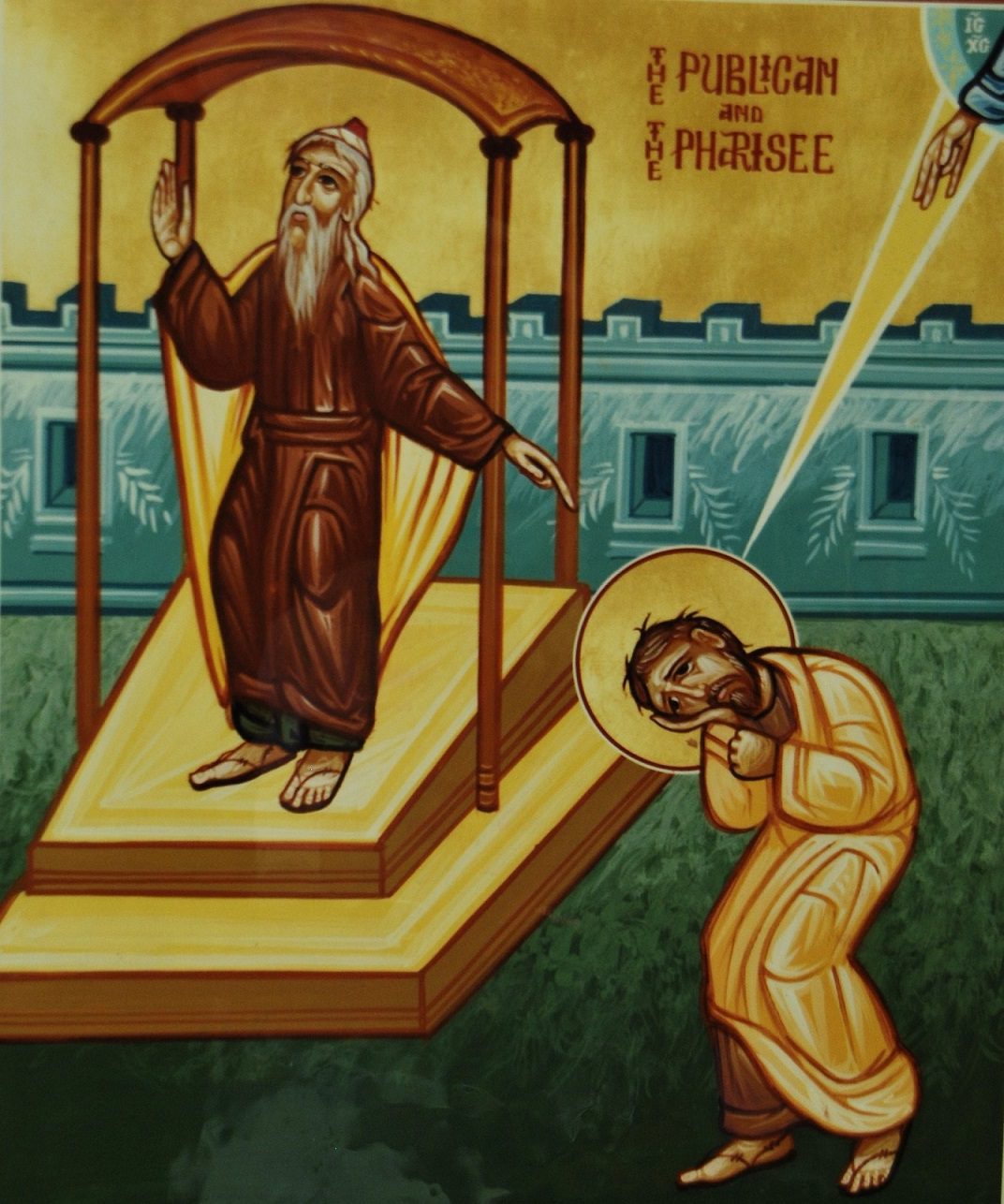
The first verb, the first action, of the Holy Scriptures is to create, revealing profound truths about our God: all life on earth has being; God alone is Being. He alone possesses that inimitable magic, that holy stirring and thinking we call life.
But the greatest verb in the Holy Scriptures is to love. It is the only verb in the Two Great Commandments. This also reveals profound truths.
We do not reach too far to say that love is what the Holy Scriptures are about. It is love, which has brought God to create our living world. And it is love which keeps our God near to us. It turns out that the state of our hearts is more important to Him than anything else. For when our hearts open, the Divine floods in. This is the nature of the heart and love, which is the only property on earth that is purely Divine, which makes no sense to a materialist world, which alone asks us to put ourselves last.
And well we know that love is the most powerful force on earth, able to change lives, able to heal marriages and families, even bringing us to lay down our lives for our friends .... willingly.
It is ironic (at first blush) that our hearts should become "open-hearted" when we are brokenhearted. Yet on reflection, this makes perfect sense, for how else could it swell and grow to become great-hearted? The old form must burst its previous boundaries to take on new, even expansive, dimensions. like old wine skins holding new wine. And this bursting heart, this heart swelling within us until we fear we cannot contain it, this is the heart that moves God, even God. This is the moment He has been waiting for.
Please join us at the Hermitage as we draw invisibly near to the brokenhearted. It is holy ground. And we are blessed to be close to it.
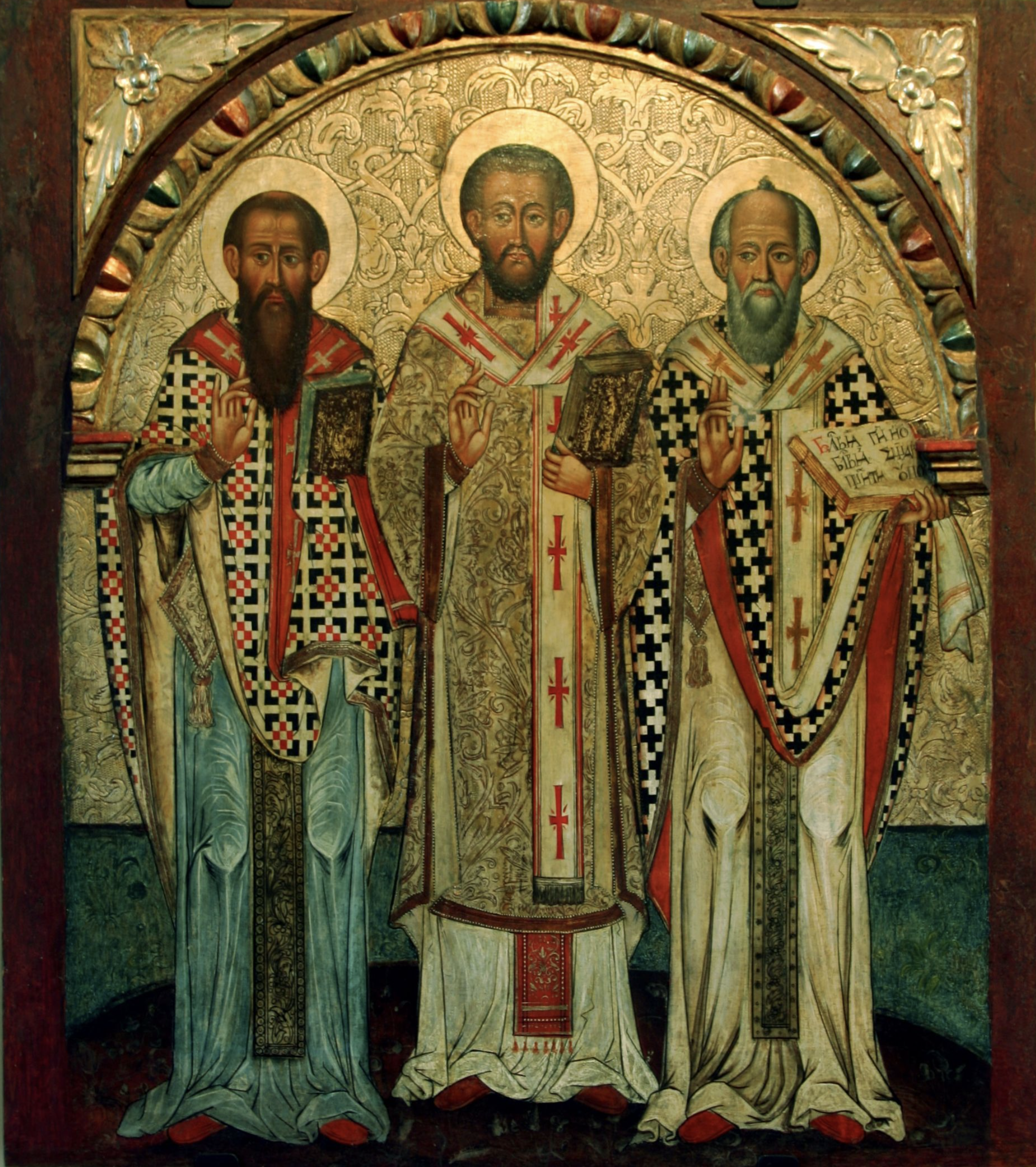
Today we celebrate the eirenic day. For with this day, hostilities ceased among 3 fervent groups.
First were those who asserted the "golden-mouthed one" (Chrysostom) to be greatest. His moving sermons brought the impenitent to their needs seeking reconciliation with God. His Divine Liturgy brought the Lord Jesus into the midst of the faithful. His episcopal governance of Constantinople brought worldly excesses to heel.
Next were those who protested the excellences of St. Basil the Great. He had introduced the world to the Holy Spirit theologically leading to a final dogmatic development, confirming our understanding of God as Father, Son, and Holy Ghost. He also had composed a Heaven-inspired Divine Liturgy bringing the Son into the midst. He was without peer in his defense of the Nicene Creed.
Finally were the ones who gave pride of place to St. Gregory Nazianzen — "the Theologian," second only to the Beloved Disciple. The frequent bursts of illumination encountered in his writings shocked the mind and rooted the spirit in the Kingdom of Heaven. With St. Basil, he elevated the mind to grasp the Fullness of the Holy Trinity. As a classically trained scholar, and remembering that God has inscribed His Ways onto the fleshly tablets of our hearts (including Gentile hearts) before etching them on stone, he brought the richness of philosophical thought into Christian contemplation — never enslaving it (as Scholasticism would much later) but liberating it, throwing open the gate to new and open pastures for theological contemplation.
Strife among these three warring parties burned hot causing division in the Church and discord among its bishop-rulers .... until January 30 c. 1100 A.D., when all three would be celebrated together as the Three Great and Holy Hierarchs of the Church. No doubt, these saints in light were scandalized by all the bickering and wrangling, fraught with puffed up pride. So let us celebrate this day as one of humility: when the greatest one argues that his brother be first and he be last.
Pray for us, O Holy Hierarchs, that we may venerate the profound and emulate the lowly.
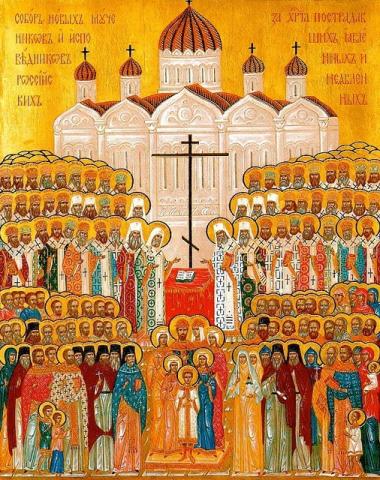
Perhaps at no time in human history has the wisdom of God become so evident. Who can doubt that the exaltation of the human intellect — with its science and technology and new "free-for-all" morality — has loosed powerful and evil genies into the world? The toxic brew of rapaciousness and technologies that are manifestly destroying our planet has become a juggernaut that no one, except the most willful, could ignore. Set against this ghastly image is the true memory, still fresh in our minds, of another world: well regulated by moral life, worshipping God in every school and in every village and town, with its beauty, its clean, healing oceans, its limpid rivers and streams, its clear, pure air, its abundance of pristine water, and its unspoiled open spaces. Yes, left to itself our world — conceived, designed, and created by God — displays in most pleasing colors and tones, the wisdom of the Divine mind. But this wisdom has been consigned to oblivion, deemed folly, as the calculations of the puny human intellect seek to master every last acre of our planet home.
The ones among us who have conformed their lives to God's way of seeing and thinking, living simply that others may simply live, are also deemed fools. From time to time, the rationalist mind finds Christian foolishness so repugnant that it seeks to destroy it, slaughtering even millions of people. Today, we lift up our voices in praise of such fools for Christ, for they were faithful to the Master Who was deemed the greatest fool of all.
Please join the Hermitage on this solemn day as we remember and honor the ones who chose the wisdom of God and for that reason were executed by a state that bet everything on what they saw as the greater wisdom of man.
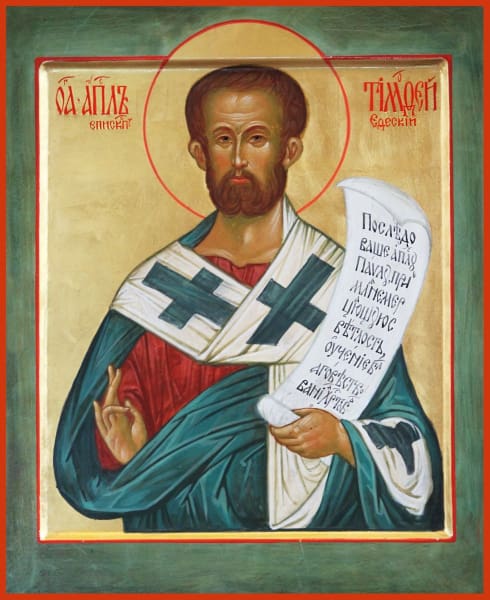
As far as we know, St. Timothy was not a towering or prepossessing figure. He was not a "son of thunder" such as the offspring of Zededee. He was not an inspiring orator such as St. Paul. He was not even an imposing presence (however sometimes-stumbling) such as St. Peter. What he was, however, was faithful.
Judging from the two letters written to him by his spiritual father, the Apostle Paul, Timothy was to be depended upon. He was discreet, and he was trustworthy. It would be to Timothy that St. Paul confided the "dirty laundry" within the nascent churches and missions. Paul describes the many pitfalls into which Timothy must not stumble, the bad habits which Timothy must not habituate, and sins of the ego into which Timothy must not fall. St. Paul outlines to Timothy the many "household codes" that must govern Christian life. The First Letter to St. Timothy is full of them. Why? Because St. Paul could see that Timothy understood decency, good order, and rectitude. Timothy did not have a rebellious heart. He would not become quarrelsome son. He understood godliness right down to his bones.
No. Such a man does not attract our attention as an epic hero might. But such a man is the stuff from which the good life is made ..... and might continue to be lived by generations of our children.
On this his feast day, let us praise the good son, the trustworthy man, and the servant perfect in obedience. St. Timothy pray for us, for, as you see, our world has fallen into chaos and compulsive disobedience. And we long for the return of light and good order.
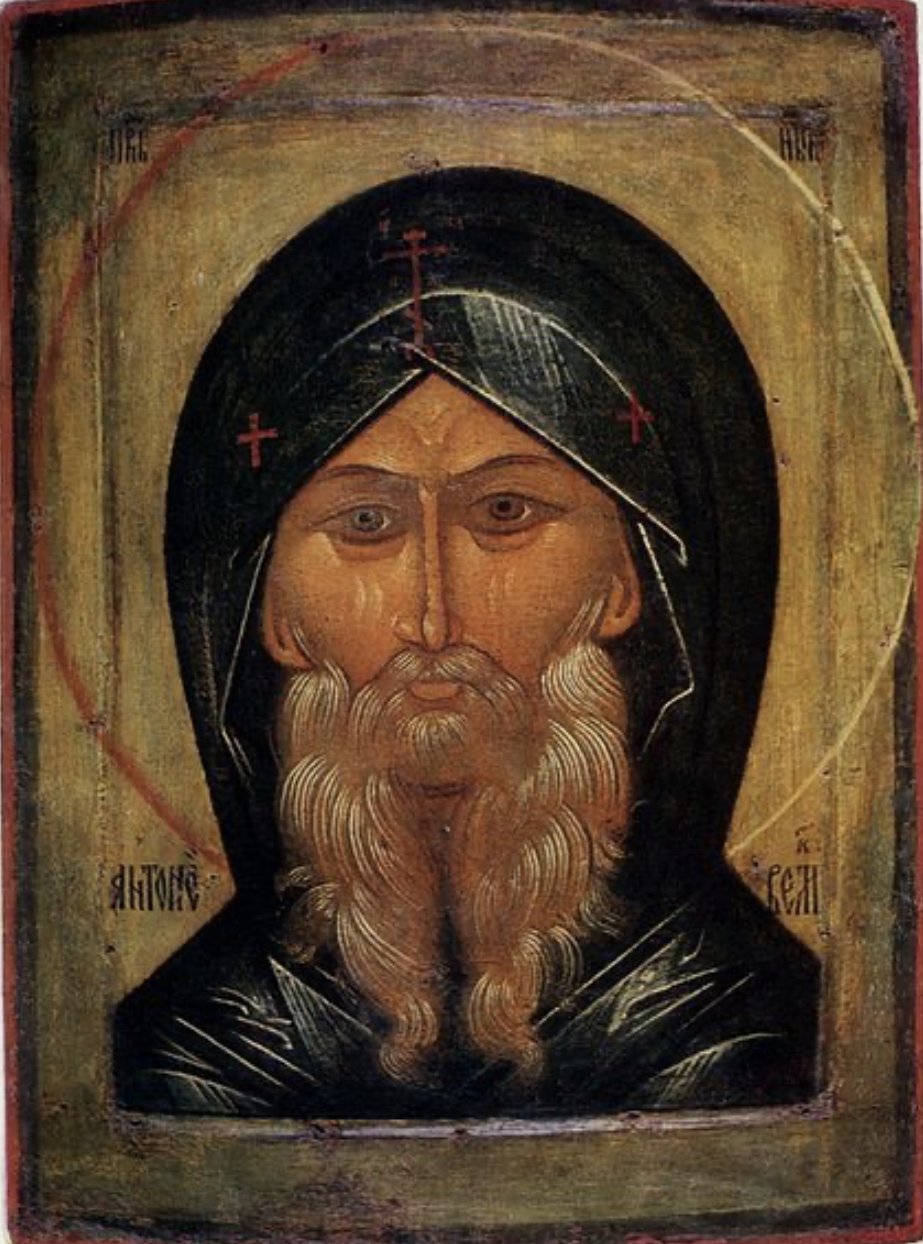
What is that light we see at a distance? What is that warm and welcoming fire we see in the night?
I wonder how often we ponder what our faith is amongst the many things in the world. Is it something we acquire? Is it something we add into the mix of our diverse lives? Or is it the only thing that is not an external? The Kingdom of God is our spiritual DNA. It is elemental, an essence, not an add-on. It is not something we can choose like a new hobby or acquire like a new car or a new house. No. It chooses us and from the beginning. We are made from it. It was the stuff from which Eden was created.
St. Basil the Great, in his masterpiece On the Holy Spirit (c. 360), wrote that we might cover ourselves with mud, yet a tiny chink in this thick covering reveals that under it is a creature made from Divine light. The mud is mostly all we see, yet it is not the thing. The light is the thing.
The darkness of the world, the flesh, and the devil may cover the earth, yet little circles of light remain reminding all who encounter them of what is basic and what is real and what will abide when the darkness is scattered. For it is the only thing that is. All else are externals.
Today we celebrate the feast of one who poured fire out onto the earth: men and women caught fire from it, following his example. And their love of God and striving for perfect life gave to the world the muscle and bone and sinews of the Kingdom of Heaven. Today we celebrate St. Anthony the Great, the Father of Monasticism. His life as a hermit turned out to be a great bonfire burning fiercely upon a hill. Others seeing it were inspired to set their own bonfires, tending them night and day, until the whole world might be alit with these little points of light. But they were not added to the world. They are the essence of life itself, a light that bravely refuses to consent to darkness.
As we offer up prayers of thanks to St. Anthony of the Desert, let us also return to our true selves. Let us light a bonfire facing out into the dark night. And let us tend it day and night that others might know that God is with us still, even to the end of the age.

We are so keen from the start to read the Gospels allegorically and tropologically, that we lose sight of the literal, or historical, meaning. On the surface, the entire reason for Jesus' three-year ministry is to visit the Twelve Tribes of Israel bringing with Him the twelve kings who are to govern them rightly, who are to lead them back into the family fold. Indeed, the Twelve have been chosen precisely to effect this restoration:
|
These twelve Jesus sent out and commanded them, saying: "Do not go into the way of the Gentiles,
and do not enter a city of the Samaritans. But go rather to the lost sheep of the house of Israel. And as you go, preach, saying, 'The Kingdom of Heaven is at hand.' Heal the sick, cleanse the lepers, raise the dead, cast out demons.'" (Mt 10:5-8) |
We have reflected on the visit to Gad at length. But we have also seen them in Judah and Benjamin, where they nearly are stoned and imprisoned. We have seen them in Asher with its notorious cities, Tyre and Sidon, and in Dan, where the Jordan bubbles up in cool springs at its headwaters, where Jesus asked, "Who do you say that I AM."
This morning we read of their arrival to the historic tribal kingdoms of Naphtali and Zebulun, associated with the towns of Capernaum and Bethsaida. As this most vivid encounter unfolds, let us return to our wonted interpretation of its allegorical and tropological meaning. Is this not also about us? Does not God with His Holy Spirit and guiding angels also attempt to lead us back to our own original state? All we need do is receive them and be be healed. Sadly, we look at the world around us and see in astonishment that most of our neighbors, our families, and those we don't know prefer the life without God. Our culture is full to overflowing of ungodly films, television, magazines, and websites. Laws begin to appear forbidding us to object. Our public schools have long been about the process of indoctrination.
Never lose sight of the truth: the real battle is always between the hoggishness of the body's desires and the crystalline beauty of the cleansed mind and soul. Join us at the Hermitage as we take in this vast and consequential struggle. At stake is our own lives, the children now being born into the world, and everything we know.
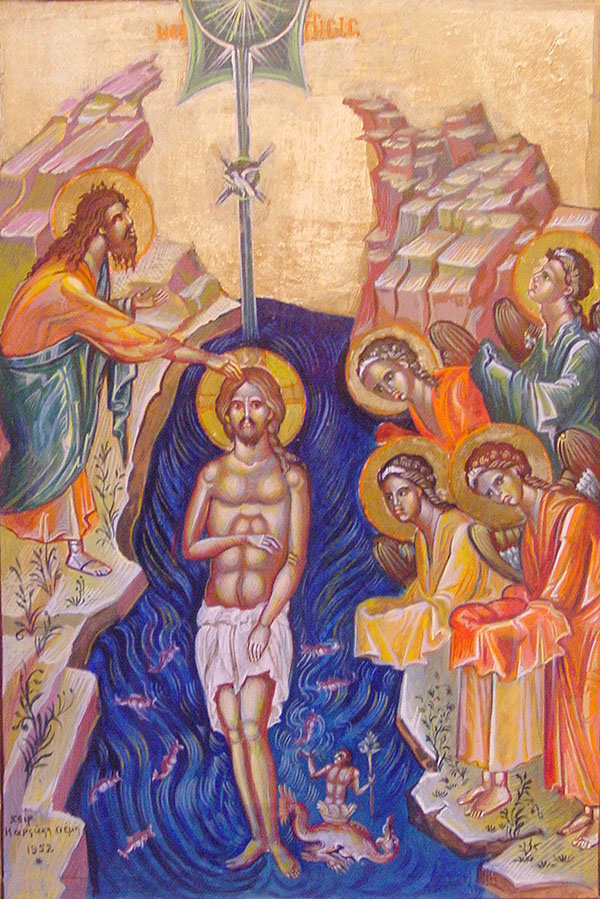
The waters are dark and deep, a churning chaos as at the primordial beginning, before the Spirit of God hovered over the void. The Holy Scriptures warn of the danger of the chaos. Fishing boats are shattered with a single slap. Entire armies are extinguished with one stroke. The sea rears up with is monstrous face — of Leviathan, of Rahab — and who shall master them .... if not YHWH? It is YHWH who leads His people through the chaos, Who baptizes them in cloud and sea (1Cor 10:1-2), Who guides them into a life of fasting and prayer in a wilderness and then Who confers new life betokened by a Promised Land, dripping with honey and milk.
All of this was reenacted with each baptism in the Early Church. With the Baptism of Our Lord and Savior Jesus Christ, the world is created once again — the Heavens opened, God the Father, the Holy Spirit, and the Logos of Creation, once more hovering over the waters. A voice is sounded. It is the vibration of new life and of a world created anew.
Please join the Hermitage as we recount the stories of old that are new — as new as each life plunged into dangerous waters stripping away the old, putting to flight demons, and making tender a heart which was made for God in the first place.
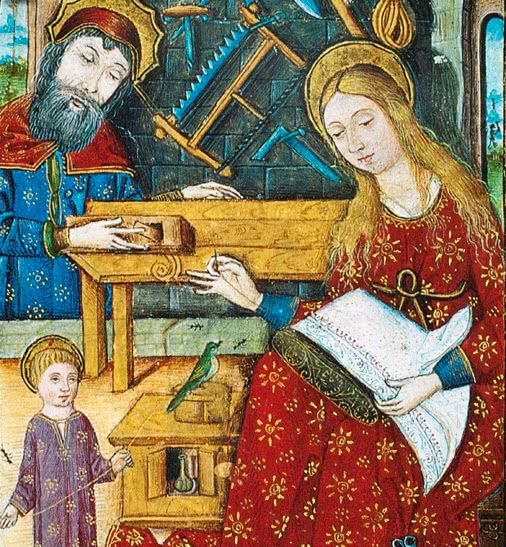
We celebrate this morning the Circumcision and Naming of the Lord, Our Savior Jesus Christ, which the whole Church observes on January 1.
As we begin a new year, we continue to live through a vast evil unprecedented in its scope and scale. Federal and state governments approve it: the murder of 800,000 children in the U.S. each year. By the end of the coming year, this ocean of blood will have grown that much deeper and redder.
This evil is not perpetrated from without but rooted in the hearts of young men and young women. They do not sit around dark tables of plotted strategms to do this. Rather, the conversation in their mind has led them into a monstrous interior world of which they are not fully aware. The Hermitage, therefore, reaches out to these hearts and minds in hope of changing that interior conversation. Please receive today's reflection in that spirit, which is one that intends caring and helpfulness.
The renovation of our human lifeworld might have been effected in many ways. God might have changed the landscape as he did with a whole new world to the East of Eden. He might have chosen to begin all over again as he did with generations of Noah and his family. He might have sent hosts of angels in the tens of millions to effect a guided conversion of hearts. Instead, He began this great work with the birth of a Child, Who was Himself. In this cosmic act, offered in a fragile and vulnerable and helpless infant, He forever conferred upon childbirth itself an unsurpassed dignity.
Is it not so that every child born into the world has the power to take away the sins of its mother and father? Is it not so that every infant is a salvation to those around him or her, a light-bringer, a world of purity and innocence and beauty? Is it not the infant that continues to renew our world with all that is good?
Please join us this morning as we reflect upon the wonder of new life.
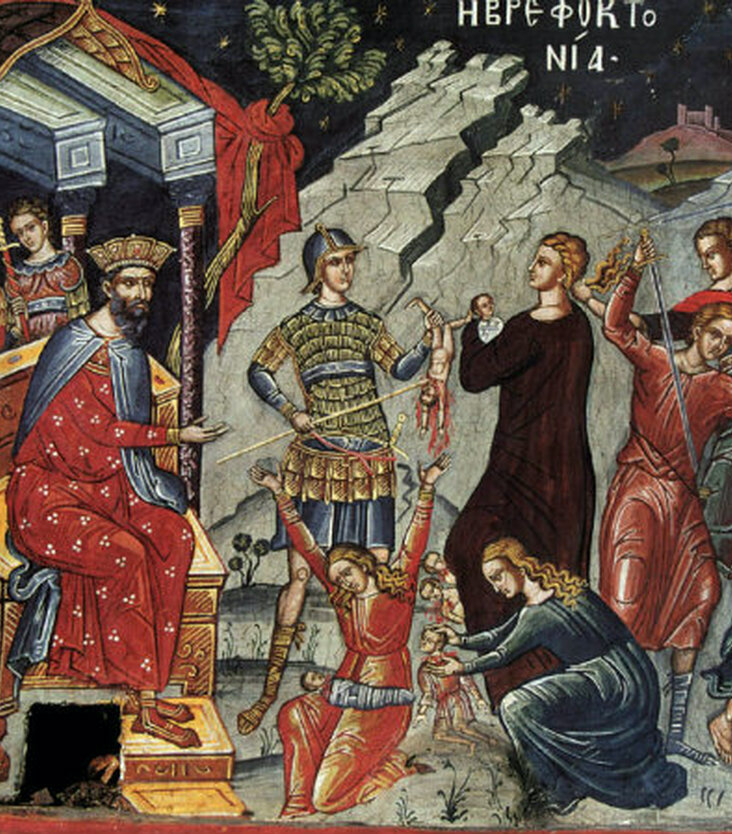
We, of course, are right to grieve the murder of 14,000 tender children, aged two and under, in a mad king's paranoid attempt to secure power. Murder was Herod's instrument of choice assassinating his wife and three of his own sons. Macrobius (Saturnalia, Dicta 56) relates that when news of this act reached Augustus Caesar, the Emperor replied dryly (quipping in Greek), "So it is better to be Herod's pig (hun) than his son (huion)." But this is nothing compared to the enormity in which we all participate in the U.S., where more than 800,000 unborn children are killed with the approval of our federal and state governments. I know I beg the question by using the term children, so bear in mind that unborn children, aged sixteen weeks, already have favorite songs (so long as their parents sing and play music for them while in the womb).
For the Hermitage this is deeply personal. One of the Sisters here over the course of twenty-five years, with the help of key associates, developed a small outreach to become the principal NGO of Southwest Haiti — a lifeline of medical care, food, education, and clothing — to a quarter-million people annually, known as the Haitian Health Foundation (HHF).
She (and not the HHF) was given the gift of $1 million dollars (worth > $2 million today) to use in any way she saw fit. She built a "Center of Hope" coming to the rescue of unborn children, who often died as their mothers came out of the hills on foot in a desperate attempt to find help during the final weeks of their pregnancies. Suddenly, we who served this ministry, organized as a 501(c)(3), were informed that a new CEO had taken over. She suppressed our chapel and ordered the removal of crosses and crucifixes throughout our campuses. She appointed her friend as new COO in Haiti, a founder-director of Planned Parenthood of Southern New England. All the leadership who had built this institution resign within weeks. I appealed to the local bishop as the Roman Catholic Church held deed to our building parcels. Soon thereafter the Roman Catholic health system that provided our medicines contacted us to learn why their medicines would no longer be needed.
The evil one depends absolutely upon our silence. He is rarely disappointed.
May the flinty Prophet Who is our God have mercy upon us! Yes, He is merciful, but He is also clear-eyed and unerring in His justice.

Picture them crossing desert wastes, which is what you find as you head south and west out of Jerusalem, passing down toward Jericho, and then entering into the rocky, sterile terrain around the Dead Sea. Ahead is the forbidding wilderness of the Sinai Peninsula. Today the trip from Jerusalem to Cairo in a car traveling 40 MPH would take 44+ hours. Of course, the car might need to rest every seven or eight hours with temperatures soaring up to 114° F. and dropping below freezing at night. What a curious sight they would have made: the elderly Joseph; the athletic, young son, James; the teenage mother, Mary; and the tiny infant, Who was God. The whole span of a human lifetime could be seen in them: from new birth unto aged decline and death and thence to eternity.
Joseph had told the High Priest in the Zion Temple that he did not want this. He was too old. He winced at the idea of betrothal to a Temple virgin .... even for purposes of guardianship. Yet he bowed when the priest exclaimed, "Have you no fear of God?!" For certainly God had chosen him, not another, but him.
Our unlikely hero is a hoary-headed Odysseus traveling through far-flung and dangerous lands, imposing his stooped and aged frame between the little dove, Mary, her helpless, fragile Son, and every peril they might encounter. Indeed, they were being hunted down like criminals by men with blood in their eyes.
Let us remember Righteous Joseph on days when sickness and age weigh us down knowing that God continues to call us, even to need us, as we also must face a forbidding, even dangerous landscape .... and within the borders of the United States. Who could have predicted the world we now see? Nonetheless, we press on, no matter the burden, no matter how depleted we are. For Righteous Joseph feared God, loved God, and never looked back. We too bear a most precious figure, through a world increasingly hostile to Him, even Christ the Lord.

His birth was most obscure and most remote .... somewhere, afar off, in nameless fields among shepherds. Shepherds were the outcasts of first-century Palestine: shiftless, unreliable, dishonest, suited only to be pushed off to the margins entrusted with no more than sheep. Meantime, angels sing above in polyphonic harmony — signifying the concord of discord. This is the irony of angels: always present, seeing plainly the reality that nearly always escapes us.
Somewhere in this swirl of stable's dust mix particles of the mortal and the Divine, of the dying and the deathless, of the polluted and the pure. For this is our life. And into a Savior is born, Who turns out to be no less than God. Let us take our humble place in this chaos-made-orderly, into this filth-made-pure, into this dying-made-eternal. Let us seek always to be with Him and His outcast parents and the pariah shepherds facing the world that rejected them. For here is our only hope and peace and good.
On this Silent Night, let join with one another and commit ourselves once again to the only things that matter and the only things that last.

On his earthly birthday, October 19, we shared how wonderful it was that his mortal life should be graced both by earthly marriage and the Heaven-on-earth which is the vocation of prophet. Both are balm to the soul. Both are consolation to a life that strives. Both are beautiful as the Heavenly must always be most beautiful. But to live out a Heaven-on-earth is to devote yourself to One Whom the world deemed an outcast at His birth. It is to love the One Who will not be loved .... though the failure of this love be the greatest among sins. It is to be despised as He was despised, to be stricken as He was struck, even to be killed as He was killed and continues to be killed in this greatest age of martyrs. Yet St. John of Kronstadt would not bow to this world. He would not compromise, not where Christ was concerned. In this he was our modern prophet of the Russian Orthodox Church, which is unflinching in her prophet-ministry. And as a greatest darkness fell over the Russian land, it was God's will that this beloved prophet should complete his earthly trials and to pass into the Light, which has no shadow, and embrace the True, which has no flaw. On your Heavenly birthday, we pray to you, St. John of Kronstadt, for we continue in your prophet journey, refusing to compromise to a world that descends ever more deeply into shadows and falsehood.

On our Island, much of the world outside the Hermitage boundaries is the cotton-candy world. We seek nourishment, but it is empty, even poisonous if you sample too much. We seek meaning, but it is meaningless. We seek love, but it is false. We seek security, but it is undependable. We seek permanency, but it is fleeting. We seek the real, but it is illusion. We seek life, but everywhere everything and everyone are dying. At the Hermitage we are fulfilled in all that we seek. But we do not say that ours is a casual or leisurely life. For here we encounter God. As the Letter to the Hebrews reminds us, to fall into the hands of the living God is a fearful thing. His Word is
| living and powerful, and sharper than any two-edged sword, piercing even to the division of soul and spirit, and of joints and marrow, and is a Discerner of the thoughts and intents of the heart. And there is no creature hidden from His sight, but all things are naked and open to the eyes of Him to Whom we must give account. |
For if you seek meaning, you must become meaning. If you wish the lasting and the true, you must become true. If you want the authentic, you must become authentic. As we draw near to the birth of the only truly True and the only really Real, prepare yourself. For you do not touch God's Holy Mountain lightly. And you do not seek the Face of God until you are ready to be discerned, even pierced unto your heart and soul.

Today, most scholars of the period see Daniel (his name means "God is my Judge") as being not a historical figure, but an allegory about the two-generation Exile of the Hebrews into the Neo-Babylonian Empire. But they do not know. Most certainly, King Nebuchadnezzar II, devotee of the god Markduk, invaded Judea. He plundered the Temple and its furnishings — the Ark of the Covenant with its two gold Cherubim, Aaron's rod, the Manna in the jar, the candlebra — as well as the choice youth of the Hebrews taking all back to Assyria with him. Among these was Daniel, who refused to be polluted by Neo-Bablylonian customs, food, or religion.
The composition of his Book tells it all. The courtly tales of the illusory world of Nebuchadnezzar are written in Neo-Babylonian (Aramaic) while the Counsels of God are written in the holy language of pre-Masoretic Hebrew as it the opening section.
When the Hebrews were returned to Judea, they were no longer God's people. They did not speak Hebrew, but Neo-Babylonian (Aramaic). Their Holy Scriptures had been heavily edited, including the Book of Ezra, written in Aramaic and containing Persian royal decrees. The furnishings of the First Temple had been lost.
Was everything lost, therefore? The ones who returned still faithful to the God of their fathers were not lost. Today, we celebrate such faithfulness in the person of Daniel. And on his day it is right to ask a question. Where is Nebuchnezzar and his idol Marduk today? They are gone, no longer reverenced or observed, much less worshiped. But our God continues to be loved, reverenced, and worshiped. Those who love Him and devote their lives to Him continue. And the opportunity to be among the faithful ones remains. This was the ground of their being.
Do not be polluted by the culture around you. Banish your television. Use the Web with care and discipline. Refuse to worship their new religion, seeing their false idols through the eyes of eternal God. And pray to "Daniel the strong" for his intercessions. For he will remind you, "God is your Judge." and this is our ground of being today.

For our Epistle lesson this morning, we read the Apostle Paul's Second Letter to his spiritual son, Timothy. Much of the passage was a sharing of the great Apostle's several burdens including the news that Demas has abandoned him because he loved the present age more than the Lord Jesus Christ (2 Tim 8:10). In God's good timing, we realize that this is the central question we must ask of the Prophet Haggai, whose calendar coincides with our reading.
One-third of Judea was exiled to the Neo-Babylonian Empire. Haggai was born among this group, likely in Assyria, and would become the foremost prophet urging the people to rebuild the Zion Temple. Can we say that the party who favored the Neo-Babylonian life and the consequent reforms of their religion loved the present age more than God? Certainly this question helps to clarify the murky world of 6th c. B.C. Jerusalem about which we know so little. We know that the Samaritans were strong for the pre-Exile, Hebrew religion. Their antagonism to the new men, practicing "Judah-ism" (the new religion that would be practiced in Judah) was equally strong. They did everything they could to stymie the project dreading to see this new religion, shaped by Neo-Babylonian overseers, practiced on the former site of Solomon's Temple. We read Haggai's book noting that he owns Darius to be his king. And we understand that not everything that appears in Holy Scripture is to embraced as holy — not the adulterous taking of Bathsheba nor the murder of Uriah, not Solomon's 700 wives and 300 mistresses and his worship of Molech to whom children were offered in blood sacrifice, not .... well, the list is long one. Holy Scripture is provided to inspire, to edify, and to guide. It leads us into rejoicing but also into grieving. It lifts us up to the heights of Divine inspiration but also edifies us concerning the foibles of men. It depicts whose who are beautiful in their faithfulness and those who love the present age. Holy is the prismatic fullness of our Sacred Scriptures! Let us see in them the condition of humanity and especially redeemed humanity .... redeemed by the God Who loves us and Who shall never forget us.
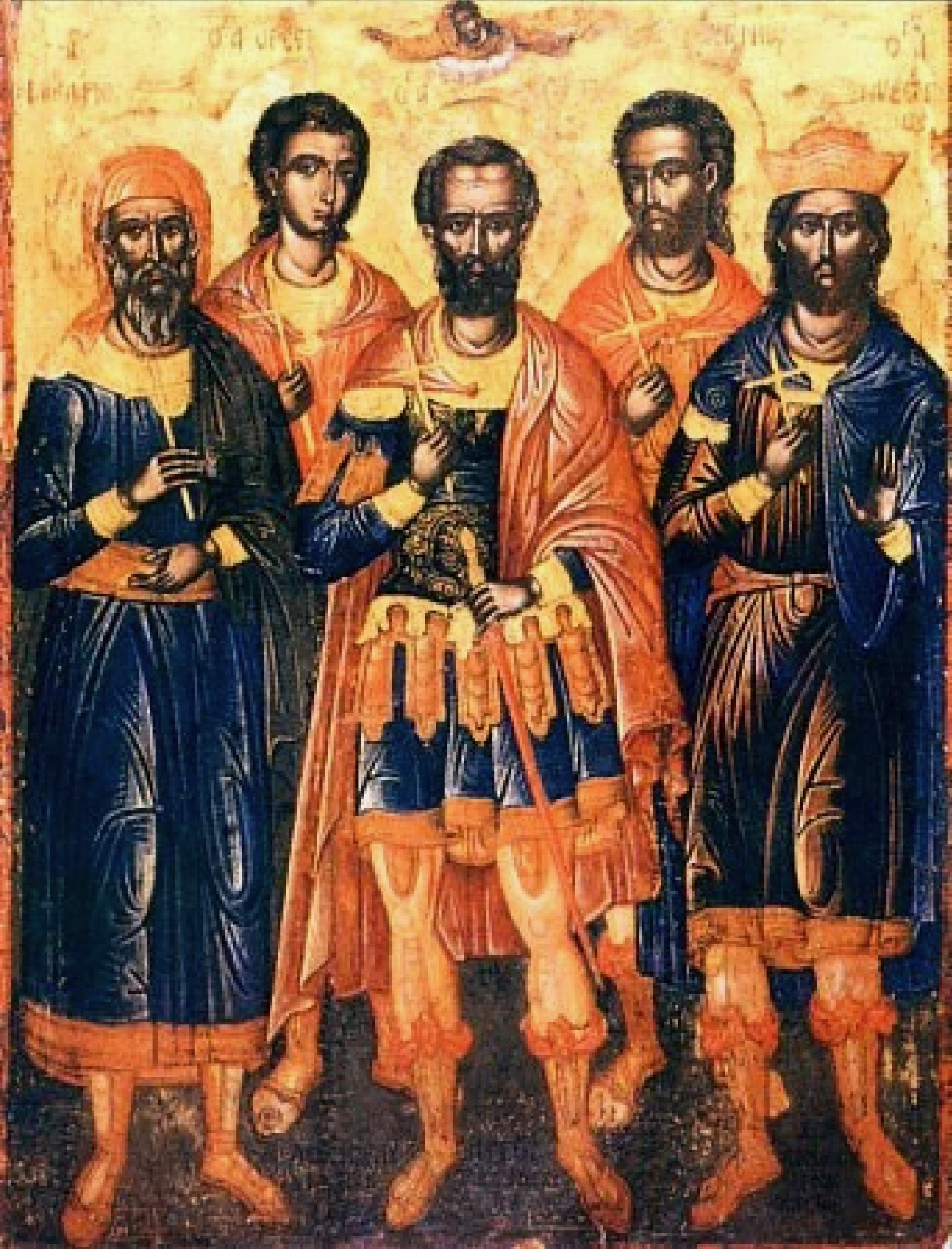
Martyrdom is not something that happens along the way, the price you pay for offending the world. That is not it. Christianity is fundamentally about martyrdom. This is its foundation and its essence. We must not quietly deprecate the Lord Jesus when He says,
|
"You will be betrayed even by parents and brothers, relatives and friends; and they
will put some of you to death. And you will be hated by all for for My Name's sake." |
The birth of Jesus was heralded throughout the historical Northern Kingdom of Israel with blood, and not just any blood: but the most heinous shedding of tender innocents with Herod's slaughter of all male babies. The earthly end of God-with-us reaches a climax in public torture and bloody execution. All of the Apostles were martyred, save one. And Christian vocation ever after has been conformed to the cross, which the Master has made a condition of discipleship (Mk 8:34).
The prayer we teach our children to say each night is fundamentally apocalyptic:
| Thy Kingdom come. Thy will be done on earth as it is in Heaven. |
To invoke God's Kingdom on earth is the definition of apocalypse. Read the Book of Revelation to see how history ends. At a time of God's choosing, His inevitable Kingdom descends upon a twisted world, hopelessly out of joint with God's mind and ways. The least gifted observer of the world scene today can tell you that God's ways on earth always meet with general rebellion.
Please join us at the Hermitage this morning as we take up our cross and you take up yours.
![]()
At the Hermitage we think of the Beatitudes as the "Proverbs of Heaven." They are bittersweet, for they are beautiful, certainly Heavenly, and like all Heavenly things on earth, dangerous. As I have shared in past years, one of the holiest priests I have known, an elderly man, said that his vocation began upon hearing the Beatitudes and then resolving that he would live them. He turned his most sincere heart to this daily pledge and practice until he saw that they were destroying him. Our former founder-father Francis of Assisi was destroyed in his attempt to live them. They are the Proverbs of Heaven. And, as every student of Divinity knows, Heaven on earth is an apocolytic concept.
Not the least among these remarkable sayings is this one:
| Blessed are the meek, for they shall inherit the earth. (Mt 16:18) |
In the works of Pindar, Heroditus, and Aristophanes this word πραεισ (praeis) is used to distinguish a wild animal from a tame one. This is interesting, for it is precisely the powerful animal who nominally rules the earth. The Greek word for inherit is a precise legal term meaning "to take title." If the Beatitudes are the giving of a New Law (as the Beatitudes are often described), then this is strange new law, indeed. The meek, the mild, the gentle will rule the earth, not the powerful or the bold. In our time, morals have been consigned to "an invention of the meek to restrain the strong" .... from taking what is rightly theirs, which is everything (Friedrich Nietzsche).
On the Feast of St. Anna's Conception of the Most Holy Theotokos, we reverence her as being the holy mother of the Most Holy Mother of God. Let us ponder, then, all that is mild and meek and gentle. In icons of Anna and Joachim, they are seen gazing up to the Heavens with the hands raised in prayer, always in prayer, for prayer is the remedy for all conflict and struggle in their world. In some icons, St. Anna stands upon a serpent, and we wonder if she is even aware that she does so. We see her treading lightly upon the earth. Her mind and her heart live daily with God. Hers is a heart like unto His. Yes, He will entrust the Gate of Heaven, the new Holy of Holies, the Dwelling Place of God, to her.
![]()
Christmas for many centuries was the one time of year when the spirit of Christian charity touched everyone. All the normal rules were suspended while people expressed their good affection for each other without embarrassment. It was considered normal to send warm-hearted messages and expressions of love to neighbors in the annual Christmas card. And strangers could exchange warm salutations in the streets while strains of "Peace on earth, good will toward men" might be heard from roving bands of singers or distant brass ensembles.
Today, a spirited "Merry Christmas!" is apt to arouse anger or disgust. This does not have to do with ethnic differences but rather it is generational and cultural. Recently, a woman educated at the best schools, holding the M.D. degree, told me, "Let's face it. Christians are jerks, don't you think?" .... and this said to a priest and vowed religious.
Certainly, I am aware of the general assault on Christianity by people who think they are ushering in a wonderful new age, where taboos are broken down and boundaries are erased. But let us not forget the attack on the inside, too, in which Christians reject the good because it is not perfect. Mind you, out-and-out evil must always be opposed wherever it appears. But expressions of goodness being opposed because they lack the right pedigree? This does not help anyone.
Here on St. Nicholas Day, let us all pray for .... Christmas, however it comes. For if our children do not see kindness and goodness and charity of spirit practiced openly in the name of Christ, if only once a year, then what it is to become of everything we hold dear?
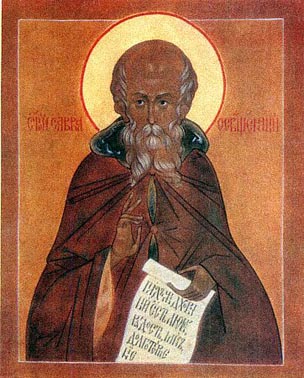
The monastery and the hermitage were the only world St. Sabbas (Sava) knew. He received his education from the Monastery of St. Flavian in Cappadocia at age eight. At age seventeen he received the monastic tonsure and found the life of fasting and prayer to be his natural element. Soon he discerned gifts of wonderworking. He came to the attention of St. Euthymios the Great, who would take him into the same wilderness experienced by Jesus and later by St. Mary of Egypt. They would go out on January 14 and remain until Palm Sunday. Following the death of Euthymios, Monk Sabbas settled in a cave near the Monastery of St. Gerasimos in modern-day Jordan. Soon other monks sought out Sabbas seeking holy life, a focus that pointed to his future vocation as founder father.
He would found several lavras. The great lavra of Mar Saba continues to the present day, half way between Jerusalem and the Dead Sea. St. Sabbas the Sanctified composed the first monastic rule for church service, to be known as the Jerusalem Typikon. The history of typikca revisions, mergings with other typika, and evolutions subject to local usage is a complex subject. Suffice it to say that St. Sabbas continues to touch us today in our own patterns of worship and prayers as the Jerusalem Typikon lies beneath all as a foundation.
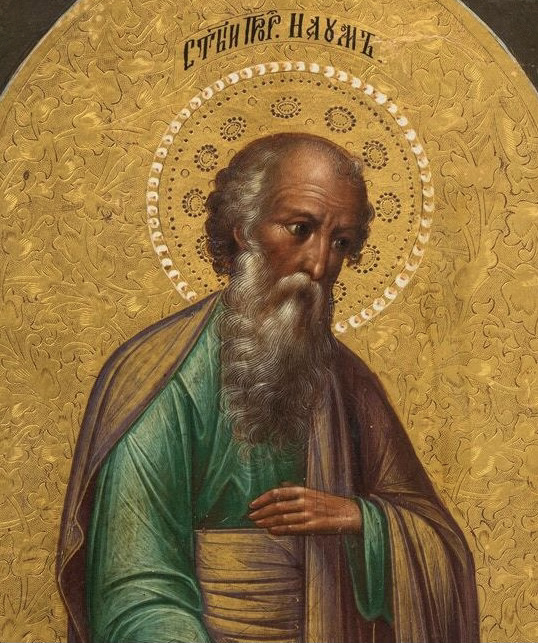
Nearly nothing is known about Nahum the Prophet save that he appears in the Bible. St. Jerome was the first to notice that he was from Galilee, which was confirmed by later commentators. Aside from this scant biographical information and (of course) his prophecy, nothing else is known. Yet, Nahum speaks deeply into our lives today, perhaps not so much in the content of his prophecy but what it says about the ways of God.
Nahum predicted that the kingdom of Assyria / Babylon, with its capital Nineveh, would be destroyed by fresh water and underground fire for her many sins and cruelties. As the historian Josephus recorded in Jesus' time, rising waters from nearby lakes did indeed destroy the low-lying areas of Nineveh, and fire from the wilderness reduced the upland areas to cinder and ashes. The geographer Strabo wrote that Nineveh "simply vanished."
When did this happen? One-hundred-fifteen years following Nahum's prophecy. The scientist of today, looking for material causation, would say that one had nothing to do with the other. But what do we say who know of God's long-suffering patience? Do we dismiss this, seeing the uncanny precision of Nahum's prophecy and the remote probability of fresh water and fire destroying a great city and all at once? Perhaps the most important part of this narrative for us has to do with God's justice. So many of us commit grave sins in God's sight, including the faithful, clergy, and monastics. They tell themselves that God permits these "little failings." They say in their hearts that God will understand. But this sort of mind rises no higher than the materialist who looks for immediate connection between his sins and God's justice. Before long this absurd conversation mocks God more egregiously than the grave sins that prompted it. We must always remember, as the prayers of Holy Orthodoxy attest, His is the All-seeing Eye, and His justice is unerring.
Pray for us, Holy Prophet Nahum, that we may heed your words spoken from the heart of All-knowing God. Amen.
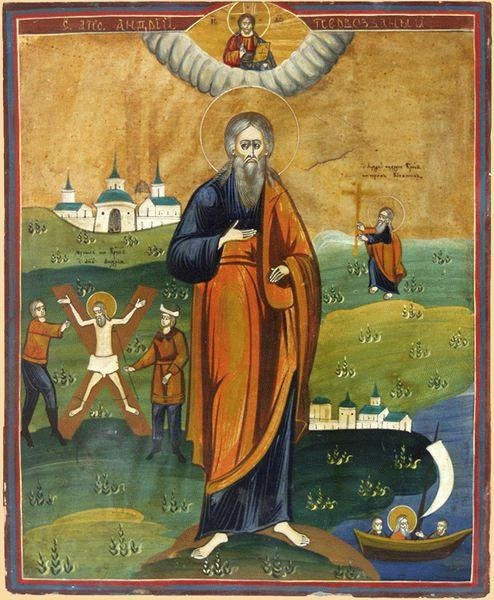
Who are our Christian ancestors? Many in the West assume out of hand that they were Roman Christians of one sort or another. But that is not true across the board. It turns out that our earliest Christian ancestors, at least among English-speaking people and those in modern-day Ukraine, Russia, and environs, were migrating Scythians who become known variously as the Galatians, the Gauls, and the Gaels. They landed on the Atlantic coasts of Ireland, established monasteries, and then, by the sixth century, would oversee a vast mission centered in monasteries, such as Clonard, Iona, and Lindisfarne reaching from the Atlantic to the English Channel. At its zenith Clonard was said to have attained a steady state of 3,000 monks at any given time.
This is not fancy, nor is it pious legend. These are hard facts based on the best scholarship presently available and, notably, upon genetic evidence presented in 2015 to the National Academy of Sciences in the U.S.
Join us on this, our Founder Father's feast day, and let us page through the family album, such as a brief reflection will permit.

A holy ambassador appears before us this morning. She is an emissary from a suffering world. This world also goes by another name: the Kingdom of Heaven, the world where the suffering world is always meeting with the Suffering Servant, His angels, and His saints. The Lord touches these suffering people. And in that touch He ushers them into a love of unimaginable intimacy and abundance of life. The word we use for this intimacy is indwelling.
We commonly receive glimpses into the indwelling of God. For God has instructed us with a Divine property He has left on the earth, intended to be a window unto Heaven. We call this property love, which as St. John the Theologian has instructed us, is the light that shines in darkness, even life itself.
Each morning in our Eucharistic celebration, we say that we seek this very love and indwelling, that we might dwell in Him and He in us. We yearn for it with our every sinew and nerve. For without it, we shall always be lonely, separated, and heavy with the weight of the dark world. But how we do receive it? How might this indwelling become a life-giving light within us? Attend! The ambassador approaches. She shuffles across the earth in her suffering. She knows.
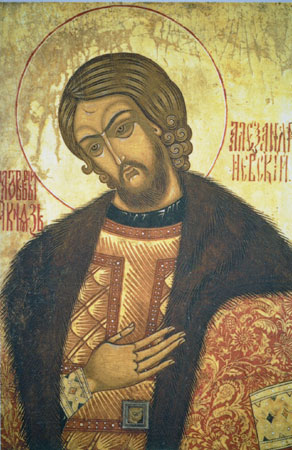
As a boy, growing up along the boundary between Monmouth and Ocean Counties in New Jersey, I was aware of a large population of Russian, Ukrainian, Latvian, and Lituanian peoples to the West, away from the coast, where the terrain suddenly turned into farms and, in many places, still wilderness. Dotted throughout this area were the homesteads and little farms of these Baltic and Slavic peoples. In high school I worked for Ulo Polikarpus with his sons Keido and Viido, Estonian stone masons. They were quiet men of enormous strength and stamina. I became aware of St. Alexander Nevsky parish in Howell, New Jersey — today a cathedral of the Russian Church Outside Russia, that Church whose vocation was exiled suffering in "the desert" preserving "the sacred scrolls" of the Russian Orthodox faith. I would learn that Alexander Nevsky ("victor at the Neva River") was not an ascetic hermit nor a wonderworking bishop, but rather a medieval prince who had suffered under the never-ending burden of rebellious nobles and invading armies — from the Roman Catholic north in Sweden, from the pagan darkness of Finland, from Norwegians in the northwest, from papal armies of Teutonic Knights invading from Germanic territories, and from the east as the Golden Horde swept into Rus' with its scorched-earth rage. His own brother betrayed him, making alliance with Sweden. Alexander Nevsky would die humbling himself before the Tatar Khan. Facing impossible odds from his birth (fourth in succession to his royal father), he, time and again, became savior to Russia, as a ninteen-year-old general, as Prince of Novrogod, Grand Prince of Vladimir, and Grand Prince of Kiev, traditional capital of Holy Rus', preserving unity and protecting his people from merciless invaders.
In these mysterious people to the west of my hometown, who had sought safe harbor in the Pinelands of New Jersey from the fury of Bolshevism (100,000 Russian Orthodox priests murdered), I saw humility, suffering, hard-scrabble living, and hard work. Interlaced through this, I saw their beautiful faith and devotions, expressed in exotic churches with gold domes and "star-led wizards" (Milton) attired in silver and gold vesture and wearing miters.
Historically and today, their story has never been one of simplicity, orderliness, and happy endings. While the United States lost 400,000 men in World War II, the Soviet Union lost 30 million. These humble people understand well-enough the dark chaos that invades the human soul and "the rag-and-bone shop of the heart" (Yeats). When I arrived to Haiti, a great relief swept over me, for the lie of "life in the bubble" and "first-world suffering" such as lacking the right smart phone were finally behind me. As a priest of the Russian Orthodox Church Outside Russia, I take some of that same relief. For my adopted homeland, Holy Rus', is grounded in humility, embracing suffering as a spiritual essence, and its face is St. Alexei Nevsky, who took the vows of the Great Schema before he died at age forty-two and who had accepted impossible odds at every turn.
Here are the words of His Eminence Metropolitan Hilarion, First Hierarch of the ROCOR:
| As sons and daughters of the Russian Orthodox Church, we are all citizens of Holy Russia. When we speak of Holy Russia, we are not talking about the Russian Federation or any civil society on earth; rather, it is a way of life that has been passed down to us through the centuries by such great saints of the Russian Land as the Holy Great Prince Vladimir and Great Princess Olga, Venerable Sergius of Radonezh, Job of Pochaev, Seraphim of Sarov, and more recently, the countless New Martyrs and Confessors of the 20th century. These saints are our ancestors, and we must look to them for instruction on how to bravely confess the Faith, even when facing persecution. There is no achievement in simply calling oneself "Russian": in order to be a genuine Russian, one must first become Orthodox and live a life in the Church, as did our forebears, the founders of Holy Russia! |
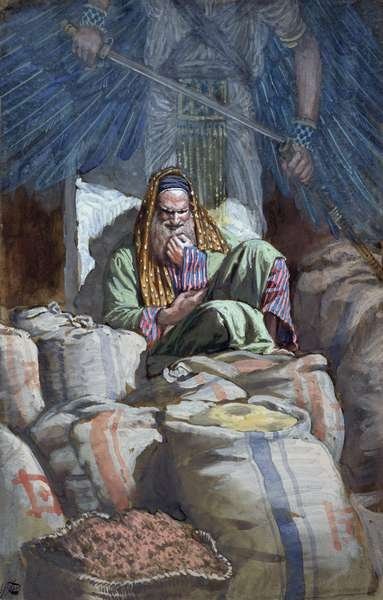
Our Gospel lesson is brief: five sentences. Over the ages, it has been summed up in five words: "Eat, drink, and be merry!" In this, it is diamond-like in its brilliance and density. So much is said with so few words — from the few words spoken by the angel of death to the catastropic outcome for the farmer. Its concision is the more impressive when we consider that it sizes up and condemns our entire lifeworld as few other passages from Scripture do. For it is a touchstone for that master subject of our time: delusion. Is not ours the "Age of Delusion"? Can you think of another historical period which has given such free reign to fantasy and "avatars" and role-playing — delusions upon delusions of every kind and in every facet of life?
Please join the Hermitage as we step into the Funhouse. There will be twists and turns in the dark and surprises .... some of which may startle you even to the point of the incredible. But our reflection today is to be believed, rigorously credible .... but no less reassuring for that.
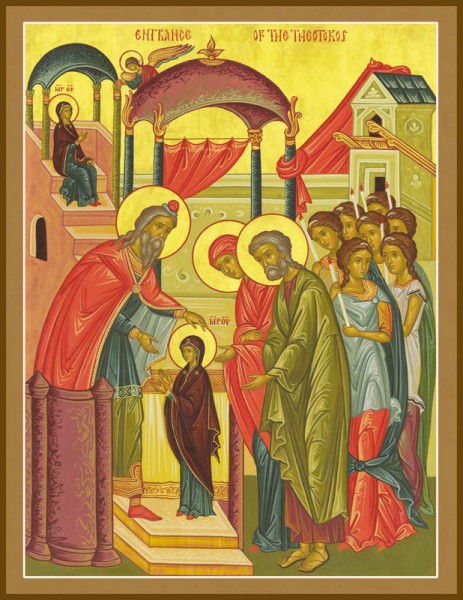
What is a Presentation? I wonder how often we think about this as a part of our own lives? .... indeed, that it is the one needful thing: it is the place where we meet with God. He has presented the greatest gifts imaginable to us: abundant life, the love that beats in our hearts, a world of beauty, and endless orchards and groves of fragrant and many-colored fruits. This is His Providence. And it is showered upon each one of us, as surely as a mother and father shower their love upon the child of their hearts and dreams. Our part is so small by comparison .... simply a sign or token of all that we have received, which is our presentation to them. It is the way a son or daughter says thank you .... knowing how a comely presentation of ourselves will make their hearts swell, even unto tears, for our thanksgivings and the beauty of our lives .... for which they had hoped from the first minutes and hours of our birth.
Please join us at the Hermitage as we look all around the Farm — a blessed plot under Heaven — and take stock. For each of us is a field and an orchard and a pleasant grove which God has planted with all the love and perfection of His heart. Take stock, for every day is a new Presentation.

As a publican, Levi-called-Matthew would have been one of the elite, a member of the Equestrian class just below the Senatorial class. Publicans were entrusted with overseeing great public works projects. He would have been honored in Roman society.
Remember, Alexander the Great had taken over Jerusalem in 332 B.C. Jerusalem had been occupied by his troops and then those of the Roman Empire for more than three centuries — a longer interval than the entire span of the American republic. Life among occupiers had become deeply woven into Judean life. Indeed, Judeans, in particular, owed their distinct identity to international power brokers, for their founding as a distinct ethnos, following the Babylonian Captivity, was done in cooperation with Neo-Babylonian overlords who underwrote and directed the reconstruction of their Temple.
We should not accept uncritically the old stereotype that as a tax-collector Levi-Matthew would have been a despised outcast. By Jesus' time, Caesar Augustus had long since reformed the famously corrupt practices of Roman tax collectors. And many elite Judeans traversed a well-worn path to Rome establishing multi-generational friendships and alliances.
We would do better to see Levi-Matthew in terms of Josephus Flavius, a Jerusalemite who began by fighting against the Romans but who then became a distinguished Roman citizen. Levi was a pillar of Roman society who then sold all he had in order to follow a teacher from Nazareth. In that they both jealously guarded the ancient civilization of the Hebrews, we see in them a mirror image. Indeed, Josephus' writings formed an extended apologia extolling the ancient pedigree and deeper philosophy of Hebrew civilization versus (by his lights) an inferior Graeco-Roman world.
In Levi-Matthew's case, however, the transformation was to come full circle. For unlike Josephus, Matthew retreats from the international zone of Judea, rejecting altogether the urban, the affluent, and the cosmopolitan, a world so deftly navigated by Josephus. Like Jesus, Levi-Matthew was a Nazarene. His roots were not of the Kingdom of Judah, but rather the Kingdom of Israel to the North. His boyhood formation would have been more in the sphere of Mt. Gerizim than Mt. Zion. In choosing to follow Jesus, Matthew's metanoia consisted, first, in a return back into the heart of God's plan for the Hebrew nation. Matthew saw in the scattered flocks of Israel an image of himself. He heard the Good Shepherd's voice and knew it to be true. In that moment he walked away from a world following only Jesus.
Truly, all around us the flocks of God are scattered. In observing St. Matthew's feast this year, let us be guided by this Apostle and Evangelist. Walk away from the urban, the affluent, and the cosmopolitan. Put away the smart phone in a drawer, turn off the laptop, face the television to the wall, and devote time "in secret" with our Father Who hears us in secret (Mt 6:4). Transformation begins in small things and continues there. For the striving after God is a war of the heart, the seat of our love. And spiritual warfare blazes in the quiet precincts of the soul and the mind, unnoticed by the world (perhaps) but epic in scale to the eyes of Heaven.

Set before us this morning is a plainly sectarian story. In our own time it might begin, "There were three men: a priest, a rabbi, and a Methodist minister ...." But it is no joke, for Jesus lays before us one of the most important aspects of the Gospels: the great boundary between two civilizations, two religions, and two eternal destinies. This is not mere historical background — as if we could just pass over these "footnotes" in our reading, study, and reflection. We dare not ignore them.
The Gospels are always laying before us archetypes, "the types and symbols of eternity" (Wordsworth), going to the foundations of our souls and lives. We do not stretch to say that the kernel of our story today occasioned the Advent of God into human history. We are forced to ask basic questions. Who are the Lost Sheep? They are those who have lost their connection to God (literally in the case of the Samaritans). And exactly what is this connection? It is a Way, called The Way in the first century AD. It was a Way first expressed in Eden, inaugurated again in the generation of Noah, then begun again with the carving out of a Promised Land. It was ritually commemorated and enacted in the First Temple during the eleventh century B.C. The ultimate aim is always the same: transformation of mind and soul unto resemblance to our Creator. It continues to be open to us.
Where does this boundary run through our own lifeworld and faith? On which side do we find ourselves? What is at stake here? All of this plays out before us this morning on a rocky road to Jericho. The players here are few but include all that is necessary to tell this tale.
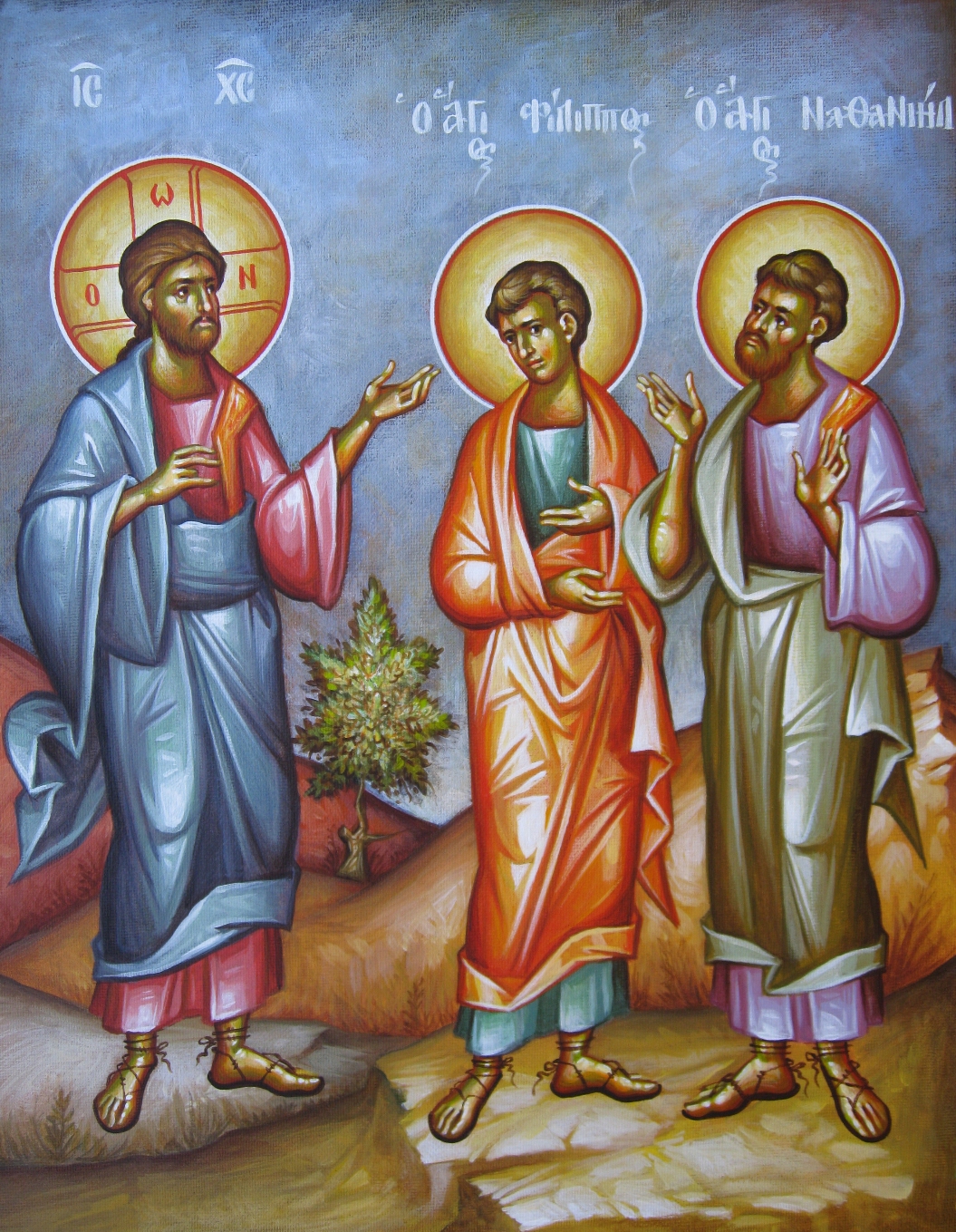
"Here is an Israelite indeed, in whom there is no guile!" (Jn 1:47). How many years passed before I had an inkling concerning these words. How many years went by before I realized that nearly all of The Twelve were from the Hebrew lifeworld of the historical Northern Kingdom, largely untouched by the Aramiac, Neo-Babylonian lifeworld that defined the historical Southern Kingdom, coterminous with the tribal area of Judah. The lone exception was Judas (var. of "Judah") Iscariot, reared in Judah-ism (Judaism). Jesus sees Philip and his friend Nathanael as Israelites, friends from Bethsaida. They are not Jews. They come out of an entirely different lifeworld — one that points back to Abraham's first conversations with YHWH, to the Patriarchs after him, and then to the spirituality of Mt. Sinai, the Tabernacle, and later the First Temple.
Philip and his friend Nathanael are figures who can unlock the Scriptures for us. They can be companions whose touch coincides with scales falling from our eyes. Along side them we might have eyes that see and ears that hear.
Pray for us, St. Philip, that we too might be cleansed of unwitting deceptions.
For more on this subject, please read (or listen to) "From Nazareth," Sunday's weekly meditation.
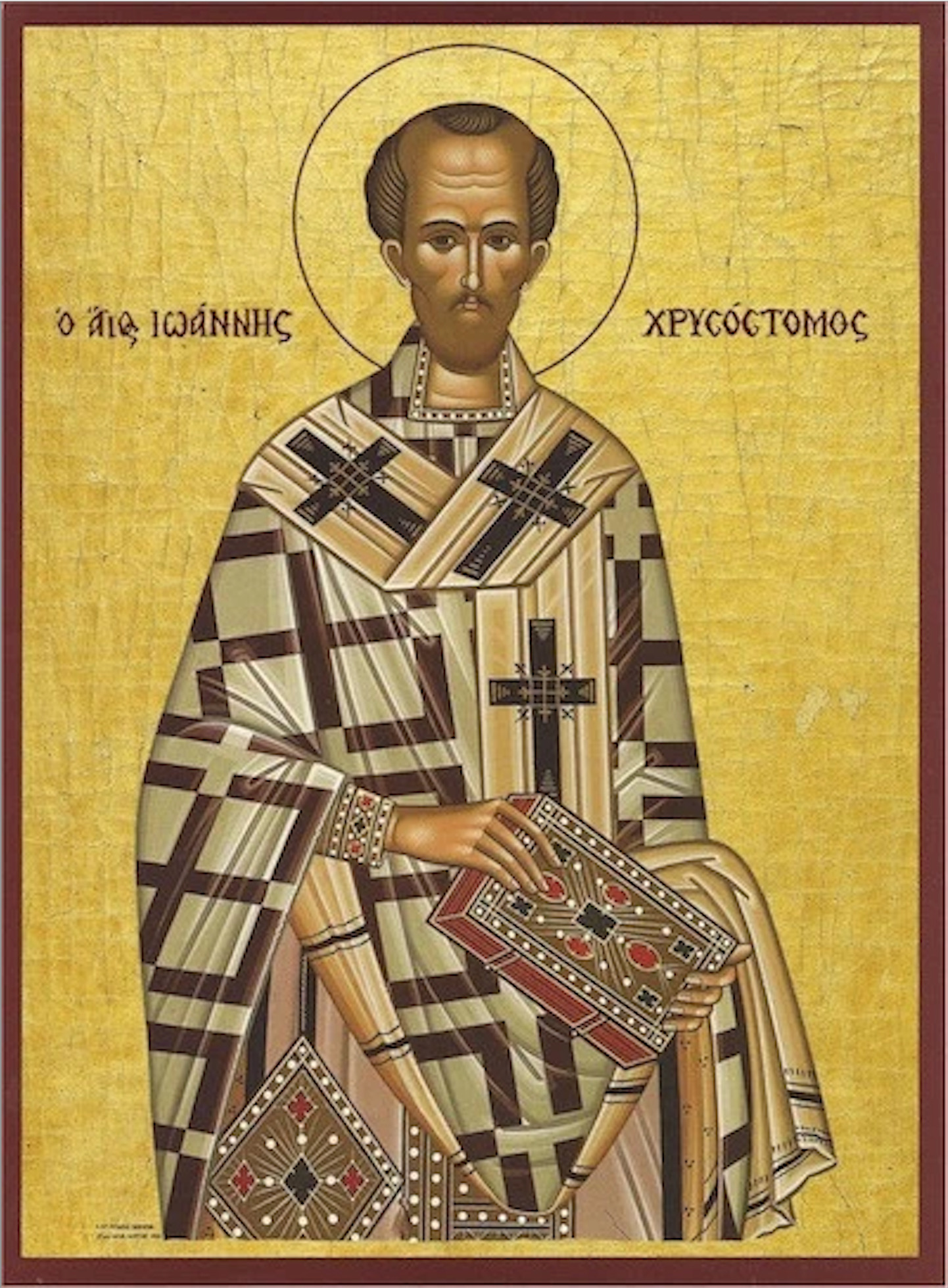
Today we celebrate one of the Three Ecumenical Hierarchs of Orthodoxy, St. John Chrysostom. From the beginning God destined him for the office of Patriarch — born in one of the great Patriarchates, Antioch, and beloved by its archbishop, Melitios, who painstakingly trained him and then later consecrated as Archbishop of Constantinople. Nonetheless, in his humility he shunned ecclesiastical preferments. Sensing plans to elevate him to the episcopate, he helped to consecrate his friend instead, St. Basil the Great, and then fled into the wilderness practicing a life of rigorous asceticism. Who could doubt that he was trained at the hands of angels? For there he wrote the masterpieces, Against the Opponents of Those Attracted to the Monastic Life (three books) and the collection, A Comparison of the Monk with the Emperor (or, Comparison of Imperial Power, Wealth and Eminence, with the True and Christian Wisdom-Loving Monastic Life. Just previous to these, he had completed Six Discourses on the Priesthood. His titles are too numerous to list in so short a space. Other than Origen, he was the most prolific among all Greek Fathers. His Paschal Homily is proclaimed each year in every Orthodox cathedral, temple, monastery, and hermitage in Christendom. Of towering importance, his are the inspired words that surround the appearance of the Lord Jesus among us in the mysteries of the Eucharist: The Divine Liturgy.
Pray for us, St. John Chrysostom, for the world of your writings reveals the same burdens and shames that we face today, which you understood with such clarity and eloquence.
The icon we share today was given us by Mother Melania of Holy Assumption Monastery (Calistoga, CA) while the Hermitage was yet a Franciscan religious house. We understood it to be a holy invitation at that time, and we see it today as an image of our gatekeeper into Holy Orthodoxy.
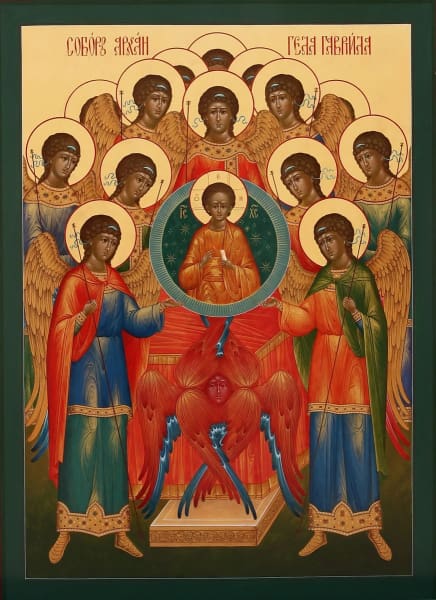
What would a world without angels look like? It would be a dark and gritty experience, a world ordered finally and irrevocably to disease and death, for that is what the all-body world always must be. Where Heavenly influence is gone there is only cold darkness. All of our bright spots — our joy at the birth of innocent children, our feeling of renewal at the first stirrings of spring, the holiness that stirs within us at first light — would be gone, for all of these are stirrings of the soul and participation in Heavenly life. Angels are ministers of this light, of this pure and good spiritual realm. What would a world without them look like? We do not have to wonder very long: are we not on this path now, when talk about the soul or the spiritual life has been nearly banished altogether? How many people, can you say, speak with, pray with, and commune with their Guardian Angels? Surely, each of us has been accorded this holy company. Has this not become forbidden behavior? Is it not true that a vast multitude on earth today are too embarrassed to speak openly about their soul, the Kingdom of Heaven, and the bright presences among us whom we call angels? .... may even fear reprisals for doing so?
Please take your ease at the Hermitage this morning as we banish those feelings of embarrassment. Let us cast our minds and souls, without fearfulness, on the angels.
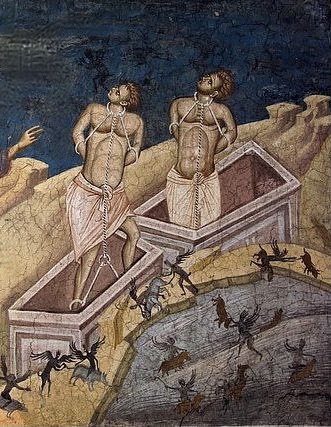
The elements of our faith begin at the beginning: the Breath of Divine Being, the Logos, creates all things "and without Him nothing was made that was made" (Jn 1:3). All things partake in His Divinity, and the whole Creation stirs in goodness animated by Divine Fire. He then sets a Signature upon the Masterwork: His Own Image expressed in the form of human creatures. Here is perfection: an ineffable balance of the noetic and the material, of the spiritual and the physical, of soul and body .... and one more necessary element: freedom. For without freedom the magic of living beings suddenly collapses into the dead and the robotic — mere puppetry. The essence of our Creator's living art, then, is Eden .... lost through human choice.
Think of the range of human choice. Humans might choose for the all-noetic becoming purely spiritual beings or the all-body becoming more a gross clod of earth than an angel. Perfection lies in balance: the lightness of Being Personified in the Creator, Whom we call the Christ, Who insists on the royal dignity of the Body by resurrecting His own (Jn 20:27), yet is He Divine, the highest expression of Spirit (Jn 4:24).
Our faith, then, must always center on the return to Eden, the perfection of this balance. When Jesus is sent to gather the Lost Sheep of Israel, He continues a process that began with the formation of the Land of Promise and the setting apart of a people to recover Eden — God's ideal for human life.
In our Gospel lesson this morning, we witness the only instance of the God-man visting an ancient Tribe of Israel, the Land of Gad. There He encounters the anti-Eden: a culture of death, not of Divine Life. And the Gadarenes exercise that most sovereign of human gifts: freedom. They repeat Eve's choice to reject God and God's ways, choosing instead gross living and the demonic.
Please join us this morning as we travel to a geography that is both past and future, depending on how we choose. There is much to learn here among the ancient Israelites.
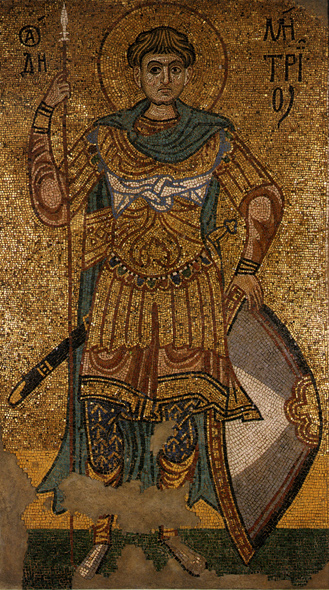
Along with St. George, St. Demetrios is one of the great military saints of the faith. Born into the Senatorial class, he rose to the high rank of Proconsol of Thessaloniki He was martyred in 306 during the persecutions of Galerian suffering a martial death — run through with many spears.
Experience of St. Demetrios in subsequent centuries reveals him not to be meek. He is credited with protecting whole cities and of saving entire armies. When his relics were dismissed by an archbishop of Thessaloniki as being counterfeit, they began streaming with myrrh, giving rise to his name, Myrrh-gusher.
My spiritual father, Metropolitan Jonah (Paffhausen), tells a story of his pilgrimage to the Holy Mountain suffering a fatal setback. "The second day, I went to the Cathedral of St. Demetrios, to venerate his relics .... in a great silver sarcophagus .... in the center of the church. Walking into that huge ancient cathedral (4th Century), the grace and presence of St. Demetrios was overpowering. It was like he came up and introduced himself. I venerated his relics, and said to him: 'Holy St Demetrios, I need your help! My papers are messed up, and I can't afford to stay very long in this city!' Within a few minutes, the ladies of the parish came and took me to the parish hall, gave me lunch and sat and talked with me. They all spoke English. One of them came up to me and said, 'So you have troubles with your papers? My spiritual father is the Protos of the Holy Mountain. We can take care of that!' So she pulled out her cell phone, dialed the number, and gave me the phone; and so connected me with the Elder who was Protos of the Holy Community. All was resolved within 30 minutes. St. Demetrios is quick!
"So I went to the Liturgy in the morning (40 bishops serving!), and then took the bus to Ouranopolis, and the next morning, the boat to Daphne on Mt. Athos. It was a wonderful pilgrimage! But I had a sense that I needed to return to Thessaloniki. When I returned, I went back to the Cathedral to say thank you to St. Demetrios. He was still in the center of the church, the grace radiating from his sarcophagus. So I said, 'Holy St. Demetrios, thank you for the wonderful trip to Mount Athos. Now I have another problem. I need half a million dollars to put down on a new monastery. (Then I knew I'd gone 'native' and made a vow to the Saint!) And, if you get that money for our monastery, I will build a church in your honor!' Having returned to the monastery, we found a huge and beautiful new property. Within four months, through many donations, we had $500,000 in cash for a down payment! Thanks to the prayers of St. Demetrios."
We send warm fraternal greetings to St. Demetrios Skete in Spotsylvania, Va on this the Feast Day of St. Demetrios the Gusher of Myrrh and the giver of great gifts!
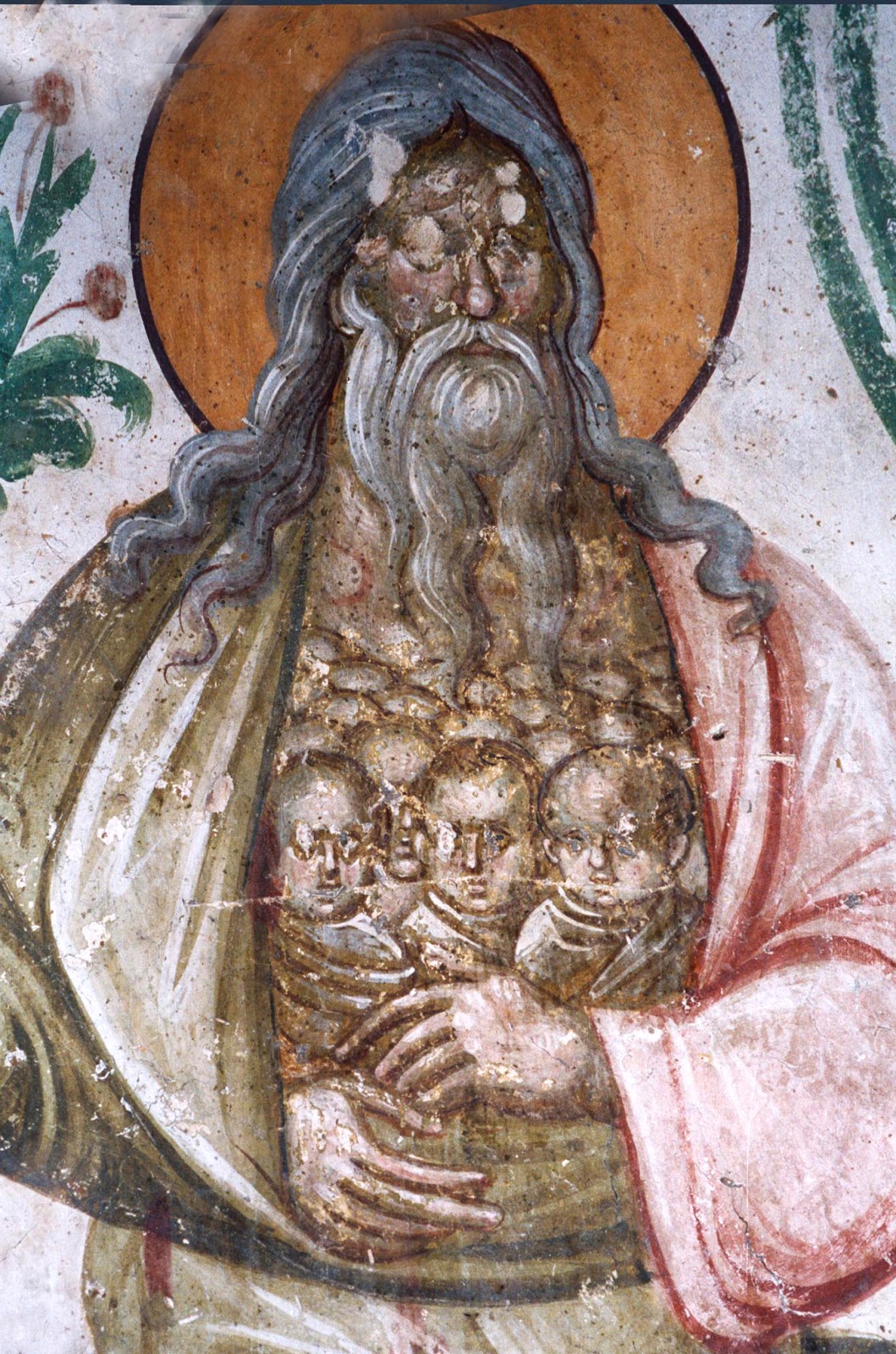
Bosom of Abraham — three words that have launched a thousand theological, spiritual, and historical ships. Christians for many centuries have taken our Gospel lesson this morning as the occasion for refining their maps of the afterlife and for making pronouncements about "Jewish belief." We do well to note that the phrase was never heard before Jesus articulated it (at least no other textual or archeological references of it have survived). How do we generalize then about "Jewish belief"?
This Sunday let us open our doors and windows and air out the places of our inquiry, our meditations, and our pronouncements. Today is a day to let in light and air and ask ourselves what we really know. It is surprising how much has formed us through the "particulates" in our air .... though we scarcely notice them. When it comes to our faith, though, these invisible yet formational particles are no small matter. They are decisive concerning what we believe and the conclusions we come to.
Please join the Hermitage in a little "Spring cleaning," for surely it is Springtime in Heaven.
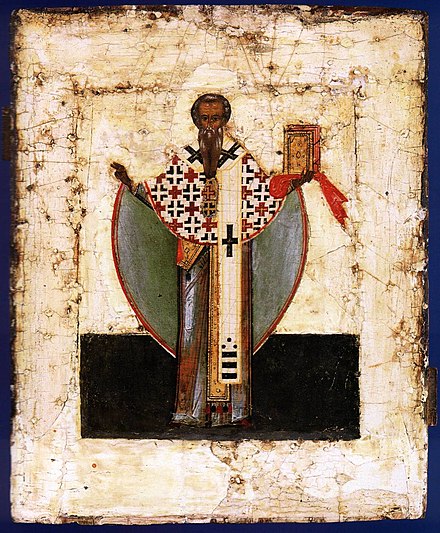
In the Protoevangelion of St. James, which the Early Church venerated as Scripture, we learn that Joseph's son, James, accompanied his aged father (aged by Iron Age standards) and his father's young ward Mary to Egypt together with Mary's Son, Jesus. We say "Mary's Son" because this extraordinary form of address, "Son of Mary" (Mk 6:3), in patriarchal first-century Palestine was almost unheard of. Was it an insult hurled at someone who had no legitimate father? Perhaps. Withal, this formula is certainly our best Gospel evidence that Mary was indeed the ward of Joseph and that James was Jesus' stepbrother.
James was a dutiful son and willing to support his father in the old man's Divinely-appointed late vocation as the guardian of God's Son (as we Christians would say). But James did not believe Jesus to be anything of the kind (Jn 7:5) but rather strange .... or even deranged (Mk 3:21). Soon enough, though, following the first morning of Pascha, James believed with all his heart, looking back and putting all the puzzle pieces together. He became renown for his intelligent sensitivity and spiritual wisdom, known as "James the Just" (not to be confused the Apostle, James the Less, son of Alphaeus). Like St. John the Baptist, James the Just was a Nazarite.
Following St. Paul's conversion on the Damascus Road, he retreated for three years into Arabia and then Damascus. At the end of this retreat he would speak with no one save Peter and James, the brother of the Lord (Gal 1:19). James the Just most certainly (along with St. Peter and St. John) was one of the pillars of the Early Church (Gal 2:9). He is accounted by tradition to be the proto-Patriarch of Jerusalem and presided over the proto-Ecumenical Council in Jerusalem (c. 50). According to Eusebius with the destruction of Jerusalem in progress in 70, James took the Jerusalem Church into exile in the Transjordan at Pella. It is noteworthy that James was succeeded by a series of Hebrew bishops in the see of Jerusalem. Paul describes James as being one of the principal figures who will lead the apostolate to "the circumcised" (Gal 2:12). As the Church is made of living stones founded upon the persons of Apostles whose ordinations have fallen upon the bishops, priests, and deacons down to the present day, we read with a sense of deep reverence these words of St. Clement of Alexandria:
|
The Lord after his resurrection imparted knowledge (gnosis) to James the Just
and to John and Peter, and they imparted it to the rest of the apostles, and the rest of the apostles to the seventy .... (Hypotyposis, Bk 7) |
According to Eusebius (quoting Clement), James was martyred by order of the Zion Temple's High Priest, thrown from a height of the Temple and then beaten to death with a club — plainly a sectarian-motivated execution. and Eusebius
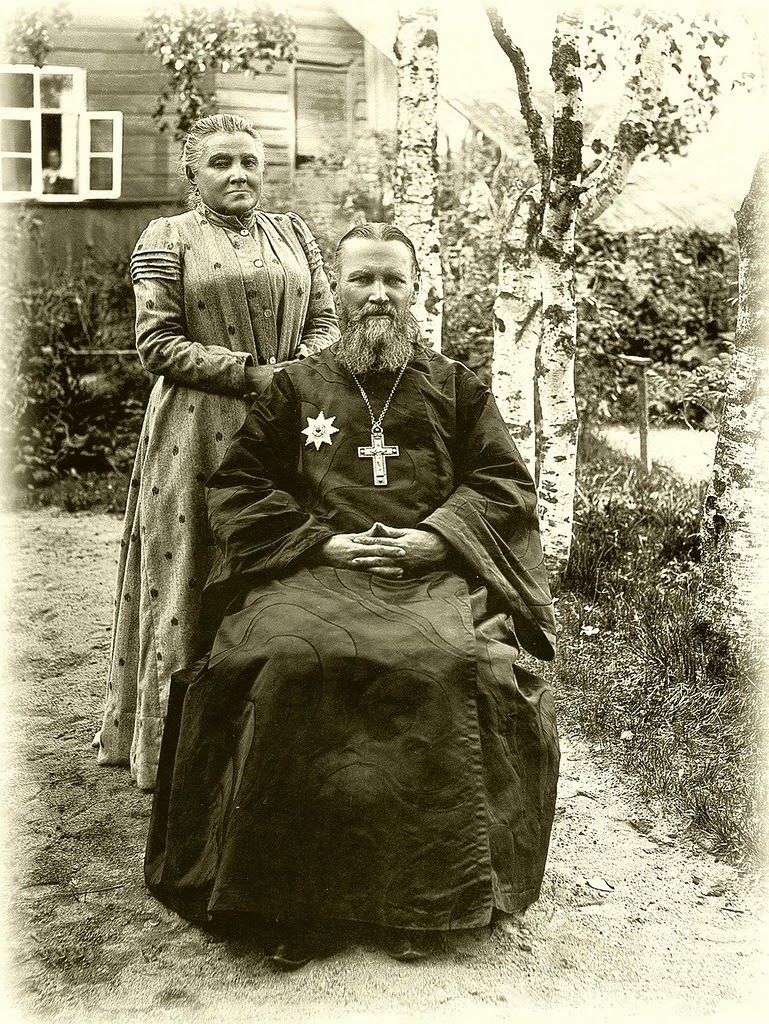
We at the Hermitage, so fulfilled in our lives as vowed religious, are apt to say, "How wonderful that St. John of Kronstadt was granted both religious life and the consolation of the special friendship of marriage, a virginal marriage." In this setting he progressed, by the grace of God, to the state of life we call Saint and Wonderworker. Is this not a special genius of the Orthodox way? Where each family and home is a religious house having icons and incense and tapers? Our faith teaches us not to bring our personal prayers to the temple, but rather to offer them in secret where your Father in Heaven hears them in secret (Mt 6:6). In this sense, every life is a religious life within the scale and scope of the home. Orthodox bishops are not corporate executives (as we see so often in the West) but holy men. Our priests, many married, lead communities of families in theosis, the transformation of mind, body, and soul in Christ. St. John of Kronstadt, married-yet-a-monk (we might say), is our exemplar. Pray for us, St. John and Matuska Elizabeth, for we yearn for holiness, too, keeping the madness of the world far from our families and our homes.
![]()
He was so unlike the other Evangelists — the Jewish tax collector, Levi; the bright young man so attached to St. Peter, Mark; and the sleeping genius, the Beloved Disciple, John. Luke was passionate and creative — the first icon painter, boldly depicting the Most Holy Mother of God. Read his Gospel, and you will find a manner of presentation more like that of Homer than the (Ur) Holy Gospel According to St. Mark. Consider his depiction of Pentecost vs. the Giving of the Holy Spirit related by St. John. Luke painted on the big canvas, depicting nearly "operatic" stage sets and recording something like "arias" proceeding from the mouths St. Elizabeth, St. Simeon, St. Peter, and the Most Holy Theotokos. Is it any wonder that our Gospel Canticles should arise from his holy art? Through St. Luke, the Holy Spirit shone through with entirely new artforms .... which would not become current till fifteen more centuries had passeds. How rich is our conception of the Early Church through His bold and creative spirit! Pray for us, O Beloved Physician, that we too might be bold, for boldness is so desperately wanted today!
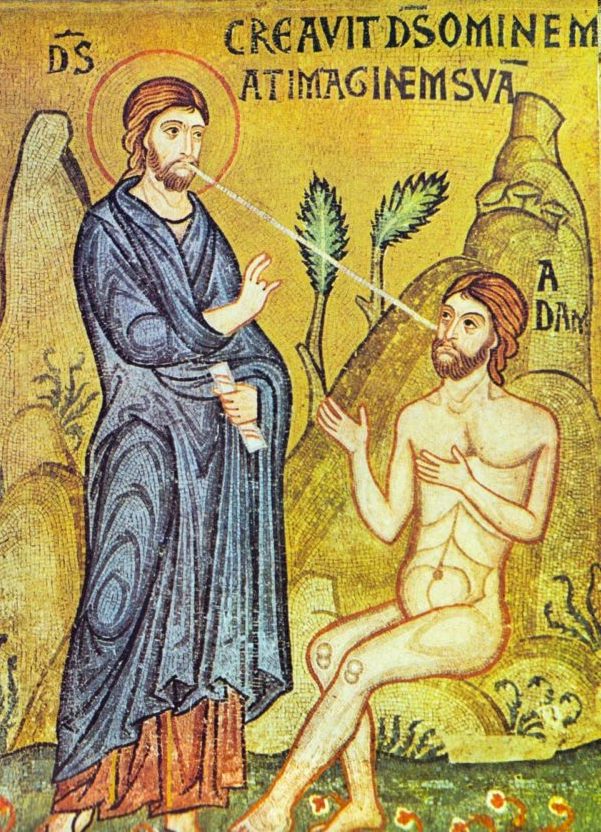
Call it "the Word of God" or "Divine Seed" or "Holy Fire." Well might it be called by many names in many places. For with it God made the heavens and the earth, which continue to shimmer in power and beauty. In today's Gospel lesson, Jesus warns us not to bury these Divine sparks beneath the debris of our lives. The Holy Fire cannot in the end be extinguished, for these sparks are particles of God. Yet, they can be dimmed and grow cold within us as the world strives to replace God with its unwholesome desires and unholy ordinances disfiguring the human person .... unto the entire human lifeworld. But be of good cheer, for no civil power nor technology nor media nor even society can dim the faces of the children of God. They give light unto the whole house. They are cities shining on a hill. They are the salt of the earth.
Please join the Hermitage as we sit back this Sunday and enjoy family pictures: from the Creation of the World, to the Advent of God, and on to this afternoon, where the people of God gather, serviceable and in readiness.
The Lord be with you! .... for He always is.

October 17, 2021 (Holy Calendar), Holy Martyrs and Unmercenaries Cosmos and Damian (3rd c.)
Our Lady of the Angels Community is, of course, dedicated to our Most Holy Patroness, the Mother of God. Beneath her mantle stand other patrons as well. Among these are the Unmercenaries Cosmos and Damian, who were martyred in Cilicia in the year 287. They freely gave of their healing skills to the people of Syrian never accepting payment. For this reason they were called "the silverless."
They are patrons of our Community, for the Registered Nurses here also gave of themselves to the poorest of the poor never accepting payment in return, one of them from the time she was a teenager. In Haiti, she developed a small ministry to become, during the course of a quarter-century, the principal NGO in all Southwest Haiti chiefly providing medical care and public health services. At her retirement from Haiti, it served roughly a quarter-million people a year. We are grateful to venerate our holy patrons through the holy window of an icon, presented by St. Cuthbert's Church, ROCOR (Pawtucket, RI) to welcome us into the Russian Orthodox Church.
Pray for us, Ss. Cosmos and Damian, for we continue to live in a broken world where many become infected and die because so few will follow your example. Inspire us with your selflessness, Holy Martyrs, and help us to see as you did that sanctity and self-sacrifice can never die. Amen.
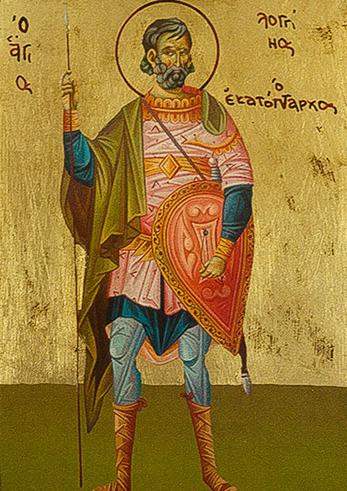
October 16, 2021 (Holy Calendar), Venerable Longinus Who Stood at the Cross (1st c.)
We go about our lives, doing what we must do, living according to the frame set for us. Then, in a moment, a Divine appointment is before us! It appears .... we know not how or why or, really, when. But suddenly it is there, and all the rest of life is seen to be nothing by comparison (or should be so). This decisive moment has happened to many. Certainly, it has happened to me: in a twinkling, everything is changed and forever.
Longinus was a Roman Centurion, a soldier having command over a large detachment of men. He was assigned many times to secure the escort of prisoners. He was present to supervise the execution of many men over a course of many years. He assured good order. He confirmed their deaths. He had their bodies removed from the place of execution and, usually, thrown in a garbage dump (as it were). Then, on a day, enclosed within the small perimeter of his assigned men was One greater and more expansive than all the universe. Nailed to a Cross was the Creator of every material thing they could see or touch. And executed unto death was the Lord of Life. He beheld the awful portents of earth and sky as God's Son was hung on a pole. He trembled and testified, "Truly, this was the Son of God." And he performed the terrible office of piercing the Sacred Body of the Living God Incarnate.
In an astonishing act of love, Longinus was forgiven. He was forgiven for continuing in his old life even as Divine life was opening before Him. And God was able to use his treacherous acts .... even in healing the world by opening to all the baptismal font of life-giving waters and the Precious Blood which nourishes all who seek it with its Divine properties.
Withal, Longinus embraced this new life. He cast off his old life of honor and prestige as a Centurion. Indeed, he cast off life itself in order to be faithful to the Lord Jesus Christ. But which was the real life all along? Was it the gritty world where his armor rusted and his body and soul dimmed down unto muddiness and finally dust? Or was it the light-filled world of the good and the true and the everliving? Which do you choose? And on which day will your Divine appointment come? Be mindful, for it may not come in an earthquake and the shuddering of the firmament. And how quiet must your heart be to hear the annunciation of an angel?

Who can say what makes the physical heart quake from spiritual love? Who can say what brings a woman to ignore the laws of personal survival, laying down her life for her children? In matters that lift us far above the gritty world, where is the line separating the physical from the spiritual? Could a scientist .... or an emperor draw it? Where is the boundary? Let us draw near to Heaven through our Holy Icons. St. Luke did not hesitate to make an icon of the Mother of God. Generations of Christians have witnessed their wonderworking powers, dripping with myrrh as dew upon the windows that look on to Heaven. Bow down. Reverence them. Kiss them with a quaking heart. And never doubt that there is mirth Heaven for such as these.
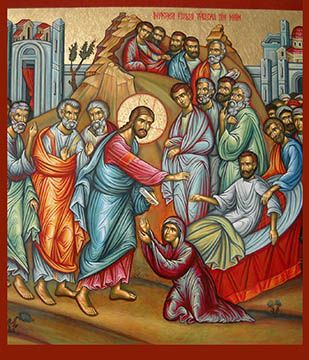
In our Gospel lesson this morning, Jesus steps forward, touches a coffin, and raises the son of a widow from the dead. Understanding that He is the Lord of Life, the Eternal Word of Creation, we are not surprised. Surely, this is within His power. Indeed, the lesson itself contains the exclamation, "A prophet has risen up among us" reminding us that Elijah and Elisha had also raised widows' sons from the dead. How then is it that in our time Jesus' own resurrection from the dead is taken to be the great singularity of the Holy Scripture? That it is the precise point of redemption of fallen humanity? Was He not the Lord of Life before the Cross? Was He not the Lord of Life before all worlds and unto the ages of ages? How is it then that the Cross as a singularity should redeem us? This notion is an invention of medieval Italian theology, which then was taken up by the Protestant Reformers nearly as a cult. In our own time this cult has taken over Christianity in the West. Yet, it is not Christianity, not the classic Christianity bequeathed to us by Jesus and guarded by the Apostles and the Church Fathers. Christianity is devoted to the Divine life, not the death, of Jesus. And that is the point of our Gospel lesson today.
Please join the Hermitage as we marvel at the Divine life of the Beloved, for it is ours to have.

October 10, 2021 (Holy Calendar), Synaxis of Optina Elders (19th-20th c.)
Leo Tolstoy disapproved of staretsdom (eldership). Yet, it was staretsdom which prompted him, along with Dostoyevsky, Turgenev, Gogol, and other luminaries to visit Optina Monastery, which by the nineteenth century had become a foremost spiritual center of the Russian Land. This is important, for staretsdom by that same measure must be seen, not as merely the wisdom of certain monks, but rather as a prominent aspect of Russian Orthodoxy. In Optina, staretsdom had become a destination.
That is, individual illumination, and not simply the corporate reception of sacraments en masse, is seen as the goal of spiritual life. Two of the Russian faith's most venerated saints, St. Seraphim of Sarov and St. Sergius of Radonezh, are hermits who had risen to the heights of spiritual enlightenment. They are startsy.
Optina Monastery is unusual as being an aggregation of startsy, known as the Optina Elders: Leo (d. 1841), Macarius (d. 1860), Moses (d. 1862), Anthony (d. 1865), Hilarion (d. 1873), Ambrose (d. 1891), Anatolius (d. 1894), Isaacius (d. 1894), Joseph (d. 1911), Barsanuphius (d. 1913), Anatolius (d. 1922), Nectarius (d. 1928), Nicon (d. 1931), and Isaacius (d. 1936). This great efflorescence formed a powerful reply to the eighteenth-century efforts of Tsar Peter I to snuff our religious life in Russia. He was keen to bring European empiricism and scientism into what he viewed as "backward" and "medieval" Russia. Yet, as the spiritual power of the Optina Monastery would demonstrate "there are more things in heaven and earth .... than are dreamt of in [his] philosophy." Science is one way of ordering and investigating the material world. But it will not have the final word.
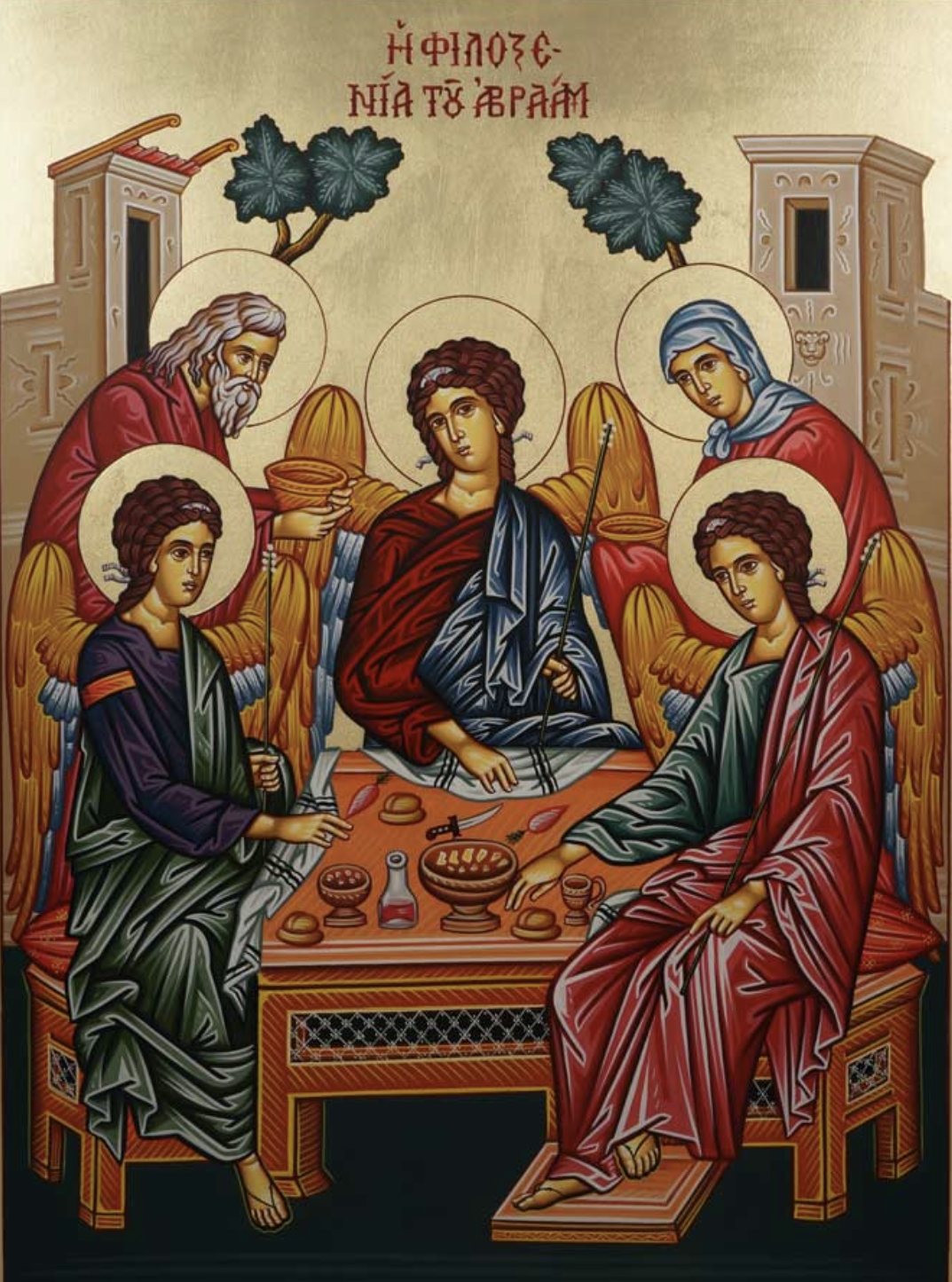
October 9, 2021 (Holy Calendar), Righteous Forefather Abraham (c. 2000 B.C.)
Imagine yourself living what the world deems a successful life. You are raised in an affluent family, attend an Ivy League university, go on to a prestigious medical school, and become established as a most respected physician. Your wife is received into the "best" homes and lives a life of leisure and opulence. Then one day, strange things start happening. For some reason spiritual things begin to flood into your sphere. You meet with a string of people who seem to be messengers from the Divine, telling you things you never heard before. Impossible coincidences occur so commonly that you tell your friends that it feels like Cheshire Cat appearing at any and all times. They ask, "Have you never heard of the 'Hound of Heaven'?"
|
I fled Him, down the nights and down the days;
I fled Him, down the arches of the years; I fled Him, down the labyrinthine ways Of my own mind; and in the mist of tears I hid from Him, .... |
This is how it begins. Then, direct and vivid experiences of the Divine life are there right before you. You are in it.
What do you tell your wife? What do you say to your partners in the medical practice or to the hospital where you are chief of staff? For it turns out, God is not asking for some of your time, say to volunteer in Haiti one week a year. He is calling you. He is calling you away from your former life and everything you know in exchange for .... one wilderness after another and one unknown after another. And your wife? She must take your word for it, for she has not been accorded the same uncanny experiences or Divine visitations.
Today, we honor the Father of our Faith. Perhaps no Holy One — aside, of course, from the Son of God — represents the spiritual life more squarely or powerfully than does Abraham. Here is where life begins. Here is picking up your cross. Here is putting it all in God's hands. Here is what God wants above all for us: that we depend entirely on Him.
Pray for us, Father Abraham, for we long to end our lives in your bosom. And we know that the road ahead will not be an easy one.
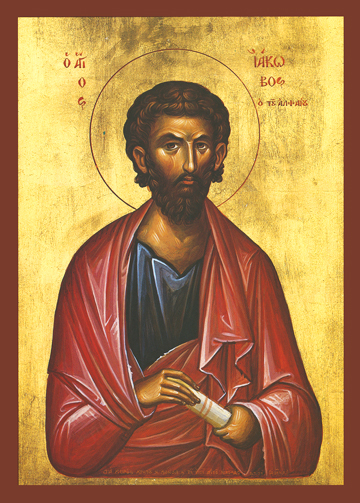
October 9, 2021 (Holy Calendar), Holy Apostle James, Son of Alphaeus (1st c.)
We read that the pre-teen Jesus "astonished" the doctors of the faith with "His understandin and answers" (Lu 2:48). Meantime, His mother Mary and Joseph searched everywhere for Him and, finding Him, say in exasperation, "Look, Your father and I have sought You anxiously."
Jesus replies,
| "Why did you seek Me? Did you not know that I must be about My Father’s business?" But they did not understand the statement which He spoke to them. (Lu 2:49-50) |
His stepbrother James had gladly accompanied his father Joseph and his young charge Mary (roughly the same age as Jesus found in the Temple) in their flight to Egypt. But like his father and stepmother, he did not understand what the whole family regarded as Jesus' strange behavior: "For even His brothers did not believe in Him" (Jn 7:5).
We cannot say with certainty when the family's conversion occurred. Certainly, by the time of St. Paul's missions, beginning perhaps in 40 A.D., the beloved "brother of the Lord," St. James, was Patriarch of Jerusalem.
The James we celebrate today is the son of Alphaeus and the brother of Levi-Matthew. He is called James the Lesser to distinguish him from John's brother, James the son of Zebedee. Thus, half of the Twelve consist of pairs of brothers, including Simon and Andrew. Tradition holds that James the Lesser was crucified in Egypt, where he was proclaiming the Gospel.
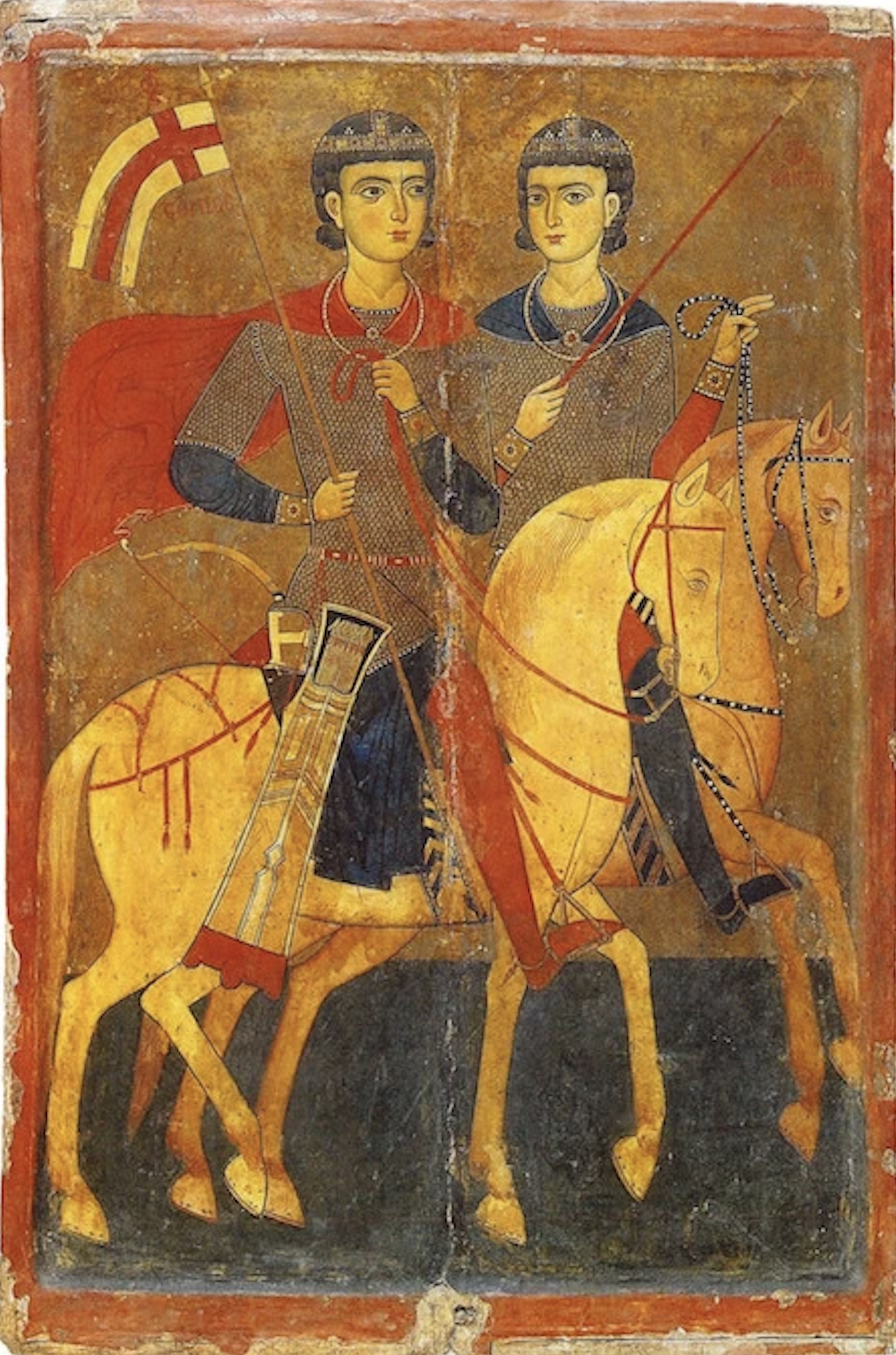
October 7, 2021 (Holy Calendar), Holy Martyrs Sergius and Bacchus (d. c.305-311)
Sergius and Bacchus were highly regarded officers in a unit of the Roman Army attached to the Emperor. They exemplified a friendship esteemed to be the highest form of love by secular Romans: amicitia, the subject of one of Cicero's most widely read works. The early Church honored this chaste form of love, of mutual encouragement, in a rite known as adelphopoiesis ("brother-making"). Christians would understand instantly how honoring siblinghood harmonizes with our adoption as children by Father God and the highly developed sense of spiritual family which Jesus repeatedly emphasizes during His public ministry.
Their Christian commitments were discovered when they were squarely challenged to offer sacrifices in the Temple of Jupiter. Both were arrested and tortured. Bacchus succumbed first and then appeared in a vision to Sergius, urging His brother-in-Christ to remain strong that he not lose his Heavenly crown and be lost to Bacchus forever.
Predictably these heroes of Christian honor and chastity have been seized as proof of "gay marriage" in the early fourth century. No responsible historian supports this thesis, and many professional historians have dismissed it as being absurd. Remember, like a virus, demons have no material body of their own, so they invade good cells to build their satanic factories. There is no satanic religion or liturgy other than turning God's holiness on its head. Look at the universe: God made everything and saw that it was good. The rest he entrusted into our hands. Let us pray to Ss. Sergius and Bacchus that we too might embrace our better angels. Let us be strong in protecting what is good, enduring to the end, come what may!
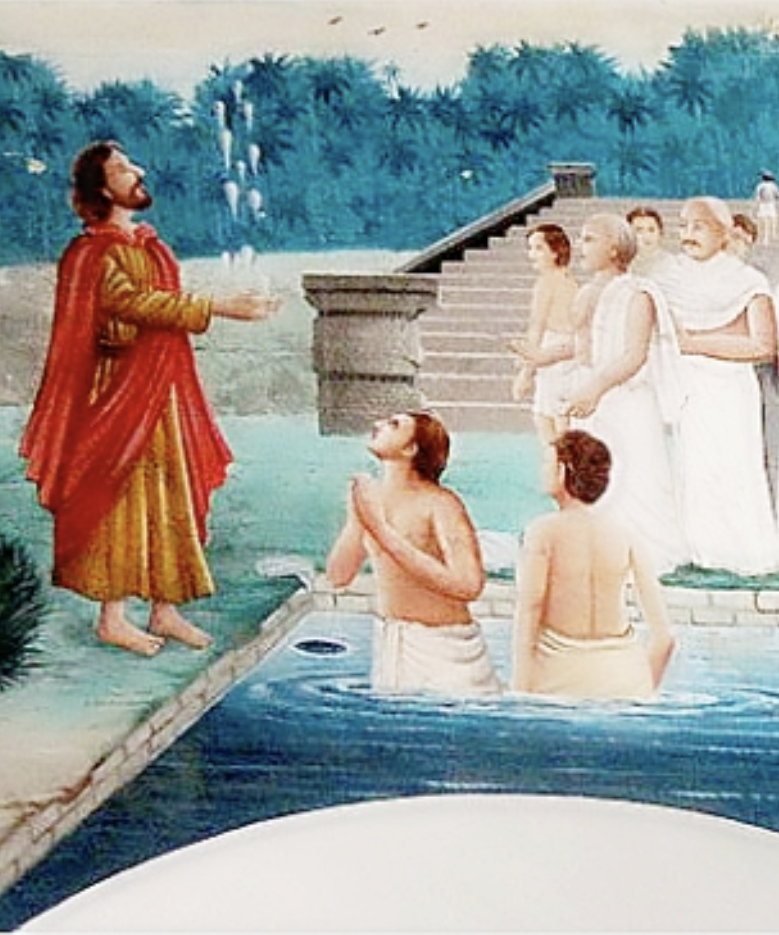
October 6, 2021 (Holy Calendar), Holy Apostle Thomas (1st c.)
He called them — the Twelve, the Seventy, Equals-to-the Apostles St. Mary Magdalen, St. Photini, and who knows how many more? Then for three years, He modeled what they were to say and do. They were to announce the Good News. And what was that? We could do worse than return to St. Paul's great sermon on the Areopagus in Athens (Act 17:16-34):
|
|
They were to bring these glad tiding to the ends of the Earth. St. Paul was said to have traveled 10,000 miles. St. Andrew journeyed to the shores of the Black Sea evangelizing the proto-Russians, who then migrated across southern Europe to Ireland and Scotland (according to recent chromosomal evidence). But none traveled further than the Holy Apostle Thomas. By tradition, St. Thomas was determined to travel to the Far East to baptize the Three Magi, whom he found at the Hill of Vaus in India, baptizing them, and ordaining them bishops. To the present time, St. Thomas is accounted to be founder of the Churches of India — the Syro-Malabar Church, the Latin Rite Church, and the Malankara Orthodox Syrian Church (founded 52 A.D.).

Our Gospel lesson this morning is brief and comes to us in the form of instructions, or, since they proceed from God, let us call them Divine commands:
|
Love your enemies.
Do good to evil people. Lend money to corrupt men. Most important, hope for nothing in return: neither decent affection nor civility nor repayment of loans. |
We bridle at these words as we picture this playing out in practical terms: kowtowing before thugs who exalt in bullying the weak, happily giving our money to swindlers who steal from the elderly and confused, affirming sexual predators who destroy our sons and daughters. Moreover, what are we to make of the practical advice the Master gives to the His Apostles as He sends them out into a world of wolves (He says)? They are told to keep their own counsel, not to salute strangers, and to pronounce a testimony against inhospitable households and cities. What is going on here? Without question, we must go slow through these hairpin turns. And certaintly, we are counseled to reflect.
Please join the Hermitage as we meditate on Christianity's hallmark: "Love Your Enemies."

October 3, 2021 (Holy Calendar), Feast of St. Dionysius the Areopagite (1st c.)
Meeting a man who had met Shelley, the poet Robert Browning wrote,
|
Ah, did you once see Shelley plain,
And did he stop and speak to you? And did you speak to him again? How strange it seems, .... |
Browning was awed to share the same living air with a man who shared the living air and breath of Shelley. We, too, are in awe as we celebrate the Divine Mysteries upon a Altar where rest the bones (however small) of Dionysius the Areopagite. Present to us each day is one who shared the living breath and air of the Most Holy Theotokos. He must have spoken with St. John the Theologian, therefore. He was present in Jerusalem, with all the Apostles, at Her Dormition, meeting and speaking with men who shared the living air with the Son of God.
Dionysius was present on the Areopagus (Mars Hill) and heard the Apostle Paul deliver his great sermon there. He must have met St. Paul, must have seen his burning eyes, must have heard the vibration and tones of the Apostle's words falling on his ears. St. Luke writes of Dionysius in the Acts of the Apostles (17:24).
Of the Most Holy Theotokos, Dionysius said,
| "Her appearance, her features, her whole appearance testify that she is indeed Mother of God." |
St. Dionysius was a boy in Heliopolis in Egypt on that first Good Friday when all the world fell into darkness for three hours. He was amazed to see the sun, even in the ancient "City of the Sun," overpowered by a still greater force. Years later, as a judge in Athens and hearing St. Paul's great sermon, he was convicted of the Apostle's truth, bringing his own earlier experience and awe to full circle. He and his family were among the first in Athens to convert to the Way.
Through the holy relics of St. Dionysius the Areopagite, how near we are to these Holy Ones, Who summon us forward and who protect us in prayer, encouraging us down our own humble road.
Pray for us, St. Dionysius, for we, too, have heard the words of truth and have believed. We, too, experience the holy atmosphere around the Blessed Mother and reverence her as the Mother of God. We, too, have seen the matchless power of God, Who is Sovereign in all the Earth. Pray for us as we give thanks to be gathered into such a company of witnesses as this!
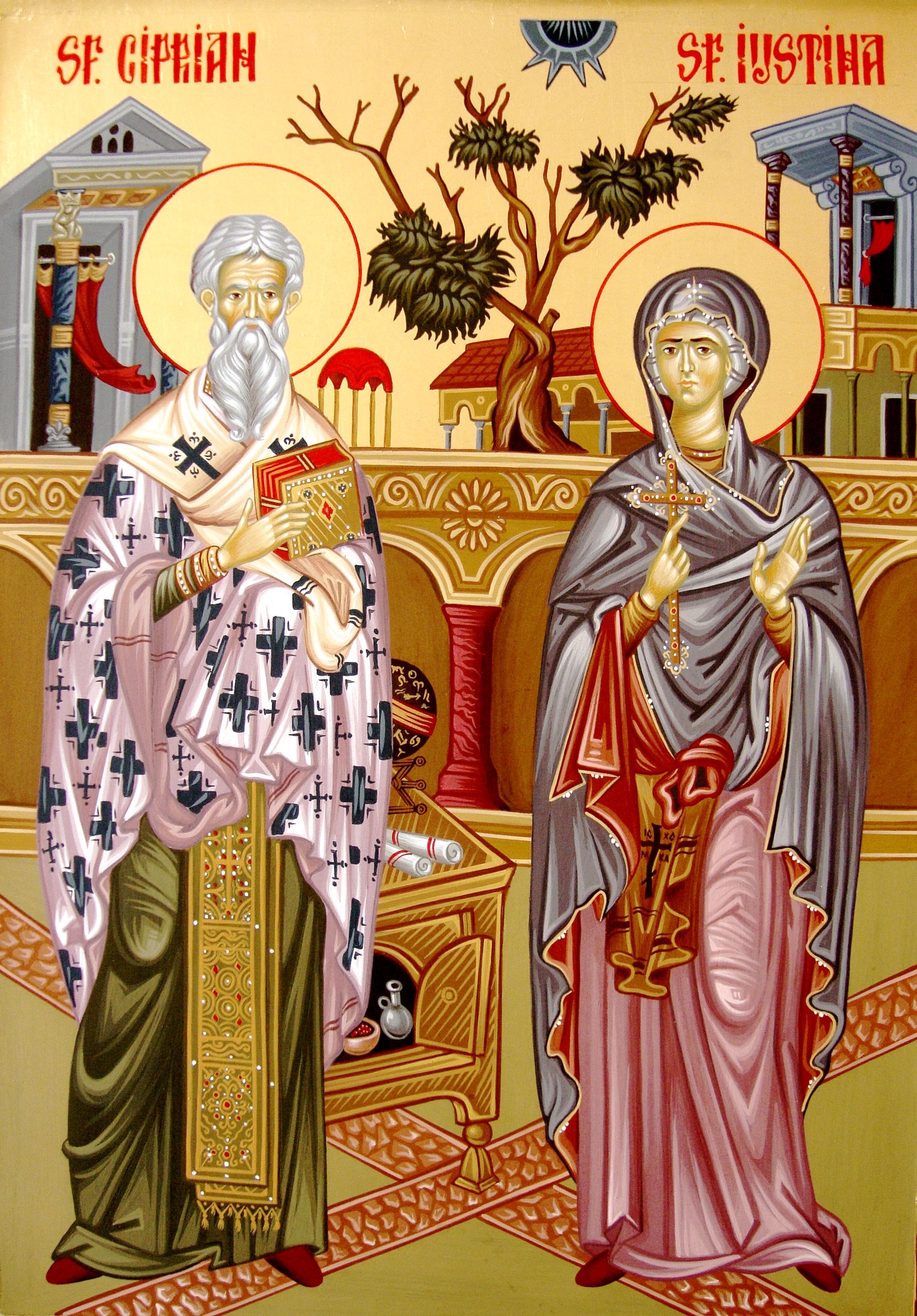
October 2, 2021 (Holy Calendar), Feast of Ss. Cyprian, Justina, Theoktist (d. 304)
From time to time, parishioners have confided that "supernatural" events have been occurring which they feel have signified God's approval, even encouragement, of what they were doing .... including things like adultery. I ask them, "Have you never heard of demonic spirits or dark powers?" St. Cyprian was a highly respected pagan priest of the third century. He studied on Mt. Olympus and Babylon. Many witnessed his spells, curses, and power to summon spirits. He rose (or should we say, descended) to such a level that even Satan conversed with him. In the same city of Antioch, Justina, had given her heart to Jesus and was devout in her prayers and perfect in her conduct of life. She embraced virginity, prompting a suitor to enlist the mighty powers of Cyprian. He set about inflaming her lusts, frightening her with spirits, even causing disease to infect her family. But simply by calling on the Name of Jesus and by standing behind the shield of His Cross, nothing the demonic world could mete out might avail. Cyprian, seeing the shallows of demonic spirituality for what they were, turned all of his life and devotion to Christ. He was elevated to the episcopate while his friend Justina became an abbess over a community of nuns. Later both were arrested during persecutions under the Emperor Diocletian and brought to Nicomedia to be tortured and executed. A soldier, Theoktist, beholding all of this and knowing the authenticity of their stories and lives, saw the shallows of his own life and allegiances and declared himself to be a Christian that he might enter into the Master's wonderful Paradise with them.
Pray for us, O holy martyrs, Cyprian, Justina, and Theoktist, for we too live midst shallows and long for the truth of God's Paradise.
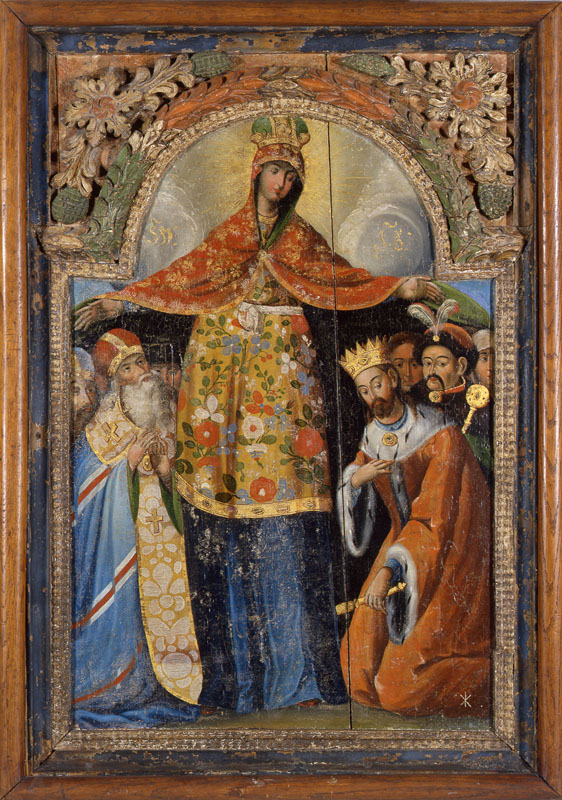
Let us partake in the national holiday today in Ukraine and in parts of Russia. Let us stop what we are doing and honor the One of Whom the Lord said, "Behold, your Mother!" (Jn 19:27). We have much to contemplate here in our joy and blessing, for we are under her veil &mdash depicted as being all-expansive in some Russian icons, likened unto the rays of the sun. In other icons, she covers us in her mantle or cloak. We are under her wing. In this, a great mystery is captured. Is it not so that each of us greatly matters to her, even as an individual daughter or son? And is it also not true that her mantle of protection and care extend to every soul born into the world .... who requite her love and seek her care? To quote a Middle English lyric expressing wonder at her mysterious, all-inclusive nature,
|
"Mother and maiden, was never a one as she,
Well may such a Lady, God's mother be." |
Please join the Hermitage, dedicated to Our Lady, as we rejoice that we too stand beneath her veil and are covered by the loving care of her wing.
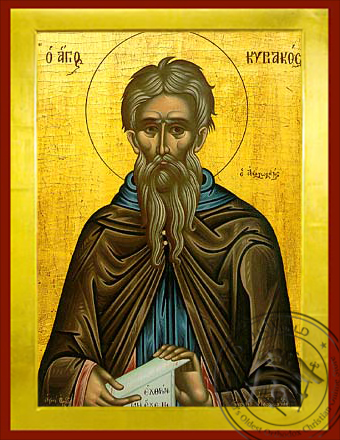
September 29, 2021 (Holy Calendar), Feast of St. Kyriakos, Hermit of Palestine (449-557)
Born in Corinth roughly a century after the death of St. Chariton, Hermit of Palestine, St. Kyriokos, Hermit of Palestine, was a devout teenager when he heard the Gospel preached (perhaps in the same place St. Paul had preached centuries earlier), "Sell what you have. Give to the poor. Take up your cross. Follow Me." Instead of going home, he boarded a ship to Jerusalem, "put his hand to the plow, and never looked back." He followed the way of St. Chariton, presenting himself to a monastery to begin consecrated life. Being granted the high honor of the hermit's vocation, he lived at one point in one of the caves in which his great predecessor had lived. During one period of his silence and contemplation, he uttered not a word for ten years. He grew in power and grace under God's hand and was granted gifts of healing, both physical and spiritual, and was sought out by other vowed religious. His wonderworker life would be mightily used by God until his death at age 109.
St. Kyriakos' life is one for our times, filled with grace, yet surrounded by theological controversy into which the hermit was pulled. We at the Hermitage take instruction and inspiration from his example, giving thanks for our little circle of light, of peace, of godly love, and of unimpeded devotion to God and His holy ways .... in the midst of controversy and rancor. May St. Kyriakos the Hermit of Palestine be an inspiration to all who are distracted from "the one thing that is needful," which is our God and His great love & His Heavenly way of life.
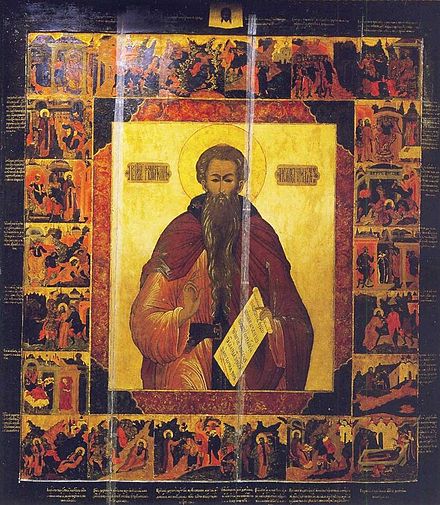
September 28, 2021 (Holy Calendar), Feast of St. Chariton of Palestine
St. Chariton (c. 250) was a desert father in the Judean wilderness, a contemporary of St. Anthony of Egypt, and a father of eremitic religious life. Born in Iconium, he was tortured under the persecutions of the Emperor Aurelian but did not die. He would spend the rest of his life regretting that he had fallen short of the martyr's crown. Later, during a pilgrimage to Jerusalem, he was abducted by highway robbers and taken captive to a cave. There his captors died after drinking wine poisoned by a venomous snake. Taking these events to be a sign, he began his life as hermit in that cave and slowly founded a lavra — a church and monastery made of separate cells. As this was the first monastery of the lavra type, St. Chariton, now abbot, is venerated as the father of monastic life after this kind. His rules for holy life — solitude, silence, daily manual labor, abstention in diet, eating only after sundown, prayers offered through the night alternating with brief naps — became generally established. As his fame spread, Christians sought him out, disturbing his solitude, causing him to move on to found still more lavra-type monasteries. He is credited as first to compose a rite of tonsure for general use.
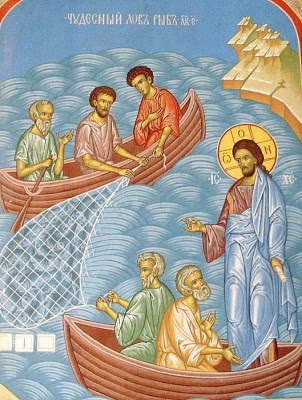
Peter and his companions have toiled all night, but they have caught nothing. Then God appears and says, "Not this side of the boat, but that side."
How much is revealed in these few words! It turns out that the Kingdom of God is here, not some distant there. It turns out that God is with us .... He later affirms, "till the end of the age." And it turns out that this life, so ordinary in appearance, is abundant with Heavenly life. The entire sea seemed empty to those who scoured to the bottom all night, yet more fish than they might ever imagine were directly below them.
I might have said, "ordinary life abundant with the supernatural," but the point of these insights is that the "natural" turns out to be the "supernatural." Heaven is not some place or time we wait for. Heavenly life is here, now with a cloud of witnesses all around us: guiding us, praying for us, protecting us. So, let us get on with life. Let us find our place in this Heavenly company. Which vocation shall we choose? It could be "fisherman" as Peter and John and James had thought, but, then again, it could be something very like "fisherman" yet far beyond the scope of anything they thought possible.
Rejoice and be glad! For God has made all things possible to us. And His Kingdom of Heaven is first among them.
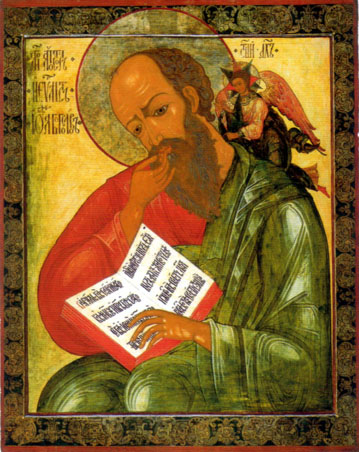
September 26, 2021 (Holy Calendar), Repose of St. John the Theologian
We crown the Lord Jesus with many crowns and St. John, the one He loved, with many names: Beloved Disciple, of the Twelve, the Evangelist, the Apostle, the Divine, the Theologian. Among the four-fold levels of reading Scripture is the tropological level. Within this scope the Twelve are seen as exempla, as types, set before us to edify our own spiritual development (both examples and counter-examples). Two Disciples are first to survey the empty tomb on the Eighth Day. One is the unsteady man of many repentances, who betrays the Lord over and over. He is called Petros, "a stumbling block." The other is crystalline in his purity, sure in his faith, the only Disciple who did not run and, standing at the foot of the Holy Cross on Friday, was entrusted with the care of the Most Holy Theotokos. Here are the opposite poles within the scope of Christian life. The latter leaps lightly to the door of the tomb, for he treads on the earth scarcely not at all. The former lumbers up the path burdened with his many worldly cares. The latter is so imbued with Divine life that he cannot be touched by death though his chalice is poisoned and he is boiled in oil. The former will be crucified early on in his Apostolic journey .... though he sought to elude his Divine appointment ("Quo vadis, Domine?"). The latter will live to extreme old age, carried on a litter from one Christian settlement to another that subsequent generations of Christians might touch the most precious head that lay on Jesus' breast. The former is the man of Earth — of rock, of stone. The latter is the Soaring Eagle rising to Heaven, whom the world's atmosphere cannot claim.
Our Community takes inspiration from the Community of St. John. Ours is named for its Most Holy member, the Mother of God: Community of Our Lady of the Angels at Na Pua Li'i Hermitage. For St. John's Community saw no possibility of accommodating the world's culture, no possibility of give and take with the world, no possibility of any kind save to be a little circle of light in the darkness .... and to be boldly candid about the nature of darkness.
Pray for us, Most Holy Theotokos! Pray for us, Most Beloved Disciple! For we long for the Heavenly light, manifest so brilliantly in both of you.
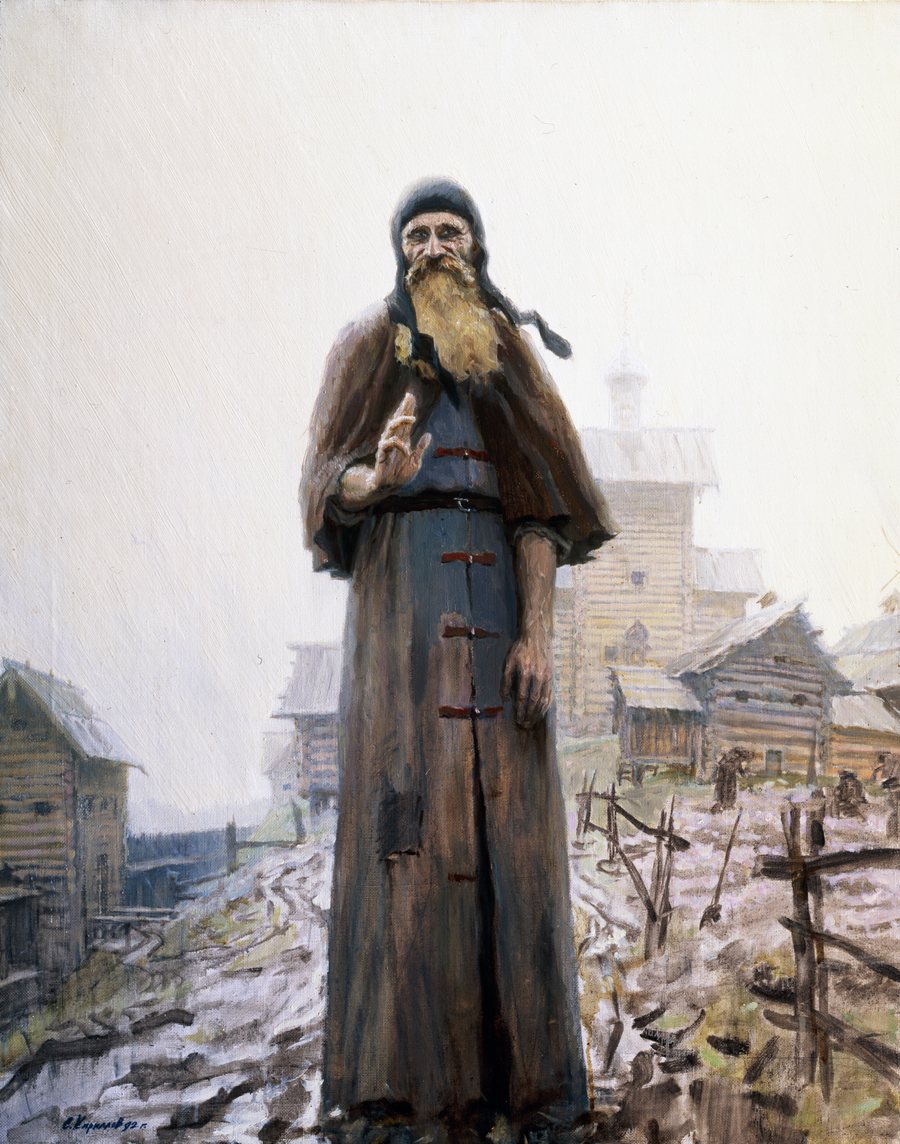
September 25, 2021 (Holy Calendar), St. Sergius of Radonezh
We at the Hermitage, stumbling about in the darkness of the world, have done everything backwards. We did not choose eremitic life, but it chose us. We did not choose Russian Orthodoxy, but it chose us. We did not choose a flinty spirituality of hard physical labor and a prophetic stance toward the world, but we were thrust into it. How could we know that such is the sensibility and character of Holy Rus': flinty holy men, unsparing honesty, a rough way, not a smooth way, and the rigorous practice of Christianity. Small wonder the two most venerated saints of the Russian Orthodox tradition are the hermits St. Seraphim of Sarov and St. Sergius of Radonezh (d. September 25, 1392), whose feast day we celebrate today.
St. Sergius declined worldly honors. He was born into a family of boyars. His title would have been "prince." He later was offered a bishopric. But he declined all of these preferring to live as a simple monk and hermit. He accepted ordination as a priest enabling him to serve others as a sacramental minister. He and his disciples would found about forty monasteries in all including a humble monastic cell and church dedicated to the Holy Trinity, which would in time become the great Trinity-St. Sergius Lavra.
Pray for us, St. Sergius, for your way is open to all of us. Steps into your life are no further than the front door. And impediments to living the eremitic life, intent on holiness, are only ourselves. Let us, remember our Lord Jesus when He said, "You did not choose Me, but I chose you" (Jn 15:16). You can only know His will for your life if you venture out into possibility .... with all its risks. (We are indebted to painter Sergei Kirillov for our holy image, "St. Sergius' Blessing.")
![]()
September 24, 2021 (Holy Calendar), Protomartyr and Equal-to-the-Apostles Thecla
Thecla of Iconium was a spiritual companion to St. Paul, born of a noble family. The earliest record of her life appears in the ancient Acts of St. Paul, treated by the Early Church as Scripture. Following St. Paul's teachings on chastity, she eschewed marriage causing her mother and fiancé to bid the local authorities to punish both Paul and Thecla. She was ordered to be burned at the stake, but a swiftly moving storm extinguished the flames, which could not be reignited. She was ordered to be eaten by wild beasts, but the lionesses formed a protective circle around her. She joined St. Paul in Myra becoming a mighty preacher of God's word and showing women another way ahead — to religious life and not necessarily to the life of wifely servanthood.
Many have reminded me that her message is not popular today, not in a world of widespread sexual life and relatively little marriage. But I ask: Which would you rather have? Brief pleasures, inevitable disease, self-alienation, and separation from God or the fellowship of angels and saints, peace of mind unto the depths of your soul, and the approbation of God?
Pray for us St. Thecla, Equal-to-the-Apostles, for your message is heard in our ears as the way of life and to Life. Amen.

September 22, 2021 (Holy Calendar), Holy Prophet Jonah
Many people today, inured to television and Facebook and much less familiar with the Bible and its depths, read Sacred Scripture as if it were a news story forgetting that "news" was yet to be invented. The Scriptures, at least parts of them, precede Thucydides and the first instance of history, so they are not history. They precede Thales or Socrates and the first instances of philosophy, so they are not philosophy. They precede Homer and the earliest instances of literature, so they are not literature. Modern readers today hold them up to the standards they know in order to assess them. But the Sacred Scriptures transcend all of our standards, and certain parts precede any of our standards. Their only standard is .... themselves. Later Scripture is also incomparable, which has been obvious to readers for thousands of years. Taste, and you will see.
What can truly be said about the Holy Scriptures is that they are holy. In them we encounter the "Types and Symbols of Eternity" (Wordsworth).
The story of Jonah is not a fantasy story. It is an archetype (Jung), going to the deepest parts of our minds and souls: the story of the man who refused the Call. We find this archetype at the heart of another, more recent figure: Simon bar Jonah, Simon, the son of Jonah, called Peter, who was singled out by God but who denied Him three times: in the High Priest's courtyard, in refusing the agape-love of the Risen Christ, and on the outskirts of Rome (Acts of St. Peter). To refuse God is to enter profound darkness, which can never be open to life-giving light until true repentance.
Jonah was chosen by God to preach in Nineveh, capital of the hated and powerful enemy, the Assyrian Empire. He is commanded to travel to the East, but responds by traveling to the uttermost West, to the furthest corner of the world in the Iberian Peninsula. Yet, our God is a dread Sovereign, Who will not be toyed with. Has God called you?
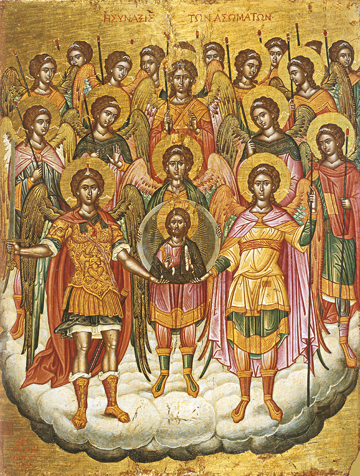
Hearing the Lord speak these words in the Gospels of St. Mark and St. Luke takes our breath away. God has deigned to teach us. The Almighty has stooped down, humbling Himself, to guide us. How could the lowly human hearing His words ever be "ashamed"?!
Yet, is it not the case that we live in an age that is ashamed of the Lord Jesus and His teachings? Do not people shy away even from the sound of His Name? A recent Gallup poll revealed that the majority of registered Republicans, a party that has perennially supported traditional morality, now shies away from traditional marriage: the union of one man to one woman. Do these people fear that they will no longer be invited to cocktail parties? Do they fear being shunned in the locker rooms of country clubs? Do they fear being passed over for important promotions at work? They do not fear God. That much is certain.
Have we forgotten that God is God? I hear a new Jesus, an invented Jesus, being preached .... but this man and his teachings would not be intelligible to the Twelve, to the Gospel Evangelists, or to the Church Fathers. We live in an age that is playing with fire. "Narrow is the way." "Straight is the gate." "Few there will be who find it." "Many are called, but few are chosen." And to those who say they preached in His Name, the Lord Jesus is apt to reply, "I tell you that I never knew you." Each day, I go through life careful not to offend God. He is our Father in Heaven. He the Lord and Giver of Life. He is the Eternal Word of love and of Divine friendship. Why should I offend Him? Why should anyone?
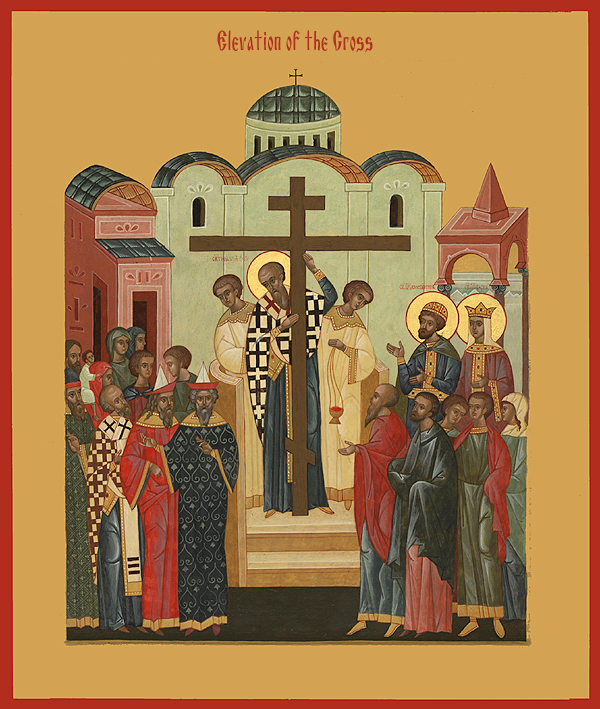
What do we say of the image which was at once the most hated symbol in the Jewish imagination and the Throne of God on Earth? Four years before the birth of Christ and three miles from Nazareth, 2,000 Jews were crucified in a single day with their families butchered at the foot of each of their crosses. Yet, the only time the Son of God formally presided as King was upon a Cross: ".... Pilate wrote a title and put it on the Cross .... JESUS OF NAZARETH, THE KING OF THE JEWS" (Jn 19:19). The people said, "Let the Christ, the King of Israel, descend now from the Cross, that we may see and believe" (Mk 15:32).
What is this most hated and most adored symbol? What is its undoubted power in our own lives? Does it not summon feelings of revulsion and adoration even today? Two thousand years ago, Jesus offered this most hated symbol as a gesture of His love: "Then Jesus, looking at him, loved him, and said to him, 'One thing you lack: .... you will have treasure in Heaven; and come, take up the Cross, and follow Me." (Mk 10:21). It is hated .... and refused. Yet, the Son of God attests its value to be above all price.
What is this deepest mystery? Please join the Hermitage on this high holy day as we adore the Life-giving Cross. Its power is incalculable .... and undeniably dangerous. But "Be not afraid," for He is with us, and these are His own and good words.
![]()
A great banquet has been set, but those who were invited did not come. In St. Luke's retelling of Jesus' parable, he relates what stood out most clearly for him: "the rich He has sent away empty," but "the hungry He will fill with good things" (Lu 1:53). "Blessed are the poor," St. Luke writes, "for theirs is the Kingdom of Heaven" (Lu 6:20). In St. Matthew's retelling of the parable, which He heard directly from Jesus, the details that stood out related to the world Levi-Matthew knew: the world of privilege and of kings, of pridefulness and pettiness, of invitations accepted or declined.
Unlike the Greek physician, Luke, Levi-called-Matthew was of the priestly tribe of Levi. The cultus of Judaism mattered greatly to him. Had he not given up power and position and privilege in Roman society in order to follow an impoverished Jewish teacher from Nazareth? And the details of his telling of the Great Banquet fall out along these royal lines .... descending even from Heaven.
Please join the Hermitage as we prepare ourselves. Let us scrub our faces, and put on our finest garments. For the Marriage of Heaven and Earth is at hand, and we have been summoned before the Great King.
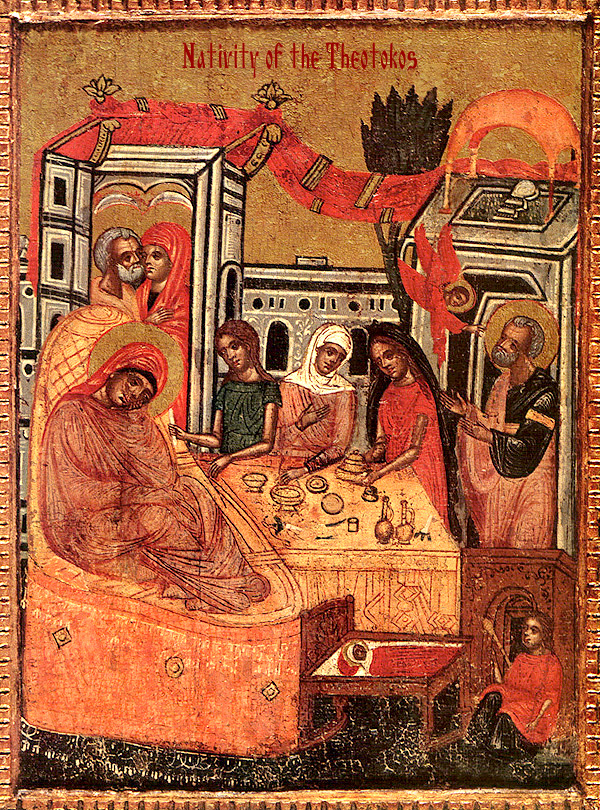
The Ancient Father St. Irenaeus speculated that Adam and Eve were created as all humans are: as infants who grew into children. The fullness of Divine life and knowledge lay ahead, but Eve was impatient to receive it. After her disobedience, and then Adam's, they would not live to see the fullness of time. Only their descendants could. Spiritual maturity, reaching the fullness of unity with God .... all of this was interrupted. The fullness of time, then, is not measured in cosmic light years, but in descendants. This is the Abrahamic promise:
|
Then He brought him outside and said, "Look now toward Heaven, and count the stars
if you are able to number them." And He said to him, "So shall your descendants be." |
In the Twelve Tribes of Israel are figured the future age, the fulfillment of Eden. It would be the collective maturity of the descendants of Abraham, which would pick up where Adam and Eve had stumbled. The rest of the story is too long to tell. But we welcome you to the Hermitage as we ponder these things in our hearts, observing the Nativity of the One Who began the re-opening of Eden.
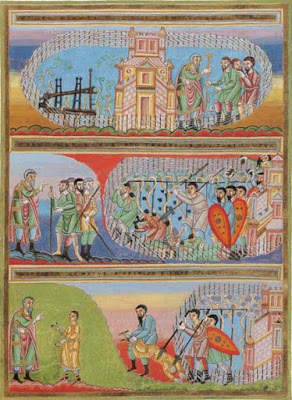
If God were to enter history as one of us and set aside three years to teach us and to form our minds and souls, what would He say? We must view the teachings of Jesus as being facets in the most important of prisms — the essences of humanity, of our nature, of our final destination, and of our relationship with Him.
Our lesson today concerns one of our gravest challenges, which is the state of delusion to which the human mind constantly tends. Call it a "fog" or a "daydream." But do not forget to call it something more: a formidable enemy that threatens to steal from us even life itself.
Please join the Hermitage as we read Jesus parables and lessons as the "types and symbols of Eternity" (Wordsworth). God says so little, and so much depends upon each word.
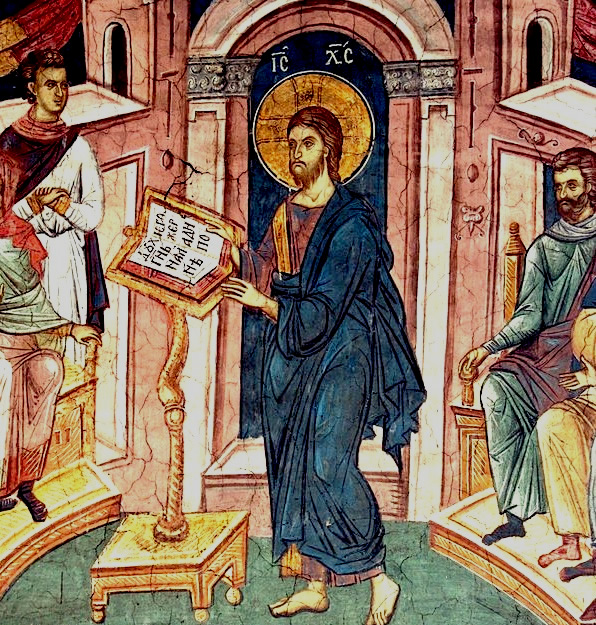
September 1, 2021 (Holy Calendar), Church New Year — The Acceptable Time
God is primary. While His creatures have being, He alone is Being. The entrance into history of God's Son, the First-born of Creation, is primary; the Winter Solstice which marks it is secondary. The entrance of St. John the Baptist into the world is primary; the Summer Solstice which commemorates it is secondary. The Archangel Gabriel's Annunciation to the Most Blessed Virgin Mary is marked by the Spring Equinox, and the Resurrection of Her Son very often occurs at this time. The Nativity of the Most Holy Theotokos is commemorated just before the Autumnal Equinox, a season also reserved for the Exaltation of the Holy Cross.
Do you see? The movements of the kosmos are synchronized to Divine History. The motion of the heavenly bodies are the liturgy that constantly plays out all around us in our seasons on Earth and into astral space. For humankind signifies the high point of God's Creation, and the Holy Ones signify the high point of humankind. Their lives guide us, inspire us, even protect us as we bid their prayers. They are the axis of the world, around which our lives turn.
Early Christians celebrated New Year in early September marking the anniversary of the Creation. Jews continue to celebrate Rosh Hashanah (literally "the Head of the Year") from September 6 through September 8. (We now approach the year 5,783 by that reckoning.) The Nicene Council, however, adopted the Julian Calendar as the Church mainstreamed into Roman society. Two centuries later, calendar years would be dated according to the birth of Christ. Nonetheless, the New Year continued to be celebrated in early September. Thus, the birth of Christ on the Winter Solstice marks the New Creation while the life of His Mother — both her Nativity and Dormition — guides our celebration of it. As the Most Holy Theotokos entered human history on September 8 and fell asleep on August 15, the date of September 1 is celebrated as the first day of the New Year. By Orthodox tradition on this date did Jesus open the Isaiah scroll in a synagogue and announce "the acceptable year of the Lord" (Lu 4:19).
Happy New Year to all Heaven and Earth from the Hermitage!